Young Adult Literature in the Classroom: Reading It, Teaching It, Loving
It
 |
Young Adult Literature in the Classroom: Reading It, Teaching It,
Loving It
Author: Elliot, Joan B. (Editor) Dupuis, Mary M.
(Editor) Dupuis, Mary M. Elliott, Joan B.
ISBN:
0-87207-173-1
LCCN: 2001006204
Dewey:
809/.89283/071 21
Number:
|
Category: English language: reading skills
User Rating:
5.0 Stars
Pages: 256
Paperback International Reading Association
Book Description Like many teachers of grades 6-10, you may be asking "Should
I use young adult literature in my classroom? And how?" This new volume answers
both questions by explaining how YA literature promotes learning across
cultures, genres, disciplines, and grade levels, and by giving practical lessons
and teaching tips. The chapters are divided into three sections-Responding to
Reading, Exploring Genres, and Studying Authors-and cover a wide range of topics
that include book reviews, poetry, picture books, and author studies.
Interspersed throughout the chapters are classroom-tested "Teacher Ideas" from
educators invited by the authors to contribute to this volume. The book
concludes with an appendix that highlights websites related to YA literature.
Not only does this book deliver new ways of teaching and viewing YA literature,
but it also identifies reading materials and teaching strategies that will
retain students as readers as they grow into adolescence. Instead of viewing
reading as "uncool," your students can become active, engaged readers when you
make young adult literature a part of your curriculum. About the Author Joan B.
Elliott is Professor of Literacy at Indiana University of Pennsylvania, Indiana,
Pennsylvania, USA. Mary M. Dupuis is Professor Emerita of Education at Penn
State University, University Park, Pennsylvania, USA.
Writing With Style
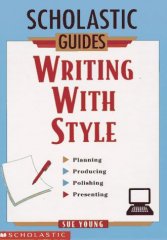 |
Writing With Style
Author: Young, Sue
ISBN: 0-590-50977-2
LCCN:
Dewey:
Number:
|
Category:
Language Arts - Composition & Creative Writing
User Rating:
5.0 Stars
Pages: 144
School & Library Binding Scholastic
From School Library Journal Grade 5-8. Young gets readers started in a most
creative introduction and keeps them focused on the writing process with ideas,
explanations, and a great index that helps them to find the area they want to
polish. She offers example after example of different ways to write and rewrite
sentences, correct use of subject and verb agreement, assignment planning,
bibliographies, writing blank verse, clauses, commas, couplets, rhyming
patterns, research, editing, report writing, grammar, genre style?and just about
any other questions young people may have on the writing process. The book is
easy to comprehend, upbeat, and relevant. A must for library shelves and
classrooms.?Marsha Whitney, South Meadow School, Peterboro, NH Copyright 1997
Reed Business Information, Inc. From Booklist Gr. 4^-6. The latest in the
Scholastic Guides series is a slim but sturdy volume divided into four
easy-to-read chapters concerned with planning, producing, publishing, and
presenting one's work. The text is straightforward, if a bit dry, but the
writing samples, from real kids, make the process seem less daunting. Although
the four-page table of contents is overwhelming, the two-color text allows for
easy and quick reference, and the design is clear and accessible. Young includes
advice on using reference tools, such as a thesaurus, and gives sample
bibliographic citations. Her third chapter demystifies grammar with a "sounds
right/sounds wrong" method, and information about documenting Internet research
is included in the final chapter. Some of the explanations may be too vague for
the intended audience ("Always try to get at the essence of what you have to
say"), but this is still good for quick reference or as supplementary classroom
material. Bibliography. Kathleen Squires
Writing to Standards: Teacher's Resource of Writing Activities for Pre
K-6
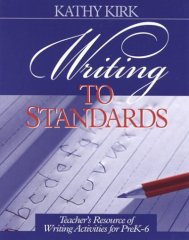 |
Writing to Standards: Teacher's Resource of Writing Activities for
Pre K-6
Author: Kirk, Kathy
ISBN:
0-7619-7639-6
LCCN: 00009024
Dewey: 372.62/3044
21
Number:
|
Category:
Education
User Rating: 5.0 Stars
Pages: 144
Paperback Corwin Press
Review "New, fresh ideas. The writer�s voice helps students with the writing
process." (Regina Alig ) Review "New, fresh ideas. The writer's voice helps
students with the writing process."
Writing Prompts: 250 Knock-Their-Socks-Off Writing Prompts to Inspire Super
Writing All Year Long
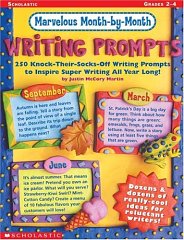 |
Writing Prompts: 250 Knock-Their-Socks-Off Writing Prompts to
Inspire Super Writing All Year Long
Author: Martin, Justin
Mccory
ISBN: 0-439-22250-8
LCCN:
Dewey:
Number:
|
Category:
Elementary
User Rating: 5.0 Stars
Pages: 64
Paperback Teaching Resources
Product Description You'll never hear "There's nothing to write about" again
with this BIG collection of imaginative writing prompts correlated with the
calendar-from Thanksgiving to Elephant Appreciation Day, Abe Lincoln's birthday
to National Umbrella Week. A great way to provide meaningful writing practice
every day of the school year! For use with Grades 2-4.
Writing Lessons For The Overhead: Grades 5 And Up
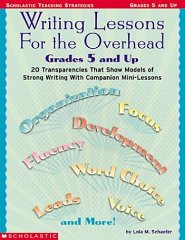 |
Writing Lessons For The Overhead: Grades 5 And Up
Author:
Schaefer, Lola M.
ISBN: 0-439-42063-6
LCCN:
Dewey:
Number:
|
Category: Education
User Rating: 5.0
Stars
Pages: 80
Paperback Scholastic
Product Description Powerful writing lessons at teachers' fingertips! Use the
transparencies to launch discussions of voice, organization, word choice, leads
and more. Students compare models designed to illustrate when a craft element is
used effectively, and when it's not. Discussion questions prompt kids to
recognize the strengths and weaknesses of each piece and help them analyze what
makes the writing work. Significantly improves the quality of student writing.
Write Source 7
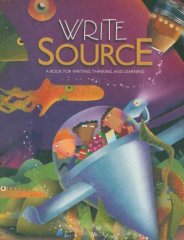 |
Write Source 7
Author: Kemper, Dave Sebranek, Patrick
Meyer, Verne
ISBN: 0-669-50702-4
LCCN:
Dewey:
Number:
|
Category: Juvenile Nonfiction
User Rating: 5.0
Stars
Pages: 766
Paperback Great Source Education Group
Product Description Grade 7, ideal to help seventh graders master the writing
process and learn all the forms of writing to help them succeed in every
classroom and on state writing assessments, the new Write Source offers:
step-by-step guidelines for mastering the writing process and applying to all
subject areas; detailed information on all the key forms complete with student
models; lessons and activities geared towards improving students� writing skills
for state tests; a variety of tips and strategies for improving other classroom
skills including taking tests, completing writing assignments, taking notes, and
building vocabulary.
Write On: A Conference Approach to Writing
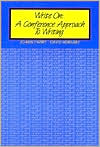 |
Write On: A Conference Approach to Writing
Author:
Hornsby, David Parry, Jo-Ann
ISBN:
0-435-08460-7
LCCN: 87022929
Dewey: 372.6/23
19
Number:
|
Category:
English language: creative writing
User Rating: 5.0
Stars
Pages: 100
Paperback Heinemann
Product Description This companion volume to the author's Read On covers a
number of very practical matters of concern to teachers, and is likely the very
first handbook that provides a step-by-step program for implementing a
conference-based writing program. The experienced writing teacher will find the
book useful, but it should be especially valuable to teachers who want to bring
writing into their classes but would appreciate some straightforward suggestions
on how to proceed. About the Author David Hornsby was with the Ministry of
Education (Victoria, Australia) for many years and taught at every year level.
He lectured in education at the Royal Melbourne Institute of Technology and La
Trobe University. For four years he was a curriculum consultant in primary and
secondary schools and then returned to the primary classroom. He is now working
in teacher education, in educational publishing, and as a curriculum consultant
in schools. David is invited to present at conferences worldwide. He has
completed ten lecture tours of the United States, and has also worked with
teachers in England, Ireland, Indonesia, and Singapore. His latest book, A
Closer Look at Guided Reading (Eleanor Curtain), has just won the award for
being the best book in the Primary Teacher Reference category of the "Australia
Awards for Excellence in Educational Publishing." Jo-Ann Parry is an experienced
teacher who also works in the Northern Metropolitan Region of Victoria as a
language consultant.
Words, Words, Words: Teaching Vocabulary in Grades 4-12
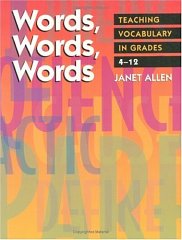 |
Words, Words, Words: Teaching Vocabulary in Grades
4-12
Author: Allen, Janet
ISBN:
1-57110-085-7
LCCN: 98053589
Dewey: 428.1/07
21
Number:
|
Category:
Elementary
User Rating: 5.0 Stars
Pages: 156
Paperback Stenhouse Publishers
Education Book Review, April 1999 ...Words, Words, Words does provide a range
of strategies, solidly backed by research, for offering students of any age a
rich learning experience that will enhance their vocabulary and may even help
them enjoy playing with words and language. Any teacher who is interested in
exploring new ways of teaching new words should read this book. Teaching K-8,
May 1999 Words, Words, Words...Teaching Vocabulary in Grades 4-12 is a terrific
resource to have available in your classroom. Author Janet Allen uses a
conversational tone and puts vocabulary research into perspective when she talks
about our own research as teachers and the research of "noted authorities." Once
Ms. Allen sets the scene for her comments, she goes on to take what we've
learned from research and translates it into practice. There are a lot of nice
tips and strategies in this book, including Professional References and
Literature References. Best of all, it has the "ring of the true practitioner's
voice."
Words Their Way: Word Study for Phonics, Vocabulary, and Spelling
Instruction
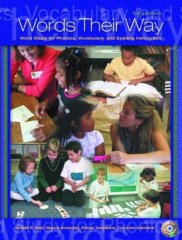 |
Words Their Way: Word Study for Phonics, Vocabulary, and Spelling
Instruction
Author: Bear, Donald R. Invernizzi, Marcia
Templeton, Shane R. Johnston, Francine BEAR, DONALD R
ISBN:
0-13-111338-0
LCCN: 2002040995
Dewey: 372.46/2
21
Number:
|
Category:
Primary / junior schools
User Rating: 5.0 Stars
Pages:
464
Paperback Prentice Hall
Book Description With more than 15 years of extensive observations and
experiences in real classrooms, the authors bring keen insight to this
activity-based book. They advocate basing student learning on the appropriate
developmental level. This philosophy is supported with more than 250
ready-to-use word study, spelling, vocabulary, and phonics activities presented
in developmental sequence, from the Emergent through the Derivational Relation
stage. For educators and school administrators. --This text refers to an out of
print or unavailable edition of this title. The publisher, Prentice-Hall Career
& Technology Written by teachers who are noted authorities in the field of
spelling and word study, this comprehensive text/sourcebook explores word
recognition and spelling skills K-12 -- with a K-8 emphasis. Based on extensive
observations and experiences in real classrooms for more than 15 years, it
combines discussions of theory and practical assessment tools and techniques
with over 250 ready-to-use word study, spelling, vocabulary, and phonics
activities presented in a developmental sequence from Preliterate through the
Derivational Constancy stage. It shows students how to work with picture and
word sorting, how to use word banks at the beginning levels, and how to
incorporate word study into reading and writing. --This text refers to an out of
print or unavailable edition of this title.
Words Their Way: Word Study for Phonics, Vocabulary, and Spelling
Instruction
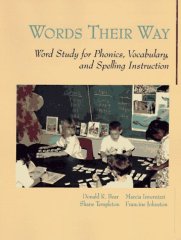 |
Words Their Way: Word Study for Phonics, Vocabulary, and Spelling
Instruction
Author: Bear, Donald R. Invernizzi, Marcia
Templeton, Shane Johnston, Francine
ISBN:
0-02-307490-6
LCCN: 95009580
Dewey: 372.4/14
20
Number:
|
Category:
Literacy
User Rating: 5.0 Stars
Pages: 384
Paperback Merrill Publishing Company
Book Description With more than 15 years of extensive observations and
experiences in real classrooms, the authors bring keen insight to this
activity-based book. They advocate basing student learning on the appropriate
developmental level. This philosophy is supported with more than 250
ready-to-use word study, spelling, vocabulary, and phonics activities presented
in developmental sequence, from the Emergent through the Derivational Relation
stage. For educators and school administrators. --This text refers to an out of
print or unavailable edition of this title. The publisher, Prentice-Hall Career
& Technology Written by teachers who are noted authorities in the field of
spelling and word study, this comprehensive text/sourcebook explores word
recognition and spelling skills K-12 -- with a K-8 emphasis. Based on extensive
observations and experiences in real classrooms for more than 15 years, it
combines discussions of theory and practical assessment tools and techniques
with over 250 ready-to-use word study, spelling, vocabulary, and phonics
activities presented in a developmental sequence from Preliterate through the
Derivational Constancy stage. It shows students how to work with picture and
word sorting, how to use word banks at the beginning levels, and how to
incorporate word study into reading and writing.
Word Savvy: Integrated Vocabulary, Spelling, and Word Study, Grades
3-6
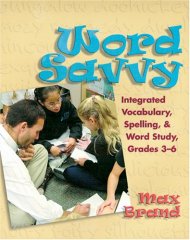 |
Word Savvy: Integrated Vocabulary, Spelling, and Word Study, Grades
3-6
Author: Brand, Max Deford, Diane E. (Foreword)
ISBN: 1-57110-366-X
LCCN: 2003070380
Dewey:
372.61 22
Number:
|
Category: Elementary
User Rating: 5.0
Stars
Pages: 182
Paperback Stenhouse Publishers
From the Publisher Building on the experiences gained in her own language
arts classroom as well as those of colleagues in different disciplines, Cris
Tovani, author of I Read It, but I Don't Get It, takes on the challenge of
helping students apply reading comprehension strategies in my subject. In Do I
Really Have to Teach Reading?, Cris shows how teachers can expand on their
content expertise to provide instruction students need to understand specific
technical and narrative texts. Synopsis Building on the experiences gained in
her own language arts classroom as well as those of colleagues in different
disciplines, Cris Tovani, author of I Read It, but I Don't Get It, takes on the
challenge of helping students apply reading comprehension strategies in my
subject. In Do I Really Have to Teach Reading?, Cris shows how teachers can
expand on their content expertise to provide instruction students need to
understand specific technical and narrative texts.
Word Matters: Teaching Phonics and Spelling in the Reading/Writing
Classroom
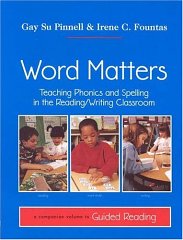 |
Word Matters: Teaching Phonics and Spelling in the Reading/Writing
Classroom
Author: Pinnell, Gay Su Fountas, Irene C.
Giacobbe, Mary E. Fountas, Irene C. Giacobbe, Mary Ellen
ISBN:
0-325-00051-4
LCCN: 98034167
Dewey: 372.46/5
21
Number:
|
Category:
English language: spelling
User Rating: 5.0 Stars
Pages:
424
Paperback Heinemann
Product Description In 1996, Gay Su Pinnell and Irene Fountas presented
Guided Reading, the most comprehensive guided reading resource ever published.
Hailed for its practical, systematic approach, the book showed hundreds of
thousands of teachers how to address the needs of the whole classroom as well as
individual readers. Now, with the publication of Word Matters, Pinnell and
Fountas offer K-3 teachers the same unparalleled support, this time focusing on
phonics and spelling instruction. Word Matters presents essential information on
designing and implementing a high-quality, systematic literacy program to help
children learn about letters, sounds, and words. The central goal is to teach
children to become "word solvers": readers who can take words apart while
reading for meaning, and writers who can construct words while writing to
communicate. Where similar books are narrow in focus, Word Matters presents the
theoretical underpinnings and practical wherewithal of word study in three
contexts: word study that includes systematically planned and applied
experiences focusing on the elements of letters and words writing, including how
children use phoneme-grapheme relationships, word patterns, and principles to
develop spelling ability reading, including teaching children how to solve words
with the use of phonics and visual-analysis skills as they read for meaning.
Each topic is supported with a variety of practical tools: reproducible sheets
for a word study system and for writing workshop; lists of spelling minilessons;
and extensive word lists, including frequently used words, antonyms, synonyms,
and more. Armed with these toolsand the tried-and-true wisdom of Gay Su Pinnell
and Irene Fountasteachers can help students develop not just the "essential
skills," but also a joyful appreciation of their own literacy. About the Author
Gay Su Pinnell is a professor in the School of Teaching and Learning at The Ohio
State University. She has extensive experience in classroom teaching and
field-based research, and in developing comprehensive approaches to literacy
education. She has received the International Reading Association's Albert J.
Harris Award for research and the Charles A. Dana Foundation Award for her
contributions to the field of education. She is also a member of the Reading
Hall of Fame. Together with Irene Fountas she has authored numerous books,
videos, and websites with Heinemann that are considered standards in the field
of literacy instruction and staff development. Their latest innovation is The
Fountas and Pinnell Benchmark Assessment System, a comprehensive assessment
system for grades K - 8. Visit fountasandpinnellbenchmarkassessment.com for
details. Fountas and Pinnell have influenced the classroom practices of teachers
nationwide through bestselling titles such as: The Continuum o Irene C. Fountas,
a professor in the School of Education at Lesley University in Cambridge,
Massachusetts, has been a classroom teacher, language arts specialist, and
consultant in school districts across the nation and abroad. She works
extensively in the literacy education field and directs the Literacy
Collaborative in the School of Education at Lesley University. Together with Gay
Su Pinnell she has authored numerous books, videos, and websites with Heinemann
that are now considered standards in the field of literacy instruction and staff
development. Their latest innovation is The Fountas and Pinnell Benchmark
Assessment System, a comprehensive assessment system for grades K - 8. Visit
http://www.fountasandpinnellbenchmarkassessment.com for details.Fountas and
Pinnell have influenced the classroom practices of teachers nationwide through
bestselling books such as: The Continuum of Literacy Learning, Grades K - 8
(2007) The Continuum of Literacy Learning, Grade
Word Journeys: Assessment-Guided Phonics, Spelling, and Vocabulary
Instruction
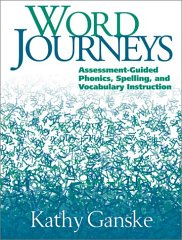 |
Word Journeys: Assessment-Guided Phonics, Spelling, and Vocabulary
Instruction
Author: Ganske, Kathy
ISBN:
1-57230-559-2
LCCN: 00035374
Dewey: 372.63/2
21
Number:
|
Category:
Teaching of a specific subject
User Rating: 4.5 Stars
Pages:
340
Paperback The Guilford Press
Review "Word Journeys brings together phonics and spelling--a blessing for
teachers who are trying to juggle a mismatched collection of lessons and
objectives. The program is grounded in a thorough analysis of English
orthography, and provides the teacher with professional guidance for deciding
what is important and what is not. The assessment techniques are practical
within the time limits of the regular classroom, and should also be helpful to
reading specialists for diagnosis." --Robert Calfee, PhD, Professor and Dean,
School of Education, University of California, Riverside "Implementing a quality
word study program is a major goal for our K-12 English program. Our school
system has used Kathy Ganske's Developmental Spelling Analysis for many years.
Now that the assessment, word lists, and activities are combined in one book, it
will be much easier for teachers to use. Word Journeys is just what we have been
looking for." --Sarah Scott, MA, Director of English Instruction, Rockingham
School District, Harrisonburg, VA
Word Crafting: Teaching Spelling, Grades K-6
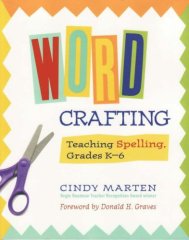 |
Word Crafting: Teaching Spelling, Grades K-6
Author:
Marten, Cindy Graves, Donald H.
ISBN:
0-325-00322-X
LCCN: 2003014327
Dewey: 372.63/2
21
Number:
|
Category:
Literacy
User Rating: 4.5 Stars
Pages: 176
Paperback Heinemann
Review Finally, here is the groundbreaking spelling book all teachers have
been waiting for - a sensible, comprehensive, research-based approach to word
study that includes exploration, strategies, classroom-based assessment, and
fabulous teaching ideas - all based on learning how to determine each students
level of spelling development and craft appropriate instruction. An exceptional
resource!Regie Routman In this delightful and incredibly
informative little volume, Cindy Marten crafts for teachers and administrators
the art of helping students learn how to craft words themselves. Few educators
are able to explain and demonstrate this craft as well as Marten. She provides
moment-to-moment classroom assessment and instructional vignettes grounded in a
developmental model; significantly, she situates this crafting of words in the
realities of school, district, state, and national mandates and politics. Her
description of one districts journey towards a meaningful and effective
curriculum is insightful, encouraging, and instructive. Throughout, Cindy
Martens voice is one with which dedicated and thoughtful teachers will
resonate.Shane Templeton Book Description Finally, here is
the groundbreaking spelling book all teachers have been waiting for - a
sensible, comprehensive, research-based approach to word study that includes
exploration, strategies, classroom-based assessment, and fabulous teaching ideas
- all based on learning how to determine each students level of spelling
development and craft appropriate instruction. An exceptional resource! - Regie
Routman In this delightful and incredibly informative little volume, Cindy
Marten crafts for teachers and administrators the art of helping students learn
how to craft words themselves. Few educators are able to explain and demonstrate
this craft as well as Marten. She provides moment-to-moment classroom assessment
and instructional vignettes grounded in a developmental model; significantly,
she situates this crafting of words in the realities of school, district, state,
and national mandates and politics. Her description of one districts journey
towards a meaningful and effective curriculum is insightful, encouraging, and
instructive. Throughout, Cindy Martens voice is one with which dedicated and
thoughtful teachers will resonate. - Shane Templeton At long last, a spelling
and vocabulary book written by a classroom teacher who's a literacy specialist,
too! Cindy Marten responds to the demand for "direct, systematic, and explicit
phonics and spelling instruction" that goes way beyond what to teach - she
addresses the questions of how, when, and why spelling should be taught. More
important, she situates spelling within the contexts of real writing and the
individual learner's needs. In Word Crafting, Marten offers an approach that is
at once playful, intellectual, and artful, engaging students in inquiry and
wonder about words. "Word crafting" is analogous to the ways fine woodworkers
develop their skills - through collecting the right tools, item by item, until
they have a toolbelt full of them. The same is true for teaching spelling and
here Marten supplies the tools, each one carefully selected for her students.
Dip into her book for tools to: assess and group students for effective
instruction engage them from the start in smart word study help students learn
high-frequency words, rules, patterns, and spelling demons align your teaching
with school, district, state, and national mandates. Use these tools to set up
word-crafting contexts that connect the study of words to authentic reading and
writing. Craft a word study program that turns your students into more than good
spellers - they'll be fine word crafters.
Windows to Language, Literacy, and Culture (Kids
InSight)
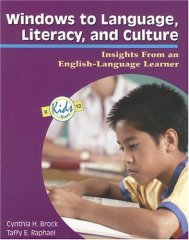 |
Windows to Language, Literacy, and Culture (Kids
InSight)
Author: Brock, Cynthia H. Raphael, Taffy E. Brock,
Cynthia H.
ISBN: 0-87207-580-X
LCCN:
2005016604
Dewey: 428/.0071 22
Number:
|
Category: ELT: teaching
theory & methods
User Rating: 3.0 Stars
Pages: 128
Paperback International Reading Association
Product Description This new addition to the Kids InSight series show
educators, that regardless of statistics, teachers with the necessary knowledge
base and positive dispositions toward diversity can provide meaningful learning
contexts for all their students. The authors give teachers an insider's
perspective on the literacy learning process of one English-language learner to
help them develop a deeper understanding about working with these learners in a
mainstream classroom. Teachers will discover the power of listening to and
learning from their students as the acquisition and its impact on instruction
for the English-language learners. Effective ways to structure classroom
learning contexts and use literature are discussed.
Why Jane and John Couldn't Read--And How They Learned: A New Look at
Striving Readers
 |
Why Jane and John Couldn't Read--And How They Learned: A New Look
at Striving Readers
Author: Fink, Rosalie
ISBN:
0-87207-592-3
LCCN: 2005035295
Dewey: 372.43
22
Number:
|
Category:
English language: reading skills
User Rating: 2.0
Stars
Pages: 192
Paperback International Reading Association
Book Description Here is a model of reading ideal for striving readers,
focused on their personal interests, topic-specific reading, deep background
knowledge, contextual reading strategies, and mentoring support. More important,
the model moves away from a deficit approach to conceptualize striving readers
in a new way. Chapters share success stories of readers who overcome their
struggles and highlight instructional strategies and materials you can use to
develop activities and lessons for children and adults. Use this research-based
model in the classroom or at home to help your striving readers achieve high
levels of literacy.
Whole Language for Second Language Learners
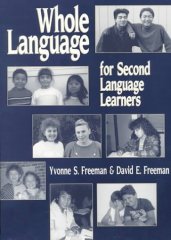 |
Whole Language for Second Language Learners
Author:
Freeman, Yvonne S. Freeman, David E.
ISBN:
0-435-08723-1
LCCN: 92000765
Dewey: 418/.007
20
Number:
|
Category:
Language Experience Approach
User Rating: 4.0 Stars
Pages:
257
Paperback Heinemann
From the Publisher Whole Language for Second Language Learners offers
demonstrative proof that the key to the success of bilingual students lies
within a whole language approach. The purpose of the book is threefold:. 1. To
show why whole language is important for all learners, especially second
language learners. 2. To provide examples of teachers applying whole language
across different grade levels and with students from a variety of linguistic and
cultural backgrounds. 3. To analyze from a whole language perspective
traditional methods of teaching a second language. Each chapter contrasts a
commonsense assumption about teaching second language students with whole
language alternatives. Readers will gain an understanding of how to apply whole
language in classrooms where some or all of the students speak English as
another language. Teachers who are already applying whole language will learn
about ESL and bilingual methods, second language acquisition, and the importance
of the first language and culture of all students. The book contains examples of
teachers who have successfully applied whole language theory to their working
methods with students of all ages and different backgrounds. Most useful is the
inclusion of practical ideas for organizing curriculum on a daily or long-term
basis and sample content area lessons consistent with a whole language approach
and appropriate for all students, especially second language students. Full of
language stories and examples of student work, Whole Language for Second
Language Learners is essential reading for ESL and bilingual teachers and
teacher educators, as well as any teacher looking for whole language
alternatives and ideas to use with ESL students in the classroom. Synopsis Whole
Language for Second Language Learners offers demonstrative proof that the key to
the success of bilingual students lies within a whole language approach. The
purpose of the book is threefold:. 1. To show why whole language is important
for all learners, especially second language learners. 2. To provide examples of
teachers applying whole language across different grade levels and with students
from a variety of linguistic and cultural backgrounds. 3. To analyze from a
whole language perspective traditional methods of teaching a second language.
Each chapter contrasts a commonsense assumption about teaching second language
students with whole language alternatives. Readers will gain an understanding of
how to apply whole language in classrooms where some or all of the students
speak English as another language. Teachers who are already applying whole
language will learn about ESL and bilingual methods, second language
acquisition, and the importance of the first language and culture of all
students. The book contains examples of teachers who have successfully applied
whole language theory to their working methods with students of all ages and
different backgrounds. Most useful is the inclusion of practical ideas for
organizing curriculum on a daily or long-term basis and sample content area
lessons consistent with a whole language approach and appropriate for all
students, especially second language students. Full of language stories and
examples of student work, Whole Language for Second Language Learners is
essential reading for ESL and bilingual teachers and teacher educators, as well
as any teacher looking for whole language alternatives and ideas to use with ESL
students in the classroom.
When Writers Read
|
When Writers Read
Author: Hansen, Jane
ISBN: 0-435-08438-0
LCCN: 86029556
Dewey:
372.4 19
Number:
|
Category: Literacy
User Rating: 5.0
Stars
Pages: 242
Paperback Heinemann
Product Description When writers read, they evaluate all the time. They can't
help it. But they can become better at it, and that's what this second edition
of When Writers Read is about: what students can do to become better evaluators
of themselves as writers and readers, and how you can help.Extensively revised,
the second edition is organized around five concepts that are central to an
effective writing-reading program. Voices: When writers read, they listen for a
strong author voice; they know they can hear their own when they write and
assume other authors' voices come through as well. It's essential that all
voices, both those of students and professional writers, be honored and
supported by an evaluation system dedicated to this notion. Decisions: When
writers read, they make decisions, so it's only natural that they look for
evidence of the decisions other authors make. To become effective writers and
readers, students must learn to make decisions about which types of writing to
create, what to write and read about, where to work, when to do so, whom to
share their work with, and what to do to become better writers and readers.
Time: When writers read, they read and read and read. One of your primary
responsibilities as their teacher is to provide plenty of opportunities for them
to do so and create an overall framework in which students spend their time
wisely. Response: When writers read, they look for a message. Students need to
understand that to respond effectively to other writers, they should listen
closely and think appreciatively and critically about the author.
Self-discipline: When writers read, it's their self-discipline that keeps them
engaged. By providing plenty of good books, writing possibilities, and
self-evaluation opportunities, you can help ensure your students are
self-disciplined and eager. --This text refers to the Paperback edition.
When Adolescents Can't Read: Methods and Materials That
Work
 |
When Adolescents Can't Read: Methods and Materials That
Work
Author: Curtis, Mary E. Longo, Ann Marie (Neb.), Boys
Town Center, Boys Town Reading (Corporate Author)
ISBN:
1-57129-069-9
LCCN: 98021014
Dewey: 428.4/071/2
21
Number:
|
Category:
Remedial Reading (Educational Aspects)
User Rating: 4.0
Stars
Pages: 59
Paperback Brookline Books
Product Description One of society's critical education problems is
adolescent students who can not read their grade level. Developed at the world
famous Boy's Town in Nebraska to help students recover from reading deficits,
the program in this book is used in Boy's Town institutions elsewhere and is
increasingly being introduced into public and private schools.
What's Whole in Whole Language
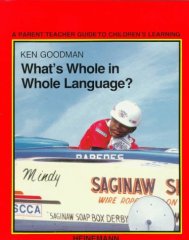 |
What's Whole in Whole Language
Author: Goodman,
Kenneth S. Cole, Kathryn
ISBN: 0-435-08254-X
LCCN:
86151839
Dewey: 372.6 19
Number:
|
Category:
Elementary
User Rating: 5.0 Stars
Pages: 79
Paperback Heinemann
From the Publisher T his book's major purpose is to describe the essence of
the whole language movement-its basis, its features, and its future. It provides
criteria that parents and teachers can use in helping children develop literacy.
Synopsis T his book's major purpose is to describe the essence of the whole
language movement-its basis, its features, and its future. It provides criteria
that parents and teachers can use in helping children develop literacy.
What's a Schwa Sound Anyway?: A Holistic Guide to Phonetics, Phonics, and
Spelling
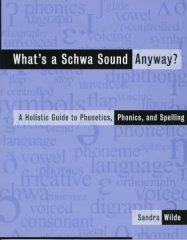 |
What's a Schwa Sound Anyway?: A Holistic Guide to Phonetics,
Phonics, and Spelling
Author: Wilde, Sandra Wilde, S.
ISBN: 0-435-08865-3
LCCN: 97000602
Dewey:
372.6 21
Number:
|
Category: English language: spelling
User Rating: 5.0
Stars
Pages: 176
Paperback Heinemann
Review �Working with the concept of invented spelling, Wilde helps teachers
discover the better ways to help children develop as readers and
writers.��Writing Teacher Product Description Working with
the concept of invented spelling, Wilde helps teachers discover the better ways
to help children develop as readers and writers. - Writing Teacher To many
teachers who began their careers with basal readers, the schwa sound was part of
what led them to whole language in the first place. If they didn't even
understand linguistic terminology themselves, how could they be expected to
teach it to kids? Yet many teachers still wonder about letters and sounds and
phonics. What role does phonics play in learning to read? Does it still have a
place in classrooms where children are becoming literate through rich
experiences with literature and writing? Why have the debates about phonics
continued and in some ways grown more heated? In What's a Schwa Sound Anyway?
Sandra Wilde answers these and many other questions related to phonics and its
relationship to learning to read and spell. She makes a forceful case that
teachers who have a working knowledge about the English sound system are not
only more powerful observers of students' reading and invented spelling, but
also more informed participants in the current debates about the role of phonics
in learning to read. The first part of the book is a lively exploration of the
English sound system and its relation to written language for both reading and
spelling. This mini-course in linguistics is reader friendly and accessible to
even the most linguistics-phobic classroom teacher. Of special interest to those
who work with diverse populations is a chapter-length discussion of language
variation such as Black English and its role in learning to read and spell. The
second part of the book helps readers apply their new knowledge about sounds,
letters, and the relationship between them to the classroom. Chapter 5, "Skills
and the Big Phonics Debate," applies theory, research, and common sense to
debates about the role of phonics in learning to read and spell. The next two
chapters take a close look at a number of writing samples and reading miscues,
illuminating how a knowledgeable teacher can appreciate "error" as a reflection
of children's developing understandings of written language. Sandra Wilde's work
with invented spelling has helped us discover that the better we understand what
children are doing, the more responsive and creative we can be as teachers.
What's a Schwa Sound Anyway? continues this work by helping teachers deepen and
extend their knowledge base about written language and the way children perceive
it, always with the goal of helping children continue to grow and develop as
readers and writers.
What You Know by Heart: How to Develop Curriculum for Your Writing
Workshop
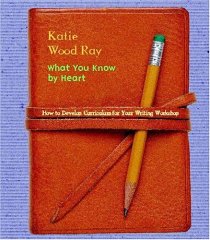 |
What You Know by Heart: How to Develop Curriculum for Your Writing
Workshop
Author: Ray, Katie Wood
ISBN:
0-325-00364-5
LCCN: 2002000790
Dewey: 372.62/3
21
Number:
|
Category:
English language: writing skills
User Rating: 5.0
Stars
Pages: 208
Paperback Heinemann
Review �"In this wise, comforting, intimate book, Katie Ray takes her readers
by the hand and brings us home to ourselves. This is where ideas for teaching
writing come from, she says, brushing aside the distracting clutter, quick
fixes, and one-size-fits-all panaceas. She hands us a pen, a book, and a
reminder of all that matters most."��Lucy Calkins Product
Description "In this wise, comforting, intimate book, Katie Ray takes her
readers by the hand and brings us home to ourselves. This is where ideas for
teaching writing come from, she says, brushing aside the distracting clutter,
quick fixes, and one-size-fits-all panaceas. She hands us a pen, a book, and a
reminder of all that matters most." - Lucy Calkins No one can say it better than
Lucy Calkins-Katie Ray has written a wise, comforting, intimate book. It goes to
the heart of where good ideas for teaching of good writing originate: from
yourself and your own experience. As Katie shows, the most profound and
effective curriculum can result from your own deep understanding of quality
writingwhat you know about writing through your own and others' writings and
through your reading. And the best teaching can result from what you can wrap
your heart and mind around and communicate to your students. It is this very
personal approach and contagious enthusiasm that Katie brings to bear on
creating curriculum for her own writing workshops. Her book shows how you can do
it for your own. In Part One, Katie takes a close look at the lines of thinking
you can use to find curriculum in your own writing experiences. In Part Two, she
shows how to use the same lines of thinking to find curriculum in your everyday
reading life. Along with her own inimitable writing style, Katie sprinkles
special features throughout her book as helpful tips for thinking about your own
writing workshop and curriculum development, including: minilessons and
"curriculum chunks" "Thinking it Through" boxes with questions and things to try
"understandings" and strategies notebook-keeping tips accompanied by Katie's own
handwritten journal entries transcripts of interviews with writers references
for further reading. Follow Katie's example. Write like a teacher of writing.
Read like a teacher of writing. Then teach from your own experience. And watch
as you and your students flourish like never before.
What to Look for in a Classroom: ...and Other Essays
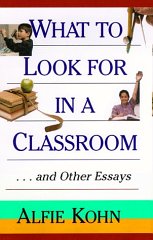 |
What to Look for in a Classroom: ...and Other
Essays
Author: Kohn, Alfie
ISBN:
0-7879-4453-X
LCCN: 98025426
Dewey: 371.1
21
Number:
|
Category:
Teaching skills & techniques
User Rating: 4.5
Stars
Pages: 304
Hardcover Jossey-Bass
Amazon.com Full of ideas and impossible to pigeonhole, Alfie Kohn has become
an essential ingredient in educational debates, and his previous
books--including No Contest: The Case Against Competition and Punished by
Rewards--are a reliable barometer of his wit, pugnacity, and general
contrariness. This is a collection of (mostly) previously published essays, but
Kohn writes so well that these pieces remain fresh, vivid, and challenging. Few
people will agree with him about everything, and many will be left with steam
coming out of their ears. Kohn pulls no punches: the cases for school uniforms
and School Choice programs are beneath his contempt; well-off white liberal
parents are so routinely obsessed with competitive advantage ("the segregation
of the gifted and talented") that their actions amount to a more polite form of
racism; most critics of television are hysterics who don't know the research and
haven't thought hard about what they are saying. A taste of his combat-ready
style: "There is no national organization called Rich Parents Against School
Reform, in part because there doesn't need to be." Kohn is essential reading,
however, on the destructiveness of grading, the foolishness of mainstream ideas
about motivation, and a score of other topics--especially if you disagree with
him. --Richard Farr From Publishers Weekly Renowned educator Kohn delivers an
important, comprehensive collection of essays built around one central message:
respect children and allow them to learn. Within these 19 pieces he discusses a
variety of popular concepts. Character education, he dares announce, is usually
designed "to drill students in specific behaviors rather than to engage them in
deep, critical reflection about certain ways of being." Kohn abhors behavior
modification of any kind, and such accepted tenets as star charts for acceptable
behavior or pizza parties to entice readers are logically deflated in his attack
on the whole range of extrinsic rewards. In his essay "Students Don't
'Work'AThey Learn," he urges us to encourage intrinsic motivation through the
passion for knowledge. "In factory-like schools, you will often hear words like
performance and achievement, rarely words like discovery or exploration or
curiosity." In contrast, Kohn insists, "a learning-oriented classroom is more
likely to be characterized by the thoughtful exploration of complicated issues
than by a curriculum based on memorizing right answers." At the conclusion of
his title essay, which ends the collection, he offers a simple chart about
classroom appearance that could in itself arm parents in America with enough
information to change the course of their child's education. Kohn's message, if
heeded, could inspire a productive revolution in America's fatigued regime of
public education. Copyright 1998 Reed Business Information, Inc.
What Research Has to Say About Reading Instruction
 |
What Research Has to Say About Reading
Instruction
Author: Farstrup, Alan E. (Editor) Samuels, S.
Jay (Editor) Samuels, Jay (Editor) Farstrup, Alan E. Samuels, S.Jay
ISBN: 0-87207-177-4
LCCN: 2002001759
Dewey:
428.4 21
Number:
|
Category: English language: reading skills
User Rating:
4.5 Stars
Pages: 448
Paperback International Reading Association
Product Description The third edition of this respected volume provides
current research along with instructional implications that reflect the rapidly
evolving professional context in which the research is used. Educators will find
information on how to teach students to read based on evidence from a broad base
of effective, well-designed research. Topics have been updated and added to
better reflect current thinking in the field and address issues that have come
to national and international attention for a number of reasons, including the
recently released U.S. National Reading Panel report. The editors maintain a
balance among theory, research, and effective classroom practice without
presenting a formulaic view of good instruction or overly theoretical
discussions in which practical applications of research findings are not
adequately explored. The 17 chapters focus on research related to early reading
instruction, phonemic awareness, comprehension, and many other topics. Each
chapter concludes with "Questions for Discussion" to encourage reflection on the
topics discussed. Teacher educators will find this volume to be a valuable tool
for preservice teacher preparation as well as graduate level courses. The
professional development community, school administrators, and policymakers will
also find it to be an indispensable resource as they seek to implement programs
consistent with rapidly emerging legislative and policy mandates. About the
Author Alan E. Farstrup is Executive Director of the International Reading
Association, Newark, Delaware, USA. S. Jay Samuels is Professor of Educational
Psychology at the University of Minnesota, Minneapolis, Minnesota, USA.
What Really Matters for Struggling Readers: Designing Research-Based
Programs
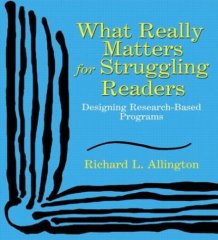 |
What Really Matters for Struggling Readers: Designing
Research-Based Programs
Author: Allington, Richard L.
ALLINGTON, RICHARD L
ISBN: 0-321-06396-1
LCCN:
00042841
Dewey: 372.43 21
Number:
|
Category: English
language: reading skills
User Rating: 4.5 Stars
Pages:
176
Paperback Allyn & Bacon
Product Description What Really Matters for Struggling Readers offers a clear
blend of research and practice that teachers can use to develop better methods
for helping children with reading difficulties. Includes clear, non-technical
summaries of research on the subject of children as proficient readers. Research
section on reading fluency that provides instructional models and methods for
fostering fluency, including pause-prompt-praise, partner reading, taped read
-alongs, impress method, choral reading, and fluency charting. Research section
that studies the effects of enhancing access to appropriate books and offers
suggestions for designing schools where all children have books that are
appropriate. In What Really Matters for Struggling Readers, nationally
recognized scholar Dick Allington offers easy-to-understand interpretations of
research that support three important principles: Children need to read a great
deal to become proficient readers, offering summaries of research on the
subject, the text shows how to monitor the amount of reading and create
interventions that expand reading activity. Children need access to appropriate
books, exploring the research on the subject, the text contains suggestions for
designing schools where books are available and appropriate for all children.
Children need to develop fluent reading to become proficient readers, reviewing
the research on reading fluency, the text provides instructional models and
methods for fostering fluency. Richard L. Allington is the Fien Distinguished
Professor of Education at the University of Florida, Gainesville. He was a
co-recipient of the Albert J. Harris Award from the International Reading
Association for his "contributions to the better understanding of reading and
learning disabilities". Dick is also a past president of the National Reading
Conference and has been elected to membership in the Reading Hall of Fame. From
the Back Cover What Really Matters for Struggling Readers offers a clear blend
of research and practice that teachers can use to develop better methods for
helping children with reading difficulties. * Includes clear, non-technical
summaries of research on the subject of children as proficient readers. *
Research section on reading fluency that provides instructional models and
methods for fostering fluency, including pause-prompt-praise, partner reading,
taped read -alongs, impress method, choral reading, and fluency charting. *
Research section that studies the effects of enhancing access to appropriate
books and offers suggestions for designing schools where all children have books
that are appropriate. In What Really Matters for Struggling Readers, nationally
recognized scholar Dick Allington offers easy-to-understand interpretations of
research that support three important principles: Children need to read a great
deal to become proficient readers, offering summaries of research on the
subject, the text shows how to monitor the amount of reading and create
interventions that expand reading activity. Children need access to appropriate
books, exploring the research on the subject, the text contains suggestions for
designing schools where books are available and appropriate for all children.
Children need to develop fluent reading to become proficient readers, reviewing
the research on reading fluency, the text provides instructional models and
methods for fostering fluency. Richard L. Allington is the Fien Distinguished
Professor of Education at the University of Florida, Gainesville. He was a
co-recipient of the Albert J. Harris Award from the International Reading
Association for his "contributions to the better understanding of reading and
learning disabilities". Dick is also a past president of the National Reading
Conference and has been elected to membership in the Reading Hall of Fame.
What a Character! Character Study as a Guide to Literary Meaning Making in
Grades K-8
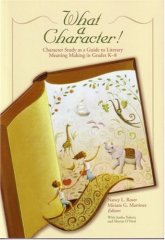 |
What a Character! Character Study as a Guide to Literary Meaning
Making in Grades K-8
Author: Roser, Nancy L. (Editor)
Martinez, Miriam G. (Editor) Yokota, Junko (Editor) O'neal, Sharon
(Editor) Neal, Sharon O'
ISBN: 0-87207-563-X
LCCN:
2005003018
Dewey: 372.64/044 22
Number:
|
Category: English
language: reading skills
User Rating: 5.0 Stars
Pages:
232
Paperback International Reading Association
Product Description Bring text and its meaning alive for your students! This
collection brings together the perspectives of classroom teachers, researchers,
and children's book authors on the power of character study and how to use it to
guide elementary- and middle-grade students through creating, reading, and
comprehending text. The contributors evaluate character-rich books and offer
instructional strategies that will help you become a more insightful teacher as
you implement character study in your classroom.
Weaving Through Words: Using the Arts to Teach Reading Comprehension
Strategies
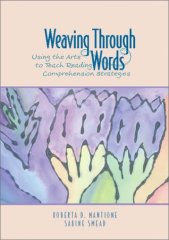 |
Weaving Through Words: Using the Arts to Teach Reading
Comprehension Strategies
Author: Mantione, Roberta D. Smead,
Sabine
ISBN: 0-87207-456-0
LCCN:
2002013255
Dewey: 372.47 21
Number:
|
Category: English
language: reading skills
User Rating: 4.0 Stars
Pages:
216
Paperback International Reading Association
Book Description Ever wondered how to help your learners take an active role
in becoming strategic thinkers and readers? Want to develop meaningful lessons
to aid students in their comprehension of text? Weaving Through Words: Using the
Arts to Teach Reading Comprehension Strategies shows how to accomplish both
these goals. Authors Roberta D. Mantione, a literacy specialist, and Sabine
Smead, a classroom teacher, wanted to help their students become competent
readers. Knowing that strategic thinking and strong comprehension occurs when
students are offered multiple ways of responding to text, the authors developed
an arts-integrated curriculum that would help them teach reading comprehension
strategies. This book is an in-depth look at the effects of using multiple art
forms as a methodology for teaching comprehension to elementary students. Each
chapter not only presents and defines the specific comprehension
strategies-developing sensory images, building and activating schema,
questioning, determining importance, inferring, and synthesis-but also provides
information to help you re-create the lessons in your classroom. Interspersed
throughout this book are student samples that offer insight into the depth of
the lessons and of students' learning. Appendixes offer an arts matrix to help
you implement lessons; directions for art projects and drama techniques,
blackline masters, and suggested resources. Weaving Through Words is a valuable
resource for any elementary teacher who wants to provide students with a variety
of ways to express their thinking and improve their reading comprehension. About
the Author Roberta D. Mantione is a literacy specialist at the Boulder Community
School of Integrated Studies, Boulder, Colorado, USA. Sabine Smead is a
classroom teacher at the Boulder Community School of Integrated Studies,
Boulder, Colorado, USA.
Verbs! Verbs! Verbs!
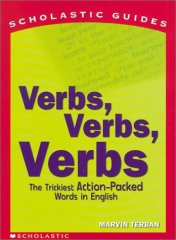 |
Verbs! Verbs! Verbs!
Author: Terban, Marvin Hobbs,
Pamela (Illustrator)
ISBN: 0-439-40164-X
LCCN:
2001057559
Dewey: 428.2 21
Number:
|
Category: Juvenile
Nonfiction
User Rating: 4.5 Stars
Pages: 160
Paperback Scholastic Reference
From School Library Journal Grade 5-8-A great resource for anyone wanting an
overview of what a verb does in a sentence. The book covers the kinds of verbs
and discusses tenses, predicate, and linking versus action verbs. It also lists
100 of the most commonly used irregular verbs with a chart listing the tenses. A
few blue, black, and white decorative cartoons appear throughout. This book
would be helpful for students who need further clarification with their grammar,
and will be a useful companion to any grammar textbook. A copy in reference
might also be worthwhile. Kathleen Swanger, Macomb Intermediate School District,
Clinton Township, MI Copyright 2003 Reed Business Information, Inc. --This text
refers to an out of print or unavailable edition of this title. Product
Description Grammar is challenging for kids, and irregular verbs are especially
difficult to learn. That's where Scholastic Guides comes in. Verbs,Verbs, Verbs
introduces kids to the basics of conjugating and using verbs. Then it shows them
how to conjugate more than 100 of the most commonly-used irregular verbs. Not
only will kids discover the right verb to use, but they will also learn how to
use them. A sample sentence is provided for each tense of each verb. A detailed
table of contents and index guarantee that kids will easily find the word
they're searching for.
Using Nonfiction Trade Books in the Elementary Classroom: From Ants to
Zeppelins
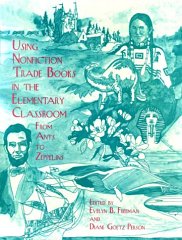 |
Using Nonfiction Trade Books in the Elementary Classroom: From Ants
to Zeppelins
Author: Freeman, Evelyn B. (Editor) English,
National Council of Teachers of (Corporate Author) Person, Diane G.
(Editor)
ISBN: 0-8141-1811-9
LCCN:
92004777
Dewey: 372.13/2 20
Number:
|
Category: Educational
Media In Teaching
User Rating: 5.0 Stars
Pages: 183
Paperback Natl Council of Teachers
"NCTE stock number: 18119-3050"--T.p. verso. Includes bibliographical
references (p. [153]-169) and indexes.
Using Literature to Enhance Writing Instruction: A Guide for K-5
Teachers
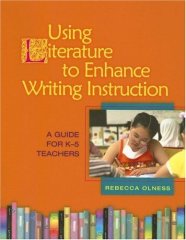 |
Using Literature to Enhance Writing Instruction: A Guide for K-5
Teachers
Author: Olness, Rebecca
ISBN:
0-87207-560-5
LCCN: 2004020272
Dewey: 372.62/3
22
Number:
|
Category:
English language: writing skills
User Rating: 4.5
Stars
Pages: 216
Paperback International Reading Association
Product Description With the strong emphasis on reading proficiency, many
teachers are struggling to include writing instruction in their K–5 literacy
programs. This book shows teachers how to make the most of the reading-writing
connection by using children's literature to improve their students' writing.
Author Rebecca Olness presents six traits that characterize effective writing:
ideas, organization, voice, word choice, sentence fluency, and conventions.
You'll learn how to use these six traits-based on the Six-Trait Analytical
Writing Model originally used to assess writing-to teach writing. The chapters
describe the six traits and present ideas and strategies for helping students
-find good ideas and details, -organize ideas, -express personality through
voice, -choose the right words, -apprehend fluency and rhythm, and -edit for
conventions. The chapters also provide assessments, sample lesson plans, and
annotated bibliographies of children's literature to guide your instruction. As
you teach your students to recognize the six traits in the children's literature
they read, you'll help them infuse the traits into their own writing. Use this
book to immerse your students in reading and writing and, ultimately, help them
become better writers.
Untangling Some Knots in K-8 Writing Instruction
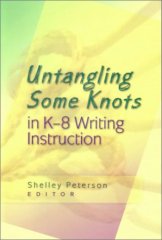 |
Untangling Some Knots in K-8 Writing Instruction
Author:
Peterson, Shelley
ISBN: 0-87207-513-3
LCCN:
2003009925
Dewey: 372.62/3 21
Number:
|
Category: English
language: writing skills
User Rating: 5.0 Stars
Pages:
152
Paperback International Reading Association
Book Description Much of the professional and academic literature on teaching
writing addresses the interplay between process and product and the need to
respect the contributions of individual writers' processes to the creation of
their written products. Although educators have benefited from this literature,
what happens in classrooms often falls short of the successes described in these
resources. Classroom teachers often are left to work through difficult issues
that interfere with students' development as writers. Untangling Some Knots in
K-8 Writing Instruction brings together the perspectives of teachers,
administrators, consultants, and researchers on teaching writing to create a
bridge between theory and practice. The 11 chapters are organized into three
sections that tackle some persistent knots of writing instruction and
assessment: Students' and Teachers' Learning Processes addresses issues that
have been significant to teachers since the first resources on writing
instruction began appearing. The chapters in this section present new twists
concerning the process approach to writing, such as the observation of beginning
writers' conceptions of print, contributions of students' interaction on writing
development, and changes in teaching philosophy. Diversity and Teaching Writing
highlights the knots that occur when teaching ELL and ESL students and when
examining the gender disparity in students' success as writers. Teaching Writing
Using Multimedia and the Arts examines issues that are becoming increasingly
important to teachers in today's classrooms and explores the knots in using
technology, drama, and poetry to teach writing. Untangling Some Knots in K-8
Writing Instruction will guide you through difficult writing issues and help you
teach writing more successfully. About the Author Shelley Peterson is Associate
Professor in the Department of Curriculum, Teaching and Learning at the Ontario
Institute for Studies in Education of the University of Toronto, Canada.
Tiger Lilies, Toadstools, and Thunderbolts: Engaging K-8 Students With
Poetry
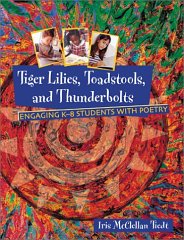 |
Tiger Lilies, Toadstools, and Thunderbolts: Engaging K-8 Students
With Poetry
Author: Tiedt, Iris McClellan Tiedt, Iris
McClellan
ISBN: 0-87207-170-7
LCCN:
2001008045
Dewey: 372.64 21
Number:
|
Category: English
literature: poetry texts & anthologies
User Rating: 5.0
Stars
Pages: 242
Paperback International Reading Association
Book Description How can you teach poetry in a way that will capture
students' imaginations and inspire them to enjoy poetry's rhythms and rhymes?
Iris Tiedt, whose book Teaching With Picture Books in the Middle School is a
favorite among educators for its innovative use of picture books at higher grade
levels, presents an equally fresh approach that will stir young learners'
creative spirits and bring an unusual level of personal engagement to the
classroom experience. Learn how to create a classroom climate that invites
children of all ages to experience poetry and write original verse as part of
their learning experiences. Tiger Lilies is packed with teaching ideas that you
can adapt to different levels of ability and interest, and the activities
described throughout are presented in an appendix as handy, full-page
reproducibles that outline expected outcomes, step-by-step directions, and
assessment possibilities. You'll also find a list of additional resources for
using poetry in the classroom. About the Author Iris McClellan Tiedt is Dean of
Education Emerita from Minnesota State University at Moorhead, Moorhead,
Minnesota, USA
Through Indian Eyes: The Native Experience in Books for
Children
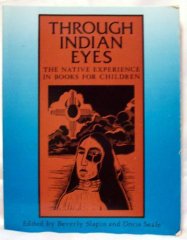 |
Through Indian Eyes: The Native Experience in Books for
Children
Author: Seale, Doris (Editor) Slapin, Beverly
(Editor)
ISBN: 0-86571-213-1
LCCN:
92252464
Dewey: 970.004/97 20
Number:
|
Category: Children's
literature studies: general
User Rating: 5.0 Stars
Pages:
312
Paperback New Society Publishers
From Library Journal The Native American (NA) experience as presented in
children's books is reviewed through essays, poetry, book reviews, guidelines
for evaluating books, a resource list of organizations, a bibliography of books
by and about NAs, American Indian authors for young readers, and illustrations.
The essays may help or hinder Native American concerns. There is hostility: "You
know us (NAs) only as enemies." No location is given for the cited Iroquois
document which states: "Even the form of our government seems to owe a greater
debt to the Constitution of the Six Nations of the Iroquois than to any European
document." One positive suggestion is offered: "Visit with living American
Indian people, try to find out more about their ways of life and their
languages." The book reviews are similar to the essays, and the illustrations
are traditional. The poetry, guidelines, resource list, bibliography, and list
of authors are sensitive and informative, which makes this a recommended
selection for academic libraries. - Lois F. Roets, Drake Univ., Des Moines
Copyright 1992 Reed Business Information, Inc. --This text refers to an out of
print or unavailable edition of this title. Book Description Essays, poetry,
bibliography, and critical reviews of children's books by and about Indian
peoples. A dependable and honest guide for parents and instructors interested in
teaching kids about the diversity of Native America. --This text refers to an
out of print or unavailable edition of this title.
Teaching Word Recognition, Spelling, and Vocabulary: Strategies from the
Reading Teacher
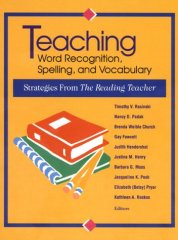 |
Teaching Word Recognition, Spelling, and Vocabulary: Strategies
from the Reading Teacher
Author: Rasinski, Timothy V.
(Editor) Padak, Nancy D. (Editor) Church, Brenda Weible (Editor) Fawcett,
Gay (Editor) Hendershop, Judith (Editor) Henry, Justina M. (Editor)
ISBN: 0-87207-279-7
LCCN: 00058192
Dewey:
372.4 21
Number:
|
Category: English language: reading skills
User Rating:
5.0 Stars
Pages: 108
Paperback Intl Reading Assn
Book Description Whether your focus is spelling, decoding, or word meaning,
word study is a valuable addition to any reading/language arts program. Teaching
Word Recognition, Spelling, and Vocabulary, one of four books in the Teaching
Reading Collection, will enrich your curriculum with classroom-tested ideas and
approaches for helping students learn about words. Included are 17 articles from
The Reading Teacher, that address such topics as word analogy instruction,
decoding, phonemic awareness, read-alouds, flashcards, psycholinguistics,
spelling development, vocabulary development, scaffolding, and context use. The
book also includes IRA position statements on early literacy instruction. Watch
your students reach higher reading levels as they develop a greater knowledge of
words and how to apply them in their own speech and writing. From the Back Cover
Effective reading/language arts programs at any level provide opportunities for
students to explore words--how they work, what they mean, and how they are used.
As students study various aspects of words, they are more likely to develop a
greater appreciation for words, to use word knowledge in their own reading, and
to apply words effectively in their own speech and writing. Whether the focus is
spelling, decoding, or word meaning, word study can be a valuable addition to
any reading/language arts curriculum. Teaching Word Recognition, Spelling, and
Vocabulary: Strategies from The Reading Teacher, one of the four books in the
Teaching Reading Collection, presents the "best of the best" classroom-tested
ideas, approaches, and practical applications for helping students learn about
words. The articles have been drawn from the Teaching Reading department of The
Reading Teacher from 1993-1999; this section of the journal is devoted to
practical reading instruction strategies for classrooms, reading clinics, and
homes. The articles have been compiled by Timothy Rasinski and Nancy Padak,
editors of The Reading Teacher from 1993-1999, and their team of associate
editors. The ideas and strategies offered in Teaching Word Recognition,
Spelling, and Vocabulary provide possible building blocks for developing
word-study routines that are engaging and effective for all students. This book
will challenge classroom teachers to put together the instructional ideas you
find most appropriate into a word-study routine that will work for you and your
students and meet the objectives of your curriculum. This book is part of the
Teaching Reading Collection, a four-book set that also includes the following:
Developing Reading-Writing Connections: Strategies From The Reading Teacher
(ISBN: 0-87207-280-0) Teaching Comprehension and Exploring Multiple Literacies:
Strategies From The Reading Teacher (ISBN: 0-87207-281-9) Motivating
Recreational Reading and Promoting Home-School Connections: Strategies From The
Reading Teacher (0-87207-282-7)
Teaching With Picture Books in the Middle School
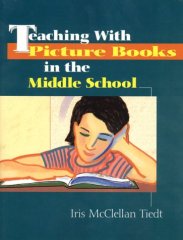 |
Teaching With Picture Books in the Middle School
Author:
Tiedt, Iris McLellan Kunkel, Anthony J.
ISBN:
0-87207-273-8
LCCN: 00058129
Dewey: 373.133/5
21
Number:
|
Category:
English language: reading skills
User Rating: 4.5
Stars
Pages: 240
Paperback Intl Reading Assn
Book Description Discover how picture books, a time-honored tool among
elementary reading teachers, can also be used to engage sixth, seventh, and
eighth graders in meaningful learning activities. Teaching With Picture Books in
the Middle School invites you to take a closer look at these books, many of
which present complex ideas suitable for older students. These books are rich
with diverse subject matter that comes to life through beautiful illustrations,
and offer engaging models for writing, such as fables and pourquoi tales,
autobiographies, and poetry. Older students enjoy sharing picture books with
younger children, and can polish their oral language skills as they practice
reading aloud, dramatizing, or storytelling as ways of engaging beginning
readers. Find out which picture books are appropriate for middle school
students, and experiment with reproducible lesson plans and activities that will
foster reading and writing skills not only in the language arts classroom, but
in other subject areas as well. From the Back Cover In Teaching With Picture
Books in the Middle School, author Iris McClellan Tiedt explores the wonderful
possibilities of the picture book for middle school teachers. Teachers who may
not have considered using these books with students in grades 6-8 will learn how
picture books stimulate thinking, speaking, listening, reading, writing, and
media literacy in the classroom, and provide exciting information about all
kinds of subjects that cross the curriculum. Throughout the book the author
suggests various methods for engaging older students with specific books and
presents many teaching suggestions, including a section of reproducible lesson
plans. Tiedt begins the book by showing readers what picture books have to offer
and suggests ways of overcoming resistance from older students and their parents
toward using these books. The chapters that follow focus on specific aspects of
instruction: Sharing Our Literacy Heritage Promoting Reading Development
Stimulating Thinking, Talking, and Writing Extending Student Knowledge About
Language and Literature Understanding and Appreciating Diversity Crossing the
Curriculum Stimulating Creativity Introducing Thematic Studies Stimulating
instructional strategies are included along with annotated booklists that
suggest picture books to enhance your teaching in various ways. Teaching With
Picture Books in the Middle School will help guide you as you explore the
exciting opportunities for using picture books with adolescent students.
Thousands of picture books now sit on the library shelves just waiting for you
to open their covers!
Teaching with Favorite Newbery Books
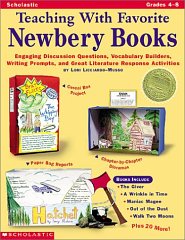 |
Teaching with Favorite Newbery Books
Author:
Licciardo-Musso, Lori Musso, Lori Licciardo
ISBN:
0-590-01975-9
LCCN:
Dewey:
Number:
|
Category: Teaching
Methods & Materials - Language Arts
User Rating: 5.0
Stars
Pages: 88
Paperback Scholastic Professional Books
Book Description Engaging Discussion Questions, Vocabulary Builders, Writing
Prompts, and Great Literature Response Activities These easy, motivating
activities take students "into," "through," and "beyond" 25 of your favorite
Newbery books. Students will love and learn from these classroom-tested prompts,
activities, and vocabulary builders. Books include: Out of the Dust, Shiloh,
Maniac Magee, Walk Two Moons, Hatchet, and 20 others. Includes lots of student
samples. About the Author Lori Licciardo-Musso is a fifth-grade teacher from San
Mateo, California. She is also the author of the Scholastic Professional Book,
25 Terrific Literature Response Activities.
Teaching Struggling Readers: How to Use Brain-based Research to Maximize
Learning
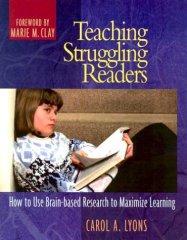 |
Teaching Struggling Readers: How to Use Brain-based Research to
Maximize Learning
Author: Lyons, Carol A.
ISBN:
0-325-00435-8
LCCN: 2002014596
Dewey: 372.43
21
Number:
|
Category:
English language: reading skills
User Rating: 2.5
Stars
Pages: 216
Paperback Heinemann
Product Description Marie Clay, in her foreword, says that this important
book will help raise the profile for what is needed to get all children off to a
good start in education. And a good place to start is with Carol Lyons. Lyons
does a masterful job of introducing teachers to the concepts, categories,
language, and arguments pertaining to the brain's control of what readers do.
She offers a new way of thinking about learning, about how the mind develops,
and about what teachers can do to reach struggling readers. She draws on
examples from interactions with her son and her own teaching, from research, and
from the work of ten expert teachers, who have successfully taught those
children often considered the hardest to teachchildren with learning
disabilities, language delays, or attention deficit (hyperactivity) disorder. In
addition, she supplies numerous transcripts of teacher-student conversations and
end-of-chapter tips to guide teachers to observe their students and plan
instruction more effectively. Lyons' lifework has been the cognitive development
of children. For decades, she has worked side by side with them, observing and
researching what exactly goes on as they read and write. Now she has given us a
book that is both accessible and fascinating, that explores topics too often
overlooked or avoided. She offers a breakthrough explanation of the role emotion
and the brain play in learning to read. Most important, she provides specific
advice, with examples, to illustrate how to enable students to read and write,
whatever their needs or abilities. About the Author Carol Lyons is Professor
Emeritus at The Ohio State University, where she teaches graduate courses in
reading, learning and cognition, and professional development courses for
university and district-level trainers in Reading Recovery and the Literacy
Collaborative. For the past twenty years, she has conducted research and
published numerous articles and book chapters on teacher thinking/learning and
practice, reading, and learning/reading disability. Lyons is coauthor (with Gay
Su Pinnell and Diane DeFord) of Partners in Learning: Teachers and Children in
Reading Recovery and coeditor (with Diane DeFord and Gay Su Pinnell) of Bridges
to Literacy: Learning from Reading Recovery, which is published by Heinemann.
Teaching Struggling Readers: Articles from the Reading
Teacher
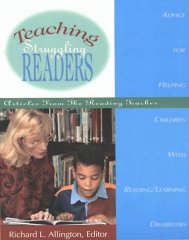 |
Teaching Struggling Readers: Articles from the Reading
Teacher
Author: Allington, Richard L. (Editor)
ISBN: 0-87207-183-9
LCCN: 97036583
Dewey:
372.43 21
Number:
|
Category: English language: reading skills
User Rating:
5.0 Stars
Pages: 320
Paperback International Reading Association
Book Description This compilation addresses instructional issues for teachers
of children with reading/learning disabilities. The book is designed to help the
reader redefine professional beliefs regarding what can be accomplished and to
provide useful, specific examples of programs and practices that foster reading
development in all children, both inside and outside the classroom. From the
Author I have two goals in mind for this collection. The first is to stimulate
thought and conversation about the complexity of helping all children become
eager, enthusiastic, and engaged readers. The second is to provide a small but
useful compendium of best practice information in literacy instruction for
children who have found learning to read and write difficult. If those who read
through this collection are challenged, energized, optimistic, and more skillful
instructionally, then the collection will have achieved my goals.
Teaching Reading Sourcebook: Sourcebook for Kindergarten Through Eight Grade
(Core Literacy Training Series)
 |
Teaching Reading Sourcebook: Sourcebook for Kindergarten Through
Eight Grade (Core Literacy Training Series)
Author: Honig,
Bill Diamond, Linda Gutlohn, Linda Mahler, Jacalyn Mahler, Jacalyn
ISBN: 1-57128-119-3
LCCN: 00266891
Dewey:
372.4 21
Number:
|
Category: Language Arts & Disciplines
User Rating:
5.0 Stars
Pages: 800
Paperback Academic Therapy Pubns
Includes bibliographical references. "Order no. 81193"--P. [4] of cover.
Teaching Reading in Social Studies, Science and Math
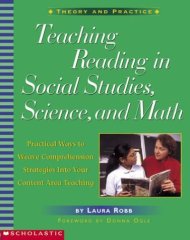 |
Teaching Reading in Social Studies, Science and
Math
Author: Robb, Laura Lynch, Judy Ogle, Donna
ISBN: 0-439-17669-7
LCCN:
Dewey:
Number:
|
Category:
Education
User Rating: 5.0 Stars
Pages: 384
Paperback Teaching Resources
Product Description Includes strategy lessons to use before, during and after
reading. Explains how to support students one-on-one and how to use discussions
to deepen learning, build vocabulary and use literature in the content areas.
About the Author Laura Robb is the author of the best-selling Teaching Reading
in Middle School, Reading Strategies That Work, 35-Must Have Assessments for
Reading and Writing, Easy Mini-Lessons for Teaching Vocabulary, and more. A
practicing teacher and staff developer
Teaching Reading and Writing with Word Walls
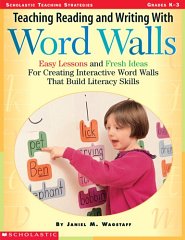 |
Teaching Reading and Writing with Word Walls
Author:
Wagstaff, Janiel
ISBN: 0-590-10390-3
LCCN:
00700419
Dewey:
Number:
|
Category: English
language: specific skills
User Rating: 4.5 Stars
Pages:
128
Paperback Teaching Strategies
Book Description Integrate word walls into your daily literacy activities!
Sample lessons including photos of real classrooms, show you how to add to the
walls each week, drawing words from poems, nursery rhymes, morning message and
more to keep them fresh.
Teaching Poetry: Yes You Can!
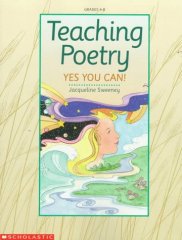 |
Teaching Poetry: Yes You Can!
Author: Sweeney,
Jacqueline Fried, Janice
ISBN: 0-590-49419-8
LCCN:
94230823
Dewey: 372.64044 20
Number:
|
Category:
Elementary
User Rating: 4.5 Stars
Pages: 120
Paperback Scholastic Inc.
Book Description For every teacher who has ever said, "I really want to teach
poetry, but I'm not sure how." Classroom-tested lessons on various poetic forms
as well as simile, strong verbs, adjectives, onomatopoeia, and more. Includes
sample poems. About the Author Jacqueline Sweeney has been a poet in schools for
several years. She has written several books for Scholastic including Prompt a
Day, Incredible Quotations, and the best-seller Teaching Poetry: Yes, You Can!
Jacqueline lives in upsate New York.
Teaching Phonics And Word Study In The Intermediate Grades: A Complete
SourceBook
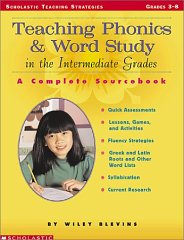 |
Teaching Phonics And Word Study In The Intermediate Grades: A
Complete SourceBook
Author: Blevins, Wiley Lynch, Judy
ISBN: 0-439-16352-8
LCCN:
Dewey:
Number:
|
Category:
Language Arts & Disciplines
User Rating: 5.0
Stars
Pages: 320
Paperback Teaching Resources
Book Description A complete Sourcebook Save Your Struggling Readers! Includes
concise background, readymade lessons for teaching phonics, syllabification, and
root words, extensive word lists, activities, and more. About the Author Wiley
Blevins is an early reading specialist who holds a Master of Education degree
from Harvard University. A former elementary school teacher, Wiley has written
and edited many phonics and reading materials. He is the author of Quick and
Easy Learning Games: Phonics, Phonemic Awareness Activities for Early Reading
Success, and Phonics From A to Z, published by Scholastic Teaching Resources.
Teaching Idea Development: A Standards-Based Critical-Thinking Approach to
Writing
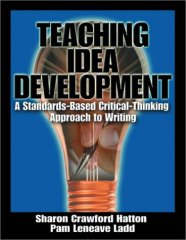 |
Teaching Idea Development: A Standards-Based Critical-Thinking
Approach to Writing
Author: Hatton, Sharon Crawford Ladd,
Pam Leneave
ISBN: 0-7619-7759-7
LCCN:
2001000624
Dewey: 808/.042/071 21
Number:
|
Category: Teaching of a
specific subject
User Rating: 5.0 Stars
Pages: 144
Paperback Corwin Press
Review "The most marvelously practical and engaging approach to come along in
decades. It goes beyond the basics to take up very practical techniques that are
terribly useful but not covered in most textbooks. All of us want our students
to think critically and creatively � this book shows us how to teach them to do
just that. A superb text." (David R. Russell ) "A wealth of practical
instruction activities to use in the classroom that can help students at all
levels learn to flesh out the bare bones of their ideas. The world of effective
writing, meant for authentic audiences and purposes, guides every suggestion
made in this book." (Jan Isenhour ) "An excellent writing resource for teachers
interested in helping students develop critical thinking skills. Loaded with
specific objectives, student models, and classroom lessons, this book provides a
catalog of useful strategies. New teachers, especially, should find this
extremely useful." (Harry Noden ) Review "An excellent writing resource for
teachers interested in helping students develop critical thinking skills. Loaded
with specific objectives, student models, and classroom lessons, this book
provides a catalog of useful strategies. New teachers, especially, should find
this extremely useful."
Teaching Comprehension Strategies All Readers Need: Mini-Lessons That
Introduce, Extend, and Deepen Reading Skills and Promote a Lifelong Love of
Literature
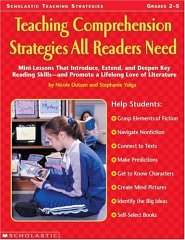 |
Teaching Comprehension Strategies All Readers Need: Mini-Lessons
That Introduce, Extend, and Deepen Reading Skills and Promote a Lifelong
Love of Literature
Author: Outsen, Nicole Stephanie, Yulga
ISBN: 0-439-16514-8
LCCN:
Dewey:
Number:
|
Category:
Education
User Rating: 5.0 Stars
Pages: 128
Paperback Scholastic Teaching Resources
Product Description For students to understand what they read, they need to
be taught strategies good readers use. This book looks at how two gifted
teachers do just that. Nicole Outsen and Stephanie Yulga cover key
strategiesNsuch as making predictions, creating mind pict About the Author
Nicole Outsen is a fifth-grader teacher at the North Hampton School in North
Hampton, NH. Stephanie Yulga is a second-grade teacher at Prospect Sierra School
in El Cerrito, CA. They both write and speak widely on topics such as staff
development, teacher research, and reading instruction. Unlike most books on
teaching reading comprehension, theirs explores each strategy in depth. They
devote a full chapter to each strategy, enabling readers at all stages of
development to be successful.
Teaching Comprehension and Exploring Multiple Literacies: Strategies from
the Reading Teacher
 |
Teaching Comprehension and Exploring Multiple Literacies:
Strategies from the Reading Teacher
Author: Rasinski,
Timothy V. (Editor) Padak, Nancy D. (Editor) Church, Brenda Weible
(Editor) Fawcett, Gay (Editor) Hendershop, Judith (Editor) Henry, Justina
M. (Editor)
ISBN: 0-87207-281-9
LCCN:
00058101
Dewey: 372.41/6 21
Number:
|
Category: English
language: reading skills
User Rating: 5.0 Stars
Pages:
128
Paperback Intl Reading Assn
Book Description Whatever grade level, content, or texts you teach, your
ultimate goal is to develop your students' understanding of what they read. The
29 articles in this anthology offer you a wealth of ideas to help your students
comprehend different types of texts and literacies, from technology literacy to
visual, theatre, and music literacy. You'll find instructional strategies and
activities on a wide range of topics, including narrative and expository texts,
the K-W-L strategy, anticipation guides, graphic organizers, wordless picture
books, shared books, the Internet as a teaching resource, and integrating music,
reading, and writing at the primary level. From the Back Cover Make no mistake,
comprehension is what reading is all about! Reading is comprehension. No matter
what grade level you teach, no matter what content you teach, no matter what
texts you teach with, students' comprehension and understanding are what you
want to achieve. However, comprehension is a complex process. Each individual
comprehends differently because each comes to the reading task with different
experiences and abilities. Teaching Comprehension and Exploring Multiple
Literacies: Strategies from The Reading Teacher will add to your cache of
comprehension instruction strategies by presenting the "best of the best"
classroom-tested ideas, approaches, and practical applications for helping
students learn about words. The articles have been drawn from the Teaching
Reading department of The Reading Teacher from 1993-1999; this section of the
journal is devoted to practical reading instruction strategies for classrooms,
reading clinics, and homes. The articles have been compiled by Timothy Rasinski
and Nancy Padak, editors of The Reading Teacher from 1993-1999, and their team
of associate editors. The ideas and strategies offered in Teaching Comprehension
and Exploring Multiple Literacies provide building blocks for developing
comprehension activities that are engaging and effective for all students. This
book will challenge classroom teachers to put together the instructional ideas
you find most appropriate into a comprehension routine that will work for you
and your students and meet the objectives of your curriculum. This book is part
of the Teaching Reading Collection, a four-book set that also includes: Teaching
Word Recognition, Spelling, and Vocabulary: Strategies From The Reading Teacher
(ISBN: 0-87207-279-7) Developing Reading-Writing Connections: Strategies From
The Reading Teacher (ISBN: 0-87207-280-0) Motivating Recreational Reading and
Promoting Home-School Connections: Strategies From The Reading Teacher
(0-87207-282-7)
Teaching and Learning Multiliteracies: Changing Times, Changing
Literacies
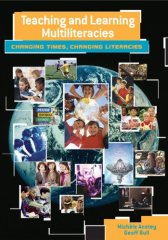 |
Teaching and Learning Multiliteracies: Changing Times, Changing
Literacies
Author: Anstey, Michele Bull, Geoff Bull, Geoff
ISBN: 0-87207-586-9
LCCN:
Dewey:
Number:
|
Category:
English language
User Rating: 4.5 Stars
Pages: 160
Paperback International Reading Association
Book Description This timely resource explains the concept of multiliteracies
and provides you with the knowledge, resources, attitudes, and strategies your
elementary and middle school students need to succeed in a changing world.
Authors Michèle Anstey and Geoff Bull present a range of new and established
ideas about literacy, emphasizing successful practices. Chapters cover how
teachers can Rely less on print texts Respond to new trends in children's
literature Balance guided reading, outcomes-based curricula, and schoolwide
approaches to planning New concepts are accompanied by reflection strategies to
help you think about your understandings of literacy, multiliteracies, and
texts. Plus, all chapters include "Theory Into Practice: Classroom Application"
sections that demonstrate how you can incorporate multiliteracies every day in
your teaching. Copublished with the Australian Literacy Educators' Association
Teaching and Learning in a Diverse World: Multicultural Education for Young
Children
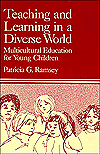 |
Teaching and Learning in a Diverse World: Multicultural Education
for Young Children
Author: Ramsey, Patricia
ISBN:
0-8077-2828-4
LCCN: 86014560
Dewey: 370.19/6
19
Number:
|
Category:
Cultural studies
User Rating: 4.0 Stars
Pages: 224
Paperback Teachers College Pr
From the Publisher Now in its Third Edition, this classic text continues to
define what multicultural education means in all kinds of settings. As in
previous editions, Patty Ramsey guides teachers in helping our children make
sense of their complex world by becoming curious, critical, and compassionate
learners. Synopsis Now in its Third Edition, this classic text continues to
define what multicultural education means in all kinds of settings. As in
previous editions, Patty Ramsey guides teachers in helping our children make
sense of their complex world by becoming curious, critical, and compassionate
learners.
Teachin' Cheap: Using Bags, Sacks, Paper, & Boxes in the
Classroom
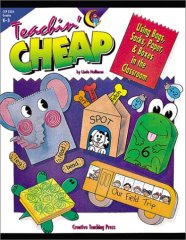 |
Teachin' Cheap: Using Bags, Sacks, Paper, & Boxes in the
Classroom
Author: Holliman, Linda Bruno, Jane Rae, Terri
Sopp
ISBN: 1-57471-276-4
LCCN:
98125049
Dewey:
Number:
|
Category:
Education
User Rating: 4.5 Stars
Pages: 112
Paperback Creative Teaching Press
"Grades K-3"--Cover. "CTP 2335"--Cover.
The Teachers' Guide to the Four Blocks: A Multimethod, Multilevel Framework
for Grades 1-3
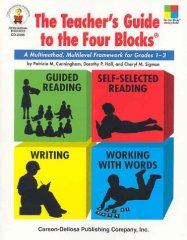 |
The Teachers' Guide to the Four Blocks: A Multimethod, Multilevel
Framework for Grades 1-3
Author: Cunningham, Patrica M.
Hall, Dorothy P. Sigmon, Cheryl M. Sigmon, Cheryl M. Sigmon, Cheryl
ISBN: 0-88724-494-7
LCCN:
Dewey:
Number:
|
Category:
Education
User Rating: 5.0 Stars
Pages: 208
Paperback Carson-Dellosa Publishing Company
Book Description This exciting resource explains how teachers can help all
children become better readers and writers. It provides a summary of each of the
Four Blocks, steps for implementation in the classroom, and a variety of student
activities.
Teachers in Action: The K-5 Chapters from Reading and Writing in Elementary
Schools
 |
Teachers in Action: The K-5 Chapters from Reading and Writing in
Elementary Schools
Author: Cunningham, Patricia M. Moore,
Sharon Arthur Cunningham, James W. Moore, David W.
ISBN:
0-8013-3424-1
LCCN: 99022406
Dewey: 372.6/044
21
Number:
|
Category:
Educational systems
User Rating: 5.0 Stars
Pages:
231
Paperback Allyn & Bacon
Elizabeth Marshall - Children's Literature Rather than rely on the more
familiar "how-to" format of many educational texts, the authors of this
reference book convey their information through imaginary narratives. The
authors invent an imaginary class of children and six fictional teachers who
work together at Merritt Elementary. Instructional practices are woven into the
journal entries of each teacher. While the activities offered within the book
are helpful, the journal entry format is contrived and ultimately distracts the
reader from the material the authors offer. These chapters also appear in
Reading and Writing in Elementary Classrooms by the same authors. 2000, Longman,
Systems for Change in Literacy Education: A Guide to Professional
Development
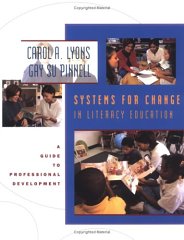 |
Systems for Change in Literacy Education: A Guide to Professional
Development
Author: Lyons, Carol A. Pinnell, Gay Su
ISBN: 0-325-00282-7
LCCN: 00053616
Dewey:
372.6 21
Number:
|
Category: Literary theory
User Rating: Pages:
272
Paperback Heinemann
Product Description Twice before, Carol Lyons and Gay Su Pinnell teamed up as
coauthors and helped tens of thousands of literacy educators transform classroom
practice. Now, with their latest collaboration, Lyons and Pinnell turn their eye
to K-6 literacy teachers' professional development, offering the theories,
designs, guidelines, examples, and materials needed to bring about schoolwide,
long-lasting change. Lyons and Pinnell asked themselves: "What if we could
create more and better ways for teachers to learn from their own teaching? What
if we could provide high-quality, ongoing professional development and coaching
for literacy teachers that result in improving their students' achievement?"
Well, they could . . . and they did. Systems for Change offers specific - and,
quite often, unique - suggestions for planning and implementing a literacy
professional development course. Everything is covered, including how to get
started the right way, what materials are needed and where to find them, what
are the best activities for effective, hands-on practice, and how to develop K-6
inservice courses throughout the year. Particular emphasis is placed on how to
help teachers of the reading and writing processes improve via coaching. Most
books about teacher-education processes are generic in their descriptions. This
one is different. It is uniquely designed to enable staff developers and teacher
educators to help teachers become effective in their teaching of the reading and
writing processes. A framework for conceptualizing professional development
programs is presented, along with guidelines, descriptions, and examples for
using this framework to create a comprehensive K-6 professional development
literacy program. About the Author Carol Lyons is Professor Emeritus at The Ohio
State University, where she teaches graduate courses in reading, learning and
cognition, and professional development courses for university and
district-level trainers in Reading Recovery and the Literacy Collaborative. For
the past twenty years, she has conducted research and published numerous
articles and book chapters on teacher thinking/learning and practice, reading,
and learning/reading disability. Lyons is coauthor (with Gay Su Pinnell and
Diane DeFord) of Partners in Learning: Teachers and Children in Reading Recovery
and coeditor (with Diane DeFord and Gay Su Pinnell) of Bridges to Literacy:
Learning from Reading Recovery, which is published by Heinemann. Gay Su Pinnell
is a professor in the School of Teaching and Learning at The Ohio State
University. She has extensive experience in classroom teaching and field-based
research, and in developing comprehensive approaches to literacy education. She
has received the International Reading Association's Albert J. Harris Award for
research and the Charles A. Dana Foundation Award for her contributions to the
field of education. She is also a member of the Reading Hall of Fame. Together
with Irene Fountas she has authored numerous books, videos, and websites with
Heinemann that are considered standards in the field of literacy instruction and
staff development. Their latest innovation is The Fountas and Pinnell Benchmark
Assessment System, a comprehensive assessment system for grades K - 8. Visit
fountasandpinnellbenchmarkassessment.com for details. Fountas and Pinnell have
influenced the classroom practices of teachers nationwide through bestselling
titles such as: The Continuum o
Supporting Struggling Readers and Writers: Strategies for Classroom
Intervention, 3-6
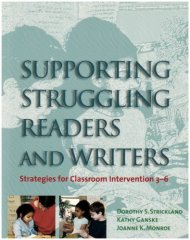 |
Supporting Struggling Readers and Writers: Strategies for Classroom
Intervention, 3-6
Author: Strickland, Dorothy S. Ganske,
Kathy Monroe, Joanne K. Monroe, Joanne Monroe, Joanne K.
ISBN:
1-57110-055-5
LCCN: 2001049274
Dewey: 372.6/044
21
Number:
|
Category:
Primary / junior schools
User Rating: 5.0 Stars
Pages:
250
Paperback Stenhouse Publishers
Book Description For most students, the intermediate years provide the last
opportunity to prevent continued failure in reading and writing. These years are
a critical bridge to the middle grades where the tendency is to be less
personalized and focused on individual needs. Supporting Struggling Readers and
Writers provides teachers, administrators, and staff developers with the best
research-based practice on the literacy learning and teaching of low-achieving
intermediate students. Drawing on a combined 40 years of classroom teaching
experience, the authors explore the factors that contribute to success and
failure in literacy and provide systematic and ongoing approaches for helping
students who are most at risk. You will find: effective teaching practices for
all of the key aspects of literacy instruction that can be realistically
implemented in the context of the classroom teacher's many demands
recommendations for motivating low-achieving students suggestions for working
with English Language Learners strategies for small-group instruction, word
study, reading comprehension, and writing clear descriptions and numerous
vignettes that illustrate teaching practices in action an emphasis on
differentiated instruction and ideas for integrating interventions for
struggling students with regular classroom instruction ways to help students
perform better on standardized tests. The extensive Strategy Bank provides over
20 step-by-step practices, each with three sections: What It Does, How to Do It,
and What to Look For. The Resources section provides extensive lists of
children's books and sources of books, organized by purpose. Supporting
Struggling Readers and Writers will help you improve the reading and writing
development of the most perplexing and needy children in your classroom.
Copublished with Stenhouse Publishers --This text refers to an out of print or
unavailable edition of this title.
Struggling Adolescent Readers: A Collection of Teaching
Strategies
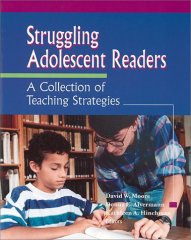 |
Struggling Adolescent Readers: A Collection of Teaching
Strategies
Author: Moore, David W. (Editor) Alvermann, Donna
E. (Editor) Hinchman, Kathleen A. (Editor) Alvermann, Donna E. Hinchman,
Kathleen A.
ISBN: 0-87207-272-X
LCCN:
00028138
Dewey: 428.4/071/2 21
Number:
|
Category: English
language: reading skills
User Rating: 4.5 Stars
Pages:
320
Paperback International Reading Association
Book Description This compilation, comprised almost entirely of articles from
the Journal of Adolescent & Adult Literacy, suggests ways to generate
academic engagement and success, and ways to break cycles of failure with
struggling adolescent readers. The articles acknowledge students' beliefs and
situations that interfere with learning while presenting ways to inspire teens
to be resilient and take charge of their learning. Learn to provide needed
support as your adolescent students use print to explore the world. From the
Back Cover Adolescents enter school from many different backgrounds, bringing
unique experiences and often speaking languages other than English. Because the
academic progress of students this age differs substantially, teachers must find
ways to reach adolescent students who continue to struggle with basic reading
processes. Recognizing that productively engaging low-achieving adolescents in
print-rich classrooms is complicated, editors David Moore, Donna Alvermann, and
Kathleen Hinchman have compiled Struggling Adolescent Readers: A Collection of
Teaching Strategies. This collection of 40 articles, drawn primarily from the
Journal of Adolescent & Adult Literacy, presents a valuable selection of
strategies focused specifically on teaching struggling readers in middle school
and high school classrooms. The book includes six sections: Working With
Struggling Adolescent Readers, Acknowledging Cultural Ties, Supporting Classroom
Reading, Supporting Classroom Writing and Inquiry, Varying Texts to Meet
Students' Interests and Needs, and Connecting In-School and Out-of-School
Reading. The articles present ways to generate academic engagement, to foster a
spirit of inquiry and an atmosphere of support, and to create environments where
students can explore multiple perspectives and interpretations of texts.
Struggling Adolescent Readers is an essential resource for middle school and
high school teachers who want to provide classroom activities that promote their
students' success and break the cycles of failure that adolescent students often
experience. Learn how you can better support adolescent students' needs as they
use print to explore the world inside the classroom and in their own lives.
Striking a Balance: Positive Practices for Early
Literacy
 |
Striking a Balance: Positive Practices for Early
Literacy
Author: Cecil, Nancy Lee
ISBN:
1-890871-21-4
LCCN: 98050862
Dewey: 372.4/0973
21
Number:
|
Category:
Language Experience Approach
User Rating: 4.5 Stars
Pages:
320
Paperback Holcomb Hathaway Publishing
Book Description Striking a Balance: Positive Practices for Early Literacy is
written to help prepare pre-service and practicing teachers to meet the
challenge of today's diverse student population and create a comprehensive
program that places direct skills instruction within the context of rich and
varied reading and writing experiences. Readable, thorough, and contemporary,
this concise text addresses the core topics and issues of literacy acquisition
clearly and succinctly. Grounded in theory and research, Striking a Balance also
shows readers how theory informs practice through its corresponding focus on
classroom application.
Strategic Teaching and Learning Standards-Based Instruction to Promote
Content Literacy in Grades Four through Twelve
|
Strategic Teaching and Learning Standards-Based Instruction to
Promote Content Literacy in Grades Four through Twelve
Author:
No Author
ISBN: 0-8011-1472-1
LCCN:
Dewey:
Number:
|
Category: User Rating: 4.0 Stars
Pages:
180
Paperback California Department of Education
Product Description Standards-Based Instruction to Promote Content Literacy
in Grades Four through Twelve
Strategic Spelling: Moving Beyond Word Memorization in the Middle
Grades
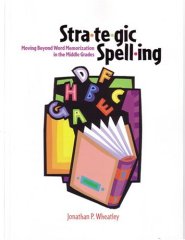 |
Strategic Spelling: Moving Beyond Word Memorization in the Middle
Grades
Author: Wheatley, Jonathan P.
ISBN:
0-87207-559-1
LCCN: 2005001672
Dewey: 372.63/2
22
Number:
|
Category:
English language: spelling
User Rating: 4.5 Stars
Pages:
152
Paperback International Reading Association
Product Description No word-list memorization here! Instead, you'll discover
classroom-tested, research-based strategies for teaching spelling in a way that
reflects how middle school students actually learn-by using spelling strategies
and recognizing language patterns. You can use this wealth of strategies,
activities, and ideas to teach your students to notice and exploit language
patterns; think about why words are spelled in particular ways; develop concrete
spelling strategies that can be used across the curriculum; and learn spelling
concepts in fun, interactive, and engaging ways.
Straight Talk About Reading : How Parents Can Make a Difference During the
Early Years
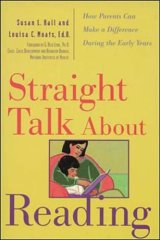 |
Straight Talk About Reading : How Parents Can Make a Difference
During the Early Years
Author: Moats, Louisa C. Hall, Susan
L. Moats, Louisa C.
ISBN: 0-8092-2857-2
LCCN:
98036002
Dewey: 372.41 21
Number:
|
Category: Writing
skills
User Rating: 5.0 Stars
Pages: 384
Paperback McGraw-Hill
From Library Journal Hall, a concerned parent, and Moats, a Harvard-educated
teacher, have written a well-intentioned resource for parents concerned about
children who have difficulty reading. While they address the need to read aloud
to children as infants, their book focuses primarily on the needs of preschool
and elementary school children. The authors recommend early exposure to reading
in order to aid children in their cognitive development and familiarize them
with a wide range of vocabulary, the structure of printed words, and story
development. A discussion of the phonics vs. whole-language approaches is
provided. This work complements Lucy Caulkins's Raising Lifelong Learners: A
Parent's Guide (LJ 10/1/97) and Bernice Cullinan's Read to Me: Raising Kids Who
Love to Read (Scholastic, 1992), among others. Recommended for public library
parent/teacher collections and academic libraries with an emphasis on elementary
education.?Lisa Powell Williams, Moline Southeast Lib., IL Copyright 1998 Reed
Business Information, Inc. Product Description Today's parents are increasingly
concerned about the reading and spelling skills taught in schools and are taking
charge of their children's education. Full of ideas and
suggestions--from innovative preschool exercises to techniques that
older children can use to increase reading speed and
comprehension--Straight Talk About Reading will instantly help any
parent lay a solid foundation for their child's formative educational years.
Stories, Songs & Poetry to Teach Reading &
Writing
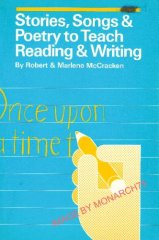 |
Stories, Songs & Poetry to Teach Reading &
Writing
Author: McCracken, Robert A. McCracken, Marlene J.
Colquhoun, Diana
ISBN: 0-920541-35-6
LCCN:
Dewey:
Number:
|
Category: English language: specific skills
User Rating:
5.0 Stars
Pages: 160
Paperback Peguis Publishers, Limited
Spelling Through Phonics
|
Spelling Through Phonics
Author: McCracken, Robert
McCracken, Robert A.
ISBN: 0-920541-00-3
LCCN:
Dewey:
Number:
|
Category: English language: spelling
User Rating: 4.5
Stars
Pages: 112
Paperback Peguis Publishers, Limited
The Spelling Book: Teaching Children How to Spell, Not What to
Spell
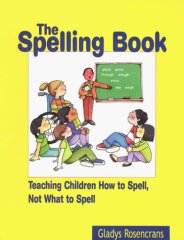 |
The Spelling Book: Teaching Children How to Spell, Not What to
Spell
Author: Rosencrans, Gladys
ISBN:
0-87207-192-8
LCCN: 98027308
Dewey: 372.63/2
21
Number:
|
Category:
English language: spelling
User Rating: 3.0 Stars
Pages:
224
Paperback International Reading Association
Book Description This spelling manual for teachers in the intermediate grades
outlines a methodology-developed and implemented by the author-that combines
whole language and phonetic strategies to teach children to spell as part of the
entire language arts program. The lessons and activities presented are easy for
teachers to adapt to fit into an existing program. Students will become more
independent as they are introduced to strategies that suit their own learning
style. ©1998 | 224 pp | ISBN: 0-87207-192-8 | 192-553 | Elementary/Middle From
the Publisher This book makes a significant contribution not only to teachers,
but to students, especially those who experience difficulty in learning how to
spell.
Speech to Print: Language Essentials for Teachers
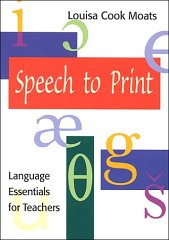 |
Speech to Print: Language Essentials for Teachers
Author:
Moats, Louisa Cook
ISBN: 1-55766-387-4
LCCN:
99086019
Dewey: 372.6 21
Number:
|
Category: English
language
User Rating: 4.0 Stars
Pages: 288
Paperback Brookes Publishing Company
Product Description Why study language? Because learning the basics of
language helps you understand your students' needs and to teach reading,
spelling, and writing explicitly and systematically. In this thorough and
well-written book, you'll understand the organization of written and spoken
English discover the connection between language structure and how individuals
learn to read find helpful chapter exercises and self-tests to ensure you master
the language skills presented get examples of students' writing to help you
interpret children's mistakes encounter sample lesson plans and adaptations that
apply the concepts of language you are learning All of this will enable you to
recognize, understand, and solve the problems individuals with or without
disabilities may encounter when learning to read and write. About the Author
Louisa Cook Moats, Ed.D. is Project Director at the District of Columbia Public
Schools site of the National Institute of Child Health and Human Development
Early Interventions Project, National Institutes of Health.
Sounds in Action: Phonological Awareness Activities &
Assessment
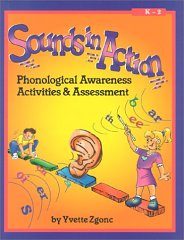 |
Sounds in Action: Phonological Awareness Activities &
Assessment
Author: Zgonc, Yvette
ISBN:
1-884548-32-6
LCCN: 00130396
Dewey: 372.46/5
21
Number:
|
Category:
Language Experience Approach
User Rating: 4.5 Stars
Pages:
160
Paperback Staff Development for Educator
Book Description At least 20% of today's children begin school lacking the
phonological awareness skills they need to become successful readers. This book
provides you with all the tools you need to determine who these children are,
pinpoint their deficiencies, and address their various needs. Card catalog
description An assessement that measures K-2 students' phonological awareness
skills, specific activities for each skill, activities to make the connection
between phonological awareness and phonics, a discussion of key research
findings, and further readings.
Sounds & Letters for Readers & Spellers: Phoneme Awareness Drills
for Teachers & Speech-Language Pathologists
 |
Sounds & Letters for Readers & Spellers: Phoneme Awareness
Drills for Teachers & Speech-Language Pathologists
Author:
Greene, Jane Fell
ISBN: 1-57035-126-0
LCCN:
Dewey:
Number:
|
Category: Schools
User Rating: 5.0 Stars
Pages:
134
Spiral-bound Sopris West
A Sound Way
|
A Sound Way
Author: Love Reilly
ISBN:
0-582-80414-0
LCCN:
Dewey:
Number:
|
Category: Business &
Management
User Rating: Pages: 223
Paperback Prentice-Hall
Solving Your Child's Reading Problem
|
Solving Your Child's Reading Problem
Author:
Linksman, Ricki
ISBN: 0-8065-1618-6
LCCN:
94044300
Dewey: 649/.58 20
Number:
|
Category: Child care
& upbringing
User Rating: 5.0 Stars
Pages: 344
Paperback Carol Publishing Corporation
From Booklist Anyone seeking a low-jargon approach to reading instruction
will find it here. Written by the director of the National Reading Diagnostics
Institute, this book offers solutions to parents or child-care workers who wish
to supplement a preschool through high-school reading program in order to bring
a child up to or beyond his or her grade level. It is clearly intended to
support rather than supplant the classroom teacher. Linksman has successfully
tested these techniques at all grade and achievement levels and shows parents
how to remedy both recent and recurring problems by boosting a child's
self-esteem before building his reading skills. Interested adults can learn how
to diagnose a child's learning style as predominantly visual, auditory, tactile,
or kinesthetic and will find games and exercises suited to each style.
Additional diagnostic procedures and exercises are simple, challenging, and
easily accomplished in short, daily sessions at home. The techniques here may be
practical and traditional, but the book's real value is its offer of hope that
the worst reading problem is solvable with time, effort, support, and a positive
attitude. Patricia Hassler
Snapshots: Literacy Minilessons Up Close
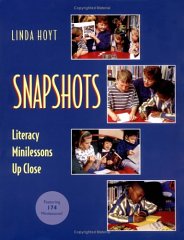 |
Snapshots: Literacy Minilessons Up Close
Author:
Hoyt, Linda Bird, Lois Bridges
ISBN:
0-325-00272-X
LCCN: 00059776
Dewey: 372.4
21
Number:
|
Category:
English language: reading skills
User Rating: 4.5
Stars
Pages: 264
Paperback Heinemann
Product Description Visualizing during reading. Choosing just-right books.
Using a table of contents. Peer editing. What do these strategies have in
common? Theyre all tools of skilled readers and writers. And theres no better
way to teach them than through minilessons. Minilessons provide strategic,
focused instruction that children can put to immediate use. They capture
interest without risking boredom. Linda Hoyt, author of the popular Revisit,
Reflect, Retell, returns with the definitive guide to conducting minilessons
across the literacy spectrum. Linda covers oral reading, guided reading,
independent reading, and writing, providing more than 170 of her best
minilessons for understanding individual words and whole texts, fiction and
nonfiction. For each "Snapshot," Linda guides you through a process for
gradually handing over responsibility to your students: Demonstration: Its
important to communicate the goal of the lesson to your students. Then, using
one of the books many reproducibles or your own text, model what you want them
to do, explaining how you arrive at decisions. Make your thinking as transparent
as possible so students will understand how to apply the strategy. Guided and
Independent Practice: Give students the chance to try the strategy, perhaps in
pairs, small groups, or teamswith you as coach. From there, allow them to apply
the strategy in their personal work as you assess them for what theyre doing
well and where they need support. Reflection: Students must think about the
strategy, to promote its long-term use. What did we learn? How did the strategy
work for us? How else might we use it? Linda includes "Key Questions" within
each Snapshot to get you and your students started. Snapshots is essential for
making the most of even the shortest moments of your day. It will help you
broaden your students vision so they can see the many functions of literacy and
apply them in real and meaningful ways. About the Author Linda Hoyt has many
years of experience teaching in elementary classrooms. She has also worked as a
reading specialist, a staff developer, a curriculum specialist, and is currently
a full-time consultant. Her special love is creating environments where children
engage as active participants in the learning process.
Small-Group Reading Instruction: A Differentiated Teaching Model for
Beginning and Struggling Readers
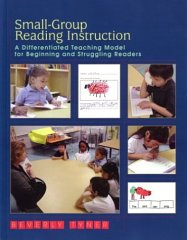 |
Small-Group Reading Instruction: A Differentiated Teaching Model
for Beginning and Struggling Readers
Author: Tyner, Beverly
ISBN: 0-87207-007-7
LCCN: 2003016451
Dewey:
372.41/62 22
Number:
|
Category: English language: reading skills
User Rating:
5.0 Stars
Pages: 272
Paperback International Reading Association
Product Description As many schools are adapting to an ever-increasing broad
range of learners, it becomes more important than ever to develop instruction to
respond to these academically diverse students. Without differentiated reading
instruction, some children will fall further behind while others will be left
unchallenged. In Small-Group Reading Instruction: A Differentiated Teaching
Model for Beginning and Struggling Readers, author Beverly Tyner presents the
Small-Group Differentiated Reading Model, an explicit classroom-tested and
research-based model that provides effective reading instruction by combining
guided reading and word study in small groups, allowing you to address the needs
of beginning and struggling readers in a regular classroom setting. The
following aspects support the success of the Small-Group Differentiated Reading
Model: -Every group of students is given quality reading instruction and tasks
that are worthwhile, valuable, and matched to students' instructional level.
-Assessment is ongoing and directly linked to instruction. -Components of the
model work interactively, building on and supporting one another. The chapters
present easy-to-implement lesson plans and activities to support the five stages
of reading-emergent, beginning, fledgling, transitional, and independent-and the
appendixes offer instructions on using the Early Reading Screening Instrument,
word study materials, and word scramble and writing activities. Although
intended primarily for primary-grade teachers, Small-Group Reading Instruction
also will interest teachers of struggling readers in grades K–5 and those in
charge of reading intervention programs. The book will provide you with teaching
strategies and materials to determine and address your students' literacy
education needs.
Skydyes: A Visual Guide to Fabric Painting
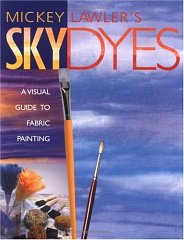 |
Skydyes: A Visual Guide to Fabric Painting
Author:
Lawler, Mickey Nelson, Annie Koolish, Lynn Koolish, Lynn
ISBN: 1-57120-072-X
LCCN: 98058154
Dewey:
746.6 21
Number:
|
Category: Needlework & fabric crafts
User Rating:
5.0 Stars
Pages: 112
Paperback C&T Publishing
Amazon.com Renowned textile artist Mickey Lawler's exquisite hand-painted
fabrics are eagerly sought by quilters. Here she shares her amazing way with
color and design, instructing readers of any skill level how to paint cottons to
achieve remarkable scenic effects suggesting sunrises, sunsets, night skies,
storms, seas, landscapes, and gardens. Most of all she exhorts us to have fun,
to relax and develop a playful attitude toward our work, to enjoy the
serendipitous results these techniques produce. Strewn throughout these vivid
pages are gorgeous quilts by various artists utilizing Lawlor's hand-painted
fabrics. Also included is one brief project for turning your own painted fabrics
into a simple quilt. --Amy Handy From Library Journal Like many of C&T's
offerings, Skydyes takes an easygoing tutorial approach to teach quilters new
aspects of their craft. Known for her beautiful hand-painted cotton fabrics,
Lawler here teaches the art of fabric painting to those who would rather paint
their own than buy custom-painted fabric. Once supplies and equipment, fabric
preparation, and painting techniques have been covered, the reader is led
step-by-step through a series of landscape painting exercises illustrating each
technique. All of the exercises are then pieced into an abstract landscape quilt
that will serve as a permanent reference for the aspiring fabric painter. An
excellent resource list and inspiring full-color photos of unique landscape
quilts add to the value of this title. An excellent choice for any library
collecting in this area. Copyright 2000 Reed Business Information, Inc.
SIPPS: Challenge level teacher's guide : systematic instruction in phoneme
awareness, phonics, and sight words : a polysyllabic decoding
unit
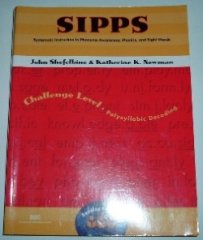 |
SIPPS: Challenge level teacher's guide : systematic instruction in
phoneme awareness, phonics, and sight words : a polysyllabic decoding
unit
Author: Shefelbine, John L Newman, Katherine K.
ISBN: 1-57621-352-8
LCCN:
Dewey:
Number:
|
Category:
Phonetic method
User Rating: 5.0 Stars
Pages: 315
Unknown Binding Developmental Studies Center
Includes materials for Beginning level, Extension level, Challenge level and
1 Decoding manual. Includes bibliographical references.
SIPPS : systematic instruction in phoneme awareness, phonics, and sight
words
|
SIPPS : systematic instruction in phoneme awareness, phonics, and
sight words
Author: Shefelbine, John L. Newman, Katherine K.
ISBN: 1-57621-351-X
LCCN: 2001268078
Dewey:
Number:
|
Category:
Word recognition -- Study and teaching (Primary)
User Rating: 5.0
Stars
Pages: 0
Hardcover Developmental Studies Center
Includes materials for Beginning level, Extension level, Challenge level and
1 Decoding manual. Includes bibliographical references.
Sing a Song of Poetry
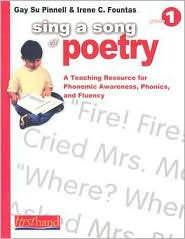 |
Sing a Song of Poetry
Author: Pinnell, Gay Su
Fountas, Irene C.
ISBN: 0-325-00656-3
LCCN:
2003021325
Dewey: 372.46/5 22
Number:
|
Category: Teaching -
Reading & Language
User Rating: 5.0 Stars
Pages: 282
Paperback Heinemann
From the Publisher A Teaching Resource for Phonemic Awareness, Phonics, and
Fluency Synopsis A Teaching Resource for Phonemic Awareness, Phonics, and
Fluency
Shaping Literate Minds: Developing Self-Regulated
Learners
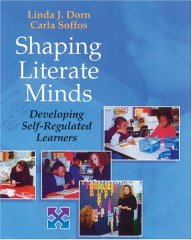 |
Shaping Literate Minds: Developing Self-Regulated
Learners
Author: Dorn, Linda J. Soffos, Carla Soffos, Carla
ISBN: 1-57110-338-4
LCCN: 2001042026
Dewey:
372.6/0973 21
Number:
|
Category: Study & learning skills
User Rating:
5.0 Stars
Pages: 142
Paperback Stenhouse Publishers
From the Publisher This is a book about problem solving--an internal tool
that shapes the cognitive development of young readers and writers. At the same
time, it is a book about the role of the teacher and the curriculum in
structuring problem-solving opportunities. It is a book that advocates for
schools to create intellectual environments that make literate thinking a top
priority for children. Finally, it is a book that presents teaching and learning
as collaborative processes between many people with a common goal--literacy for
children. from the Introduction How can teachers create a literacy curriculum
that builds processing links between reading, writing, and spelling knowledge?
In Shaping Literate Minds, Linda J. Dorn and Carla Soffos illustrate how
processing theory can be applied to the everyday practices of classroom
teaching. If instruction emphasizes the interrelationships of these three
language areas, students learn how to transfer knowledge, skills, and strategies
across literacy events. This is complex theory, but the authors provide clear
and practical examples to support teachers as they incorporate these ideas into
their classroom practices. Grounded in authentic experiences from primary
classrooms, this book provides: explanations of processing behaviors among
reading, writing, and spelling knowledge; observational tools that support
teachers in noticing changes over time in specific literacy behaviors; guidance
on creating conditions for developing self-regulated learners; authentic reading
and writing samples and teacher/student interactions; figures and pictures that
clearly describe howteachers can use assessment to inform and guide instruction,
with links to national standards; details for establishing a school-based
literacy model that includes team meetings, assessment walls, high standards,
and a curriculum for literacy; appendixes with reproducible assessment
checklists, report cards, task cards for literacy corners, and guided reading
observation forms for team meetings. With a national emphasis on accountability,
high standards, and literacy achievement, Shaping Literate Minds will help
teachers and administrators implement a high-quality literacy curriculum that
links to national and state goals. Synopsis This is a book about problem
solving--an internal tool that shapes the cognitive development of young readers
and writers. At the same time, it is a book about the role of the teacher and
the curriculum in structuring problem-solving opportunities. It is a book that
advocates for schools to create intellectual environments that make literate
thinking a top priority for children. Finally, it is a book that presents
teaching and learning as collaborative processes between many people with a
common goal--literacy for children. from the Introduction How can teachers
create a literacy curriculum that builds processing links between reading,
writing, and spelling knowledge? In Shaping Literate Minds, Linda J. Dorn and
Carla Soffos illustrate how processing theory can be applied to the everyday
practices of classroom teaching. If instruction emphasizes the
interrelationships of these three language areas, students learn how to transfer
knowledge, skills, and strategies across literacy events. This is complex
theory, but the authors provide clear and practical examples to support teachers
as they incorporate these ideas into their classroom practices. Grounded in
authentic experiences from primary classrooms, this book provides: explanations
of processing behaviors among reading, writing, and spelling knowledge;
observational tools that support teachers in noticing changes over time in
specific literacy behaviors; guidance on creating conditions for developing
self-regulated learners; authentic reading and writing samples and
teacher/student interactions; figures and pictures that clearly describe
howteachers can use assessment to inform and guide instruction, with links to
national standards; details for establishing a school-based literacy model that
includes team meetings, asses
Seeing With New Eyes A Guidebook on teaching and Assessing Beginning Writers
Using 6-Trait Writing
|
Seeing With New Eyes A Guidebook on teaching and Assessing
Beginning Writers Using 6-Trait Writing
Author: Northwest
Regional Education Laboratory Staff
ISBN:
LCCN:
Dewey:
Number:
|
Category: User Rating: Pages: 0
Paperback Northwest Regional Education Laboratory
Scholastics PHONICS Readers ABC-PARTY, Boxed Set 61-72 [[Paperback & 2
Cassettes] 1997]
|
Scholastics PHONICS Readers ABC-PARTY, Boxed Set 61-72 [[Paperback
& 2 Cassettes] 1997]
Author: Scholastic (Editor)
ISBN: 0-590-11638-X
LCCN:
Dewey:
Number:
|
Category:
User Rating: 4.5 Stars
Pages: 0
Paperback Scholastic
Scholastic Spelling Teacher's Resource Book
|
Scholastic Spelling Teacher's Resource Book
Author:
No Author
ISBN: 0-590-34896-5
LCCN:
Dewey:
Number:
|
Category: User Rating: 4.5 Stars
Pages:
256
Paperback Scholastic Inc.
Scholastic Spelling Level 4
|
Scholastic Spelling Level 4
Author: No Author
ISBN: 0-590-34897-3
LCCN:
Dewey:
Number:
|
Category:
User Rating: 4.5 Stars
Pages: 0
Paperback
Scholastic Spelling Level 1 [TEACHER'S EDITION]
|
Scholastic Spelling Level 1 [TEACHER'S EDITION]
Author:
No Author
ISBN: 0-590-34894-9
LCCN:
Dewey:
Number:
|
Category: User Rating: 4.5 Stars
Pages:
0
Paperback Scholastic, Inc.
Product Description This is the Teacher's Resource book which includes
reproducible Practice and Homework blackline masters to support children who are
using Scholastic Spelling. In addition, a collection of blackline masters to
help assess, manage, and communicate each child's progress is provided.
Scholastic phonics readers, books 37-72: Teacher's
guide
|
Scholastic phonics readers, books 37-72: Teacher's
guide
Author: Shefelbine, John L
ISBN:
0-590-13398-5
LCCN:
Dewey:
Number:
|
Category: Phonetic
method
User Rating: 4.5 Stars
Pages: 96
Unknown Binding Scholastic
Scholastic Guide to Balanced Reading
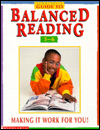 |
Scholastic Guide to Balanced Reading
Author: Baltas,
Joyce (Editor) Shafer, Susan (Editor)
ISBN:
0-590-96053-9
LCCN:
Dewey:
Number:
|
Category: Language
Experience Approach
User Rating: 5.0 Stars
Pages: 120
Paperback Scholastic
Book Description Making It Work for You! An accessible blend of theory and
practice, this book covers management, assessment, integrating the language
arts, using literature, the role of skills and strategies, using technology, the
role of mentors, supporting all learners, and connecting families and school.
Each chapter contains: Spotlight on Theory: a theoretical article by an academic
expert; ? Spotlight on Practice: a classroom-based article by a practicing
teacher; ? Assessing Your Classroom: a tool to see how your classroom fits this
approach; ? Try This: easy-to-implement suggestions for trying new approaches.
Scholastic Big Book of Word Walls: 100 Fresh & Fun Word Walls, Easy
Games, Activities, and Teaching Tips to Help Kids Build Key Reading, Writing,
Spelling Skills and More
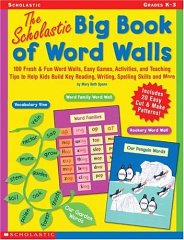 |
Scholastic Big Book of Word Walls: 100 Fresh & Fun Word Walls,
Easy Games, Activities, and Teaching Tips to Help Kids Build Key Reading,
Writing, Spelling Skills and More
Author: Spann, Mary Beth
ISBN: 0-439-16519-9
LCCN:
Dewey:
Number:
|
Category:
Language Experience Approach
User Rating: 4.0 Stars
Pages:
112
Paperback Scholastic Teaching Resources
Product Description A giant collection of fresh and effective ideas for using
word walls to build literacy across the curriculum. Includes ABC Word Wall, Word
Family Word Wall, 100th Day of School Word Wall, Family Tree Word Wall, holiday
ideas, activities, games, and more. Plus - solutions for when space is a
problem! For use with Grades K-3. About the Author Mary Beth Spann is a former
elementary teacher and author of many educational books, including 30
Collaborative Books for Your Class to Make and Share and Collaborative Math
Books for Your Class to Make & Share.
RICA Exam Support Materials
|
RICA Exam Support Materials
Author: CSU
ISBN:
LCCN:
Dewey:
Number:
|
Category: User
Rating: Pages: 0
Support materials for studying for the Reading Instruction Competence
Assessment
Rewards: Reading, Excellence, Word Attack and Rate Development
Strategies
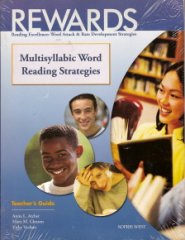 |
Rewards: Reading, Excellence, Word Attack and Rate Development
Strategies
Author: Archer, Anita L. Gleason, Mary M. Vachon,
Vicky
ISBN: 1-57035-271-2
LCCN:
Dewey:
Number:
|
Category:
Teaching Methods & Materials - Reading
User Rating: 5.0
Stars
Pages: 376
Paperback Sopris West
Revisiting The Reading Workshop: Management, Mini-Lessons, &
Strategies
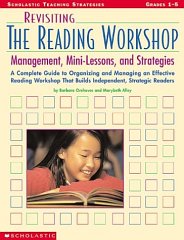 |
Revisiting The Reading Workshop: Management, Mini-Lessons, &
Strategies
Author: Orehovec, Barbara Alley, Marybeth
ISBN: 0-439-44404-7
LCCN: 2004271472
Dewey:
372.4 22
Number:
|
Category: Education
User Rating: 4.5
Stars
Pages: 160
Paperback Scholastic, Inc.
From the Publisher Barbara Orehovec and Marybeth Alley's fresh look at
reading workshop shows teachers how to get the most out of this highly effective
approach. Teaching reading strategies, building comprehension, exploring genre
and literary elements, meeting the needs of every reader. . . the authors give
teachers the keys to all this and more in their comprehensive book. You'll find
everything you need from scheduling details and strategy mini-lessons to
hand-chosen book lists and assessment forms. Synopsis Barbara Orehovec and
Marybeth Alley's fresh look at reading workshop shows teachers how to get the
most out of this highly effective approach. Teaching reading strategies,
building comprehension, exploring genre and literary elements, meeting the needs
of every reader. . . the authors give teachers the keys to all this and more in
their comprehensive book. You'll find everything you need from scheduling
details and strategy mini-lessons to hand-chosen book lists and assessment
forms.
Revisit, Reflect, Retell: Strategies for Improving Reading
Comprehension
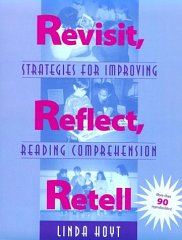 |
Revisit, Reflect, Retell: Strategies for Improving Reading
Comprehension
Author: Hoyt, Linda
ISBN:
0-325-00071-9
LCCN: 98029644
Dewey: 372.4
21
Number:
|
Category:
English literature: literary criticism
User Rating: 5.0
Stars
Pages: 208
Paperback Heinemann
Product Description How can we be certain that students are making sense of
print? What can we do to improve comprehension? Linda Hoyt, a reading specialist
and staff developer, is convinced that thoughtful reflection and retelling are
the keys. When readers reflect upon and retell what they know about a text, they
experience deeper levels of understanding and increased communicative
competency. This highly practical collection of more than 130 strategies and 90
reproducibles is the perfect resource for any teacher attempting to evoke
high-quality responses to literature. It provides a detailed look at why to
respond to text, when to respond to text, and how readers might be invited to
respond in authentic ways. All of the strategies are classroom tested, and the
blackline masters offer powerful incentives for creative interactions. Each
chapter is loaded with assessment tools for teachers, student self-reflection
forms, observation guides, and parent activities that are ready for immediate
use. You and your students will laugh together in Game Show, explore
graphophonic understandings through Alphaboxes and AlphaAntics, engage in
inferential reasoning with V.I.P., and stretch your understanding with
Interactive Journals. Revisit, Reflect, Retell is firmly grounded in
constructivist reading theory, offering support across a range of genres and
learning styles. Teachers will find it a valuable resource for creating
meaningful and authentic learning experiences. The book will be equally useful
as a workshop manual, discussion starter for teacher study groups, and support
for staff developers. About the Author Linda Hoyt has many years of experience
teaching in elementary classrooms. She has also worked as a reading specialist,
a staff developer, a curriculum specialist, and is currently a full-time
consultant. Her special love is creating environments where children engage as
active participants in the learning process.
Reciprocal Teaching at Work: Strategies for Improving Reading
Comprehension
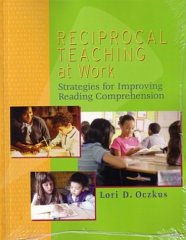 |
Reciprocal Teaching at Work: Strategies for Improving Reading
Comprehension
Author: Oczkus, Lori D.
ISBN:
0-87207-514-1
LCCN: 2003016148
Dewey: 372.47
22
Number:
|
Category:
English language: reading skills
User Rating: 5.0
Stars
Pages: 224
Paperback International Reading Association
Product Description Reciprocal teaching is a technique based on teacher
modeling, student participation, and four strategies that good readers use to
comprehend text: predicting, questioning, clarifying, and summarizing. Although
reciprocal teaching originally was designed for use with struggling readers,
author Lori D. Oczkus offers innovative lessons aimed at improving the reading
comprehension of all students. Reciprocal Teaching at Work: Strategies for
Improving Reading Comprehension provides a practical classroom resource on
reciprocal teaching that readers will find accessible and engaging. Chapter 1
describes each reciprocal teaching strategy in detail and suggests ways that
teachers can overcome both difficulties that they may encounter when using this
teaching technique and common problems that students have with using the
strategies. Chapters 2–4 explain how to use reciprocal teaching in whole-class
sessions, guided reading groups, and literature circles, respectively. Each of
these chapters offers scaffolded lessons, minilessons, and reproducible forms
for classroom teachers to use with students, and reflection questions for staff
development. The appendixes provide a list of what teachers should observe when
students work with the reciprocal teaching strategies, a student self-assessment
for strategy usage, and instructions for conducting informal assessment
interviews with students. This book will benefit classroom teachers and reading
specialists working primarily with students in grades 2–6, and teacher
educators, school administrators, and staff developers seeking successful
reading comprehension strategies to share with teachers.
The Reading-Writing Workshop
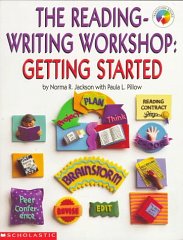 |
The Reading-Writing Workshop
Author: Jackson, Norma
R. Pillow, Paula L.
ISBN: 0-590-49167-9
LCCN:
Dewey:
Number:
|
Category: Composition & Creative Writing -
General
User Rating: 5.0 Stars
Pages: 136
Paperback Scholastic
Book Description Getting Started Weave your reading and writing programs into
a successful workshop with this easy-to-read guide. Includes classroom-tested
mini-lessons and reproducible charts and record-keepers.
The Reading Workshop: Creating Space for Readers
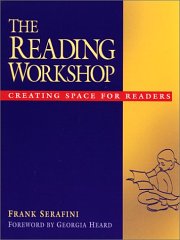 |
The Reading Workshop: Creating Space for Readers
Author:
Serafini, Frank Heard, Georgia
ISBN:
0-325-00330-0
LCCN: 2001016965
Dewey: 372.4
21
Number:
|
Category:
English language: reading skills
User Rating: 4.5
Stars
Pages: 160
Paperback Heinemann
Georgia Heard "...[this book] will give teachers the inspiration and guidance
they might be searching for to create their own reader's community." Review
Every teacher will take to heart Frank's gentle guidance on how to create an
environment where children and books intersect in the most natural of ways, and
I'm positive that [this book] will give teachers the inspiration and guidance
they might be searching for to create their own reader's
community.Georgia Heard
Reading To, With, and by Children
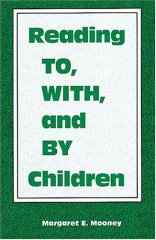 |
Reading To, With, and by Children
Author: Mooney,
Margaret E.
ISBN: 0-913461-18-0
LCCN:
90030678
Dewey: 372.4 20
Number:
|
Category: Teaching
Methods & Materials - Reading
User Rating: 4.0 Stars
Pages:
104
Paperback Richard C. Owen Publishers
Includes bibliographical references.
Reading Strategies That Work
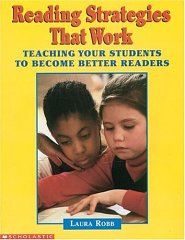 |
Reading Strategies That Work
Author: Robb, Laura
ISBN: 0-590-25111-2
LCCN: 97112688
Dewey:
Number:
|
Category:
Language Experience Approach
User Rating: 5.0 Stars
Pages:
96
Paperback Scholastic
Book Description Teaching Your Students to Become Better Reader This book
helps develop better, more successful readers. Highly practical and complete, it
offers more than 30 key strategies and how and when to use them. Also included
are mini lessons, reading interviews, vocabulary-building strategies,
conferencing, and more. An essential resource for middle grade teachers. Card
catalog description Teaching ideas to help students learn reading strategies
which are intended to develop their skills in and enjoyment of reading.
Reading Strategies
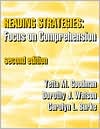 |
Reading Strategies
Author: Goodman, Yetta M. M.
Watson, Dorothy J. Burke, Carolyn L. Watson, Dorothy J. Burke, Carolyn L.
ISBN: 1-878450-86-7
LCCN: 95049164
Dewey:
428.4/07 20
Number:
|
Category: Teaching - Reading & Language
User Rating:
4.5 Stars
Pages: 256
Textbook Paperback Richard C. Owen Pubs., Inc.
Includes bibliographical references (p. 265-268) and index.
Reading Response Logs: Inviting Students to Explore Novels, Short Stories,
Plays, Poetry and More
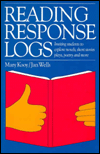 |
Reading Response Logs: Inviting Students to Explore Novels, Short
Stories, Plays, Poetry and More
Author: Kooy, Mary Wells,
Jan
ISBN: 0-435-07208-0
LCCN:
96011277
Dewey:
Number:
|
Category:
Literacy
User Rating: 4.0 Stars
Pages: 127
Paperback Heinemann
Book Description This practical resource for middle and secondary school
teachers presents a fresh approach to literature that makes the study of any
genre more meaningful and exciting.
Reading Research Anthology: The Why? of Reading
Instruction
 |
Reading Research Anthology: The Why? of Reading
Instruction
Author: No Author Nathan, Ruth Diamond, Linda
ISBN: 1-57128-121-5
LCCN: 99158588
Dewey:
372.4 21
Number:
|
Category: Reading Skills
User Rating: 5.0
Stars
Pages: 226
Paperback Academic Therapy Pubns
Includes bibliographical references.
Reading Recovery: A Guidebook for Teachers in Training
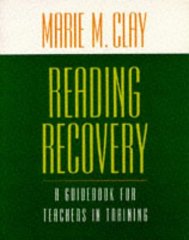 |
Reading Recovery: A Guidebook for Teachers in
Training
Author: Clay, Marie M.
ISBN:
0-435-08764-9
LCCN: 93024028
Dewey: 372.4/3
20
Number:
|
Category:
English language: specific skills
User Rating: 4.5
Stars
Pages: 112
Paperback Heinemann
Product Description Reading Recovery is a guidebook for training teachers to
deliver an early intervention program designed to reduce literacy problems in an
education system. Children entering the Reading Recovery program are those from
ordinary classes who have the most difficulty in reading and writing after one
year at school. Since the Reading Recovery program is different for every child,
the implementation of a successful program requires thorough teacher training.
Using the child's competencies as a starting point, the program advances toward
what the child is trying to accomplish. The teaching, therefore, must be
individually designed and individually delivered. Using the guidelines in this
book, teachers learn how to provide each child with an intensive program of
daily instruction which supplements the regular class instruction activities.
The goal of Reading Recovery is to help children acquire efficient patterns of
learning to enable them to work at the average level of their classmates and to
continue to progress satisfactorily in their own school's instructional program.
When recognized training accompanies the use of procedures contained in this
book, success rates are consistently high and surprising. About the Author Marie
Clay, FRSNZ, FNZPsS, FNZEI(Hon),Emeritus Professor, taught in primary schools
and then at the University of Auckland where, for the next 30 years she
introduced educational psychologists to ways of preventing psychological
problems. She did post-graduate study in Developmental Psychology at the
University of Minnesota on a Fulbright Scholarship and completed her doctorate
at the University of Auckland with a thesis entitled "Emergent Literacy." Her
'Reading (and writing) Recovery' is an early literacy intervention, which is now
implemented in five countries, and three languages. Literacy Lessons Designed
For Individuals integrates what has been learned from that innovation with new
research and theoretical advocacies. Shifts in early literacy learning can be
monitored by teachers using her Observation Survey of Early Literacy Achievement
in English, Spanish and French. A series of individual lessons can be delivered
in those languages to about 150,000 children worldwide
Reading Reasons: Motivational Mini-Lessons for Middle and High
School
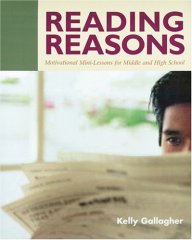 |
Reading Reasons: Motivational Mini-Lessons for Middle and High
School
Author: Gallagher, Kelly
ISBN:
1-57110-356-2
LCCN: 2002042775
Dewey: 428.4/071/2
21
Number:
|
Category:
Reading Skills
User Rating: 4.5 Stars
Pages: 180
Paperback Stenhouse Publishers
From the Publisher "In Reading Reasons, Kelly Gallagher offers a series of
mini-lessons specifically tailored to motivate middle and high school students
to read, and in doing so, to help them understand the importance and relevance
reading will take in their lives. This book introduces and explains in detail
nine specific "real-world" reasons why students should be readers." The book
contains forty practical, classroom-tested and reproducible mini-lessons that
get to the heart of reading motivation and that can be used immediately in
English - as well as other content-area - classrooms. These easy-to-use
motivational lessons serve as weekly reading "booster shots" that help maintain
reading enthusiasm in your classroom from September through June. The
mini-lessons, ranging from five to twenty minutes in length, hit home with
adolescents, and in turn, enable them to internalize the importance reading will
place in their lives. Rather than telling students reading is good for them, the
lessons in this book show them the benefits of reading. Synopsis "In Reading
Reasons, Kelly Gallagher offers a series of mini-lessons specifically tailored
to motivate middle and high school students to read, and in doing so, to help
them understand the importance and relevance reading will take in their lives.
This book introduces and explains in detail nine specific "real-world" reasons
why students should be readers." The book contains forty practical,
classroom-tested and reproducible mini-lessons that get to the heart of reading
motivation and that can be used immediately in English - as well as other
content-area - classrooms. These easy-to-use motivational lessons serve as
weekly reading "booster shots" that help maintain reading enthusiasm in your
classroom from September through June. The mini-lessons, ranging from five to
twenty minutes in length, hit home with adolescents, and in turn, enable them to
internalize the importance reading will place in their lives. Rather than
telling students reading is good for them, the lessons in this book show them
the benefits of reading.
Reading Process and Practice: From Socio-Psycholinguistics to Whole
Language
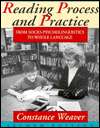 |
Reading Process and Practice: From Socio-Psycholinguistics to Whole
Language
Author: Weaver, Constance
ISBN:
0-435-08799-1
LCCN: 93019844
Dewey: 428.4
20
Number:
|
Category:
Reading Education (General)
User Rating: 4.0 Stars
Pages:
707
Paperback Heinemann
From the Publisher This book is currently out of stock with a ready about
date of September 30, 1999.Since the publication of the first edition in 1988,
Reading Process and Practice has helped countless numbers of preservice and
practicing teachers better understand the reading process and translate this
understanding into classroom practice. Considerably more than half the material
in this second edition is new. In the first half of the book, Connie Weaver has
updated and revised the discussion of the reading process, while retaining the
think it through-for-yourself format. This discussion culminates in a model of
reading that combines evidence from laboratory studies of word perception with
naturalistic studies of how readers process complete and coherent texts. The
chapter on miscue analysis is expanded to include new sections on reading
portfolios and on retrospective miscue analysis. A new chapter, "Teaching
Reading and Developing Literacy," clarifies some key differences between those
who advocate traditional "reading readiness" and "beginning reading" instruction
and those who advocate the promotion of "emergent literacy" of experiences
typically viewed as whole language in nature. A central chapter, "Phonics and
Whole Language: From Politics to Research," emphasizes that phonics and whole
language are not alternative routes to the same goals. Whole language teaching
has much broader aims, while promoting the development of strategies and skills
that readers and writers actually need. The latter part of the book is entirely
new. It begins with a chapter further characterizing whole language principles
and practices, with discussion of some of the myths surrounding whole language.
This is followed by a chapter on growing into whole language teaching of
writing, reading, literature, and theme study (with a brief section on teaching
for critical literacy). These chapters set the stage for those written entirely
or mostly by other experts: a chapter on enhancing reading and the enjoyment of
literature through the oral language arts, by Ruth Beall Heinig; a chapter on
understanding and working with those having reading problems or other special
needs, with sections by Linda Erdmann, Cora Lee Five, Marie Dionisio, and Suki
Stone; and a chapter on teaching students for whom English is a second language,
by Yvonne and David Freeman. Other substantive sections have been contributed by
Kathryn Mitchell Pierce. Reading Process and Practice, Second Edition, will be a
major resource for teachers who want to implement a whole language curriculum
that bases reading instruction on what is currently known about how children
learn and how they learn to read and write naturally. Synopsis This book is
currently out of stock with a ready about date of September 30, 1999.Since the
publication of the first edition in 1988, Reading Process and Practice has
helped countless numbers of preservice and practicing teachers better understand
the reading process and translate this understanding into classroom practice.
Considerably more than half the material in this second edition is new. In the
first half of the book, Connie Weaver has updated and revised the discussion of
the reading process, while retaining the think it through-for-yourself format.
This discussion culminates in a model of reading that combines evidence from
laboratory studies of word perception with naturalistic studies of how readers
process complete and coherent texts. The chapter on miscue analysis is expanded
to include new sections on reading portfolios and on retrospective miscue
analysis. A new chapter, "Teaching Reading and Developing Literacy," clarifies
some key differences between those who advocate traditional "reading readiness"
and "beginning reading" instruction and those who advocate the promotion of
"emergent literacy" of experiences typically viewed as whole language in nature.
A central chapter, "Phonics and Whole Language: From Politics to Research,"
emphasizes that phonics and whole language are not alternative routes to the
same goals. Whole langu
Reading Magic: Why Reading Aloud to Our Children Will Change Their Lives
Forever
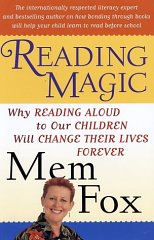 |
Reading Magic: Why Reading Aloud to Our Children Will Change Their
Lives Forever
Author: Fox, Mem Horacek, Judy (Illustrator)
ISBN: 0-15-601076-3
LCCN: 2001024631
Dewey:
649/.58 21
Number:
|
Category: Child Development And Rearing
User Rating:
4.5 Stars
Pages: 176
Paperback Harvest Books
From Publishers Weekly Two books for adults pay tribute to children's books
and to the artists and writers who create them. In Reading Magic: Why Reading
Aloud to Our Children Will Change Their Lives Forever, bestselling picture book
author Mem Fox extols the benefits of reading to preschoolers even newborns and
gives suggestions for helping children learn to read by themselves. Line
drawings by Judy Horacek inject some levity. Copyright 2001 Cahners Business
Information, Inc. --This text refers to the Hardcover edition. From School
Library Journal An introduction for parents about reading aloud to their
children. Fox explains that babies are born learners, discusses the importance
of books in the home, and stresses the value of a read-aloud ritual. She also
includes a chapter on how to read aloud, which novice readers will find useful.
Anecdotal stories are widespread, and "success stories" might intimidate parents
whose children do not learn to read by age five, even with mom or dad reading
aloud to them. Theories provided do not include reference to supporting
research. In the chapter "Birth, Brains, and Beyond," Fox writes that "having
deep-and-meaningful conversations with our kids.-[has] also been linked
positively to IQ development" without reference to her source for this
information. Proponents of phonics-based reading instruction will take issue
with the author's "whole stories" approach. There are no age-appropriate reading
lists for busy parents, and there is no bibliography for the works cited in the
text. Libraries that already own Jim Trelease's The Read-Aloud Handbook
(Penguin, 1995) or Bernice E. Cullinan's Read to Me: Raising Kids Who Love to
Read (Scholastic, 1992) will find this new title an additional purchase. Shauna
Yusko, King County Library System, Bellevue, WA Copyright 2001 Cahners Business
Information, Inc. --This text refers to the Hardcover edition.
Reading Is Only the Tigers Tail: A Language Arts
Program
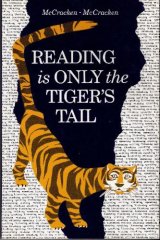 |
Reading Is Only the Tigers Tail: A Language Arts
Program
Author: McCracken, Robert A. McCracken, Marlene J.
ISBN: 0-920541-13-5
LCCN:
Dewey:
Number:
|
Category:
English language: specific skills
User Rating: 5.0
Stars
Pages: 243
Paperback Peguis Publishers, Limited
Reading for Meaning: Fostering Comprehension in the Middle Grades (Language
and Literacy Series
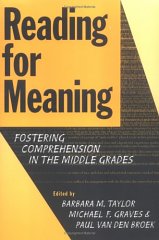 |
Reading for Meaning: Fostering Comprehension in the Middle Grades
(Language and Literacy Series
Author: Taylor, Barbara
(Editor) Graves, Michael F. (Editor) Broek, Paul Van Den (Editor) Graves,
Michael F. (Eds.)
ISBN: 0-8077-3896-4
LCCN:
99045904
Dewey: 428.4/3/0712 21
Number:
|
Category: English
language: reading skills
User Rating: 5.0 Stars
Pages:
206
Paperback Teachers College Press
Description: Reading comprehension is of great concern to many Americans, as
evidenced by the mandate in most states today for graduation standards in
reading and for assessments aligned to those standards. In this unique and
timely volume, leading scholars and researchers provide a broad overview of
current educational and psychological research about effective strategies for
teaching reading to middle grade students. This rich collection offers
practitioners, researchers, and literacy specialists a valuable resource for
improving reading comprehension at the elementary and secondary levels.
Reading Essentials: The Specifics You Need to Teach Reading
Well
 |
Reading Essentials: The Specifics You Need to Teach Reading
Well
Author: Routman, Regie
ISBN:
0-325-00492-7
LCCN: 2002011704
Dewey: 372.4
21
Number:
|
Category:
English language: reading skills
User Rating: 5.0
Stars
Pages: 272
Paperback Heinemann
Product Description With
all the controversy and confusion over "best practice" issues in teaching
reading, someone with the necessary experience, the ability to take the long
view, and most of all a level head is essential to set things straight. This is
where Regie Routman steps in: giving clarity, support, specific demonstrations,
and confidence to teachers so they can teach reading in a manner that is
consistent with research and learning theory and respectful of students' needs,
interests, and abilities. In Reading Essentials, she realistically describes how
to achieve these goalsand get high test scores too. Based on her continuing work
teaching in schools, Routman proves that good teaching doesn't have to mean lots
of hours spent planning. What's necessary is good thinkingthinking about what
matters to kids, what kids need to know, how we can move them forward, and how
to ensure that they comprehend and enjoy what they readincluding struggling
students. Readers will discover research-based strategies, immediately doable
ideas, and detailed lessonsall based on an instructional framework that
includes: demonstrations shared demonstrations guided practice independent
practice. Thoughout the text, Routman emphasizes the use of professional common
sense and demonstrates how to maximize your time, making the most of every
teachable moment. Practical, philosophical, and political, Reading Essentials
gets to the heart of what excellent reading instruction is all aboutand puts the
fun back into your teaching. About the Author Regie Routman's intimate knowledge
of teaching and learning, down-to-earth style, and dedication to children's
success have made her one of the most vibrant and respected names in literacy
education. Her books, Teaching Essentials; Writing Essentials; Reading
Essentials; Conversations; Literacy at the Crossroads; Invitations; The Blue
Pages; and Transitions, all published by Heinemann, have encouraged hundreds of
thousands of teachers to take charge of their professional learning and create
efficient, joyful practices. Currently she is dedicating herself to a new,
dynamic framework to support teachers' professional development. The DVD-based
Regie Routman in Residence supports in-depth, yearlong literacy staff
development that replicates the demonstration teaching she conducts in weeklong
residencies and brings to life the practices she advocates in Teaching
Essentials. Regie continues to inform and inspire teachers as a language arts
coach in schools across the country, as a sp
Reading Development in a Second Language: Theoretical, Empirical and
Classroom Perspectives
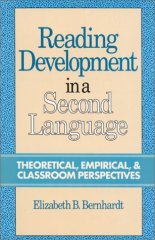 |
Reading Development in a Second Language: Theoretical, Empirical
and Classroom Perspectives
Author: Bernhardt, Elizabeth B.
DiPietro, Robert J.
ISBN: 0-89391-734-6
LCCN:
Dewey:
Number:
|
Category: Language teaching theory & methods
User
Rating: 4.0 Stars
Pages: 272
Paperback Ablex Publishing
Product Description eading Development in a Second Language attempts to
provide a thorough account of what is known about the acquisition of reading
abilities in a second language. Its aim is to foster more principled research
and instruction in second language literacy. In order to teach the aim
discussion is set forth from a variety of perspectives: first; through
examinations of theoretical models of the reading process and their application
to a second language context; second, through a synthesis of the empirical data
base from 1973 to the present; third, by means of descriptions of reader-based
interactions with second language texts; and finally, through concepts of
curriculum, instruction, and assessment.
The reading corner: Ideas, games, and activities for individualizing
reading
|
The reading corner: Ideas, games, and activities for
individualizing reading
Author: Forgan, Harry W
ISBN: 0-87620-795-6
LCCN: 76028292
Dewey:
372.4/147
Number:
|
Category: Individualized reading instruction
User Rating:
4.0 Stars
Pages: 73
Unknown Binding Goodyear Pub. Co
Reading and Linguistic Development (From Reading Research to Practice
Series)
 |
Reading and Linguistic Development (From Reading Research to
Practice Series)
Author: Menyuk, Paula Chall, Jeanne S.
ISBN: 1-57129-071-0
LCCN: 99011226
Dewey:
401/.93 21
Number:
|
Category: Reading Education (General)
User Rating:
4.0 Stars
Pages: 59
Paperback Brookline Books
Product Description Relates, in nontechnical language, language development
to the child's progress in reading.
Reading Aloud and Beyond: Fostering the Intellectual Life with Older
Readers
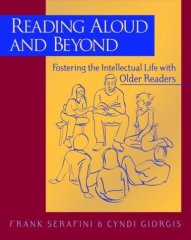 |
Reading Aloud and Beyond: Fostering the Intellectual Life with
Older Readers
Author: Serafini, Frank Giorgis, Cyndy
Giorgis, Cyndi Giorgis, Cyndi
ISBN:
0-325-00522-2
LCCN: 2003007498
Dewey: 372.45/2
21
Number:
|
Category:
English language
User Rating: 5.0 Stars
Pages: 112
Paperback Heinemann
Product Description Reading aloud - that's for primary school children,
right? No, say Frank Serafini and Cyndi Giorgis. They contend that reading aloud
is just as important for older readers. And they provide the research to back
their claim. They maintain that reading aloud belongs in the intermediate
elementary grades, and middle school too, because it: supports students'
development as readers and writers fosters the love of reading improves reading
skills and abilities and, yes, even raises standardized test scores. But
Serafini and Giorgis do more than argue a persuasive case. They provide the
practical wherewithal to implement reading aloud as an instructional strategy
for both the language arts and the content area disciplines. They also include
extensive lists of suggested literature - picture books, chapter books,
informational texts, poetry, and professional references. What's more, these
authors show how teachers can create in the classroom an intellectual universe
where discussions are profound and students enthusiastic about expanding their
minds and appreciating the sound and beauty of language. About the Author Frank
Serafini is the author or coauthor of the Heinemann titles More (Advanced)
Lessons in Comprehension (2008), Around the Reading Workshop in 180 Days (2006),
Lessons in Comprehension (2004), Reading Aloud and Beyond (2003), and The
Reading Workshop (2001). He is Associate Professor of Literacy Education and
Children's Literature at the University of Nevada, Las Vegas, teaching courses
in children's literature, literary theory, and literacy research. Frank Serafini
is a Heinemann Professional Development provider. Cyndi Giorgis is an Associate
Professor at the University of Nevada, Las Vegas. She is a former coauthor of
the childrens books column in The Reading Teacher and has served on both the
Newbery and Caldecott Award committees. She has published and presented
extensively on topics related to literature, reader response, and curriculum.
Reading - Learning Strategies
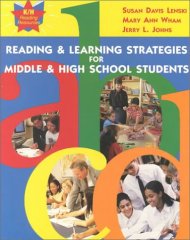 |
Reading - Learning Strategies
Author: Lenski Wham,
Mary Ann Johns, Jerry L. Johns, Jerry L. Wham, Mary Ann
ISBN:
0-7872-5607-2
LCCN:
Dewey:
Number:
|
Category: Reading
Skills
User Rating: 5.0 Stars
Pages: 370
Paperback Kendall/Hunt Publishing Company
Readers' Workshop
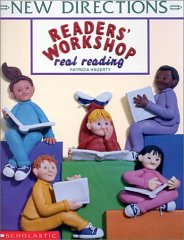 |
Readers' Workshop
Author: Hagerty Hagerty, Patricia
J.
ISBN: 0-590-73077-0
LCCN:
Dewey:
Number:
|
Category:
General
User Rating: 5.0 Stars
Pages: 44
Paperback Scholastic
Book Description Real Reading In a reading workshop, children select their
own titles, read at their own pace, talk about books?and learn to love
literature! Includes complete how-to's, management strategies and assessment
tips.
Readers and Writers with a Difference: A Holistic Approach to Teaching
Struggling Readers and Writers
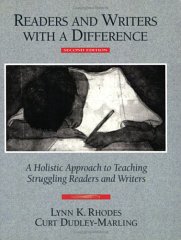 |
Readers and Writers with a Difference: A Holistic Approach to
Teaching Struggling Readers and Writers
Author:
Dudley-Marling, Curt Rhodes, Lynn K.
ISBN:
0-435-07215-3
LCCN: 96005894
Dewey: 371.9/0973
20
Number:
|
Category:
Linguistics
User Rating: 5.0 Stars
Pages: 400
Paperback Heinemann
Product Description When the first edition of Readers and Writers with a
Difference appeared in 1988, it shattered the myth that whole language
instruction was too unstructured and inexplicit to help remedial and learning
disabled students. By providing specific assessment and instructional
strategies, it was one of the first texts to show that struggling readers and
writers could, indeed, benefit from holistic methods-not just in the resource
room, but in the regular classroom as well. Today, as more and more students
with learning problems are entering mainstream classroom settings, the models
presented by Rhodes and Dudley-Marling are more cogent than ever. But the
framework upon which whole language theory rests has greatly evolved since the
first edition was published and has also come under increasing attack. This
second edition renews the case for whole language theory, taking into account
the various developments in language arts over the past eight years. Included
are new and expanded sections on literacy theory, instruction and assessment,
and literacy as social practice; and a reconsideration of how teachers,
administrators, and parents might work and learn collaboratively. The authors
write, "It is no longer possible to talk about approaches to teaching students
to read (and write) once and for all," write the authors. "Instead, we have to
think about supporting students as they learn a range of literate practices . .
." The second edition of Readers and Writers with a Difference offers myriad
suggestions for making that range as rich and far reaching as possible. About
the Author A professor at the Lynch School of Education at Boston College and a
former elementary teacher, Curt Dudley-Marling has spent his career focusing on
the needs of struggling readers and writers. He is the author or coauthor of a
number of books with Heinemann, including A Family Affair (2000); Readers and
Writers with a Difference, Second Edition (1996); Who Owns Learning? (1994);
When Students Have Time to Talk (1991); and the James N. Britton Award-winning
Living with Uncertainty (1997). Lynn K. Rhodes is a professor of language,
literacy, and culture and the associate dean of teacher education at the
University of Colorado at Denver. Her books include Readers and Writers with a
Difference (with Curt Dudley-Marling), Windows into Literacy: Assessing Learners
K-8 (with Nancy Shanklin, 1993) and Literacy Assessment: A Handbook of
Instruments (1993), all published by Heinemann.
Read-Alouds With Young Children
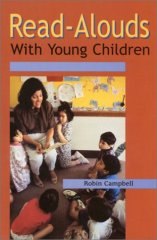 |
Read-Alouds With Young Children
Author: Campbell,
Robin
ISBN: 0-87207-289-4
LCCN:
2001000630
Dewey: 372.4 21
Number:
|
Category: English
language early readers
User Rating: 5.0 Stars
Pages: 107
Paperback International Reading Association
Book Description Children enter the elementary school classroom with varying
amounts of exposure to books. Regardless of this personal experience, however,
teachers can greatly extend a child's literacy development through interactive
classroom read-alouds. Reading a story aloud presents endless opportunities for
related activities, from classroom discussions to role plays, shared readings,
group writings, arts and crafts, and songs. Read-Alouds With Young Children
explores read-alouds in both home and school settings and encourages the use of
read-alouds as a starting point for further learning in several curricular
areas. Read-alouds provide many types of literacy support for children: Children
learn about literacy through an adult who provides a model of reading; they form
an understanding of how print functions and how it is used; they develop a
knowledge and understanding of letters and letter-sound relationships; they
learn new words, new sentences, and new discourse patterns; they learn about the
structure of stories; and they develop a positive attitude toward books. As this
book illustrates, the opportunities for developing a curriculum from read-alouds
are almost limitless. Classroom teachers and teacher educators will find this
book useful as a means of reconsidering the contribution of read-alouds to a
literacy curriculum. Not only do the ideas presented here provide a basis for
children to learn through literacy, they help retain children's enjoyment of the
read-aloud and encourage them to become lifelong readers. About the Author Robin
Campbell is professor emeritus of primary education at the University of
Hertfordshire, Watford, United Kingdom.
Read To Me 2000: Raising Kids Who Love To Read
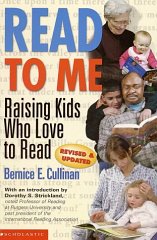 |
Read To Me 2000: Raising Kids Who Love To Read
Author:
Cullinan, Bernice E.
ISBN: 0-439-08721-X
LCCN:
00027178
Dewey: 649/.58 21
Number:
|
Category: Juvenile
Nonfiction
User Rating: 5.0 Stars
Pages: 160
Paperback Cartwheel
From the Publisher How can you find the time to expand a child's imagination?
How can you teach a child to love books? How can you help your child do better
in school when you are busy yourself? Highly acclaimed reading specialist
Bernice E. Cullinan, professor of Early Childhood and Elementary Education,
answers all of these questions and much more in this revised edition of Read to
Me: Raising Kids Who Love to Read. This accessible and informative guidebook to
reading aloud includes sensible advice and important tips on: when to start
reading to your child. how to use television and computers wisely. how to make a
reader out of your child. how to make a writer out of your child. Plus a
completely updated list of surefire hit read-aloud books for preschoolers to
preteens. By reading aloud, you can give your child a head start in life. Use
this book today to help you give him or her the lifelong treasure of reading.
Synopsis How can you find the time to expand a child's imagination? How can you
teach a child to love books? How can you help your child do better in school
when you are busy yourself? Highly acclaimed reading specialist Bernice E.
Cullinan, professor of Early Childhood and Elementary Education, answers all of
these questions and much more in this revised edition of Read to Me: Raising
Kids Who Love to Read. This accessible and informative guidebook to reading
aloud includes sensible advice and important tips on: when to start reading to
your child. how to use television and computers wisely. how to make a reader out
of your child. how to make a writer out of your child. Plus a completely updated
list of surefire hit read-aloud books for preschoolers to preteens. By reading
aloud, you can give your child a head start in life. Use this book today to help
you give him or her the lifelong treasure of reading.
Read It Aloud! Using Literature in the Secondary Content
Classroom
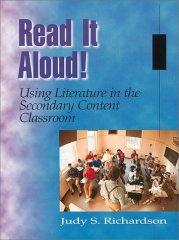 |
Read It Aloud! Using Literature in the Secondary Content
Classroom
Author: Richardson, Judy S.
ISBN:
0-87207-256-8
LCCN: 99049355
Dewey: 428/.4/0712
21
Number:
|
Category:
English language: reading skills
User Rating: 4.0
Stars
Pages: 118
Paperback International Reading Association
Product Description Reading aloud is valuable for students of any age because
it models expressive, enthusiastic reading, transmits the pleasure of reading,
and invites listeners to be readers. Based on her “Read It Aloud” columns from
IRA's Journal of Adolescent & Adult Literacy, author Richardson shows middle
school and high school teachers how to use read-alouds from a variety of
literary genres in the content areas. You'll find activities that encourage
students to read and study further in these genres, along with teaching ideas
for special populations and principles for selecting and using great
read-alouds. From the Back Cover Author Judy Richardson supports the belief that
reading aloud is a valuable activity for students of any age, and that reading
aloud models expressive, enthusiastic reading; and invites listeners to be
readers. Read It Aloud! Using Literature in the Secondary Content Classroom is
based on the author's "Read It Aloud" columns from the International Reading
Association's Journal of Adolescent & Adult Literacy. This book shows middle
school and high school classroom teachers how read-aloud excerpts from a variety
of literary genres can be used in the content areas. A Pulitzer Prize winner to
teach science? A Newbery Honor book to teach social studies? A best-selling
novel to teach math? Read It Aloud! provides activities that promote students'
further reading and study in these genres and several others, and offers
teaching ideas for special populations such as adult beginning readers and
readers with disabilities. Also included are principles for selecting and using
read-alouds and suggestions for locating great read-alouds. Read It Aloud!
dispels the myth that reading aloud is useful only for elementary-age children.
Use read-alouds with your adolescent students and discover that these readings
make the content come alive, make good sense, and are just plain fun.
Read It Again!: Revisiting Shared Reading
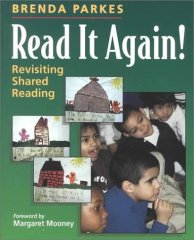 |
Read It Again!: Revisiting Shared Reading
Author:
Parkes, Brenda Stratton, Philippa
ISBN:
1-57110-304-X
LCCN: 00055648
Dewey: 372.4
21
Number:
|
Category:
Professional Development
User Rating: 5.0 Stars
Pages:
148
Paperback Stenhouse Publishers
From the Publisher In this book, Brenda Parkes introduces new teachers to
shared reading and helps experienced teachers revitalize this important teaching
practice. Starting with the bedtime story, Read It Again! outlines the essential
elements and benefits of shared reading and provides detailed examples which
show how a shared reading session unfolds in the classroom. By including
examples of implicit and explicit teaching, Brenda demonstrates how shared
reading helps children develop a range of strategies for reading and
comprehending text. You will find detailed strategies that support learners in
developing self-extending systems through their understanding of content and
process and several examples of independent activities that consolidate and
extend learning. Good book selection is the key to successful shared reading
experiences. In discussing the criteria for quality book selection, Brenda shows
us how to critically assess the teaching and learning possibilities in shared
reading books and how to use a variety of text types to model purpose, content,
and form. The book includes an analysis of supportive text features for the
different needs of emergent, early, and fluent readers. Annotated bibliographies
provide a quick reference to quality books. Read It Again! refines and extends
our understanding of shared reading, and shows primary teachers how to put this
valuable approach into practice. Synopsis In this book, Brenda Parkes introduces
new teachers to shared reading and helps experienced teachers revitalize this
important teaching practice. Starting with the bedtime story, Read It Again!
outlines the essential elements and benefits of shared reading and provides
detailed examples which show how a shared reading session unfolds in the
classroom. By including examples of implicit and explicit teaching, Brenda
demonstrates how shared reading helps children develop a range of strategies for
reading and comprehending text. You will find detailed strategies that support
learners in developing self-extending systems through their understanding of
content and process and several examples of independent activities that
consolidate and extend learning. Good book selection is the key to successful
shared reading experiences. In discussing the criteria for quality book
selection, Brenda shows us how to critically assess the teaching and learning
possibilities in shared reading books and how to use a variety of text types to
model purpose, content, and form. The book includes an analysis of supportive
text features for the different needs of emergent, early, and fluent readers.
Annotated bibliographies provide a quick reference to quality books. Read It
Again! refines and extends our understanding of shared reading, and shows
primary teachers how to put this valuable approach into practice.
Read All About It!: Great Read-Aloud Stories, Poems, and Newspaper Pieces
for Preteens and Teens
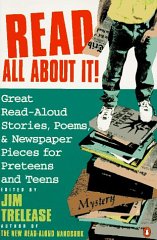 |
Read All About It!: Great Read-Aloud Stories, Poems, and Newspaper
Pieces for Preteens and Teens
Author: Trelease, Jim (Editor)
ISBN: 0-14-014655-5
LCCN: 93021781
Dewey:
[Fic] 20
Number:
|
Category: Anthologies
User Rating: 4.0
Stars
Pages: 512
Paperback Penguin
Card catalog description Presents a collection of fictional stories,
autobiographical pieces, and newspaper columns, arranged for reading aloud.
Reaching Readers: Flexible and Innovative Strategies for Guided
Reading
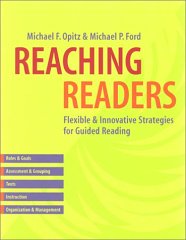 |
Reaching Readers: Flexible and Innovative Strategies for Guided
Reading
Author: Opitz, Michael F. Ford, Michael P. Ford,
Michael P. Optiz, Michael F.
ISBN:
0-325-00358-0
LCCN: 2001026410
Dewey: 372.41/62
21
Number:
|
Category:
English language: reading skills
User Rating: 5.0
Stars
Pages: 192
Paperback Heinemann
Product Description The breakout success of guided reading comes as no
surprise to most teachers. But is there only one way to do guided reading? Must
teachers follow a defined set of guidelines? Michael Opitz and Michael Ford's
response is an emphatic "No." With Reaching Readers, they offer a
second-generation model of guided reading - one that urges teachers to expand
their vision and presents alternative practices. Reaching Readers originates
from the idea that there are at least five considerations that need to be
thought through for meaningful guided reading to occur: Roles and Goals: There
are many different guided reading experiences, each one calling for different
ways to group children and structure what happens. Opitz and Ford help you think
through your roles and goals to obtain a broader perspective. Assessment and
Grouping: Good instruction begins with assessing, which leads to grouping
decisions. Reaching Readers addresses your concerns about size, number, and
group members, including how to use the results of assessment strategies and
form groups. Texts: There are many different types of texts and several ways to
match texts to readers. Readers will find here suggestions for using each type
of text as well as sample titles. Instruction: It's essential that each guided
reading lesson be strategically planned. Opitz and Ford visit nine different
classrooms that show purposeful guided reading experiences in action to help you
develop your own instruction. Organization and Management: One adult with
several children requires some kind of organization and management plan. The
book presents ideas for keeping children meaningfully engaged, freeing you to
interact with small guided reading groups with minimal interruptions. Opitz and
Ford's goal is to make guided reading an even more effective and efficient
instructional technique. With this book, you can help ensure that all students
reach their full potential as independent, lifelong readers. About the Author
Michael F. Opitz is the author of nine books, including the Heinemann titles
Do-able Differentiation (2008), Books & Beyond (2007), Listen Hear! (2004),
Reaching Readers (2001), Rhymes and Reasons (2000), and Good-bye Round Robin
(1998).Michael is a former elementary school teacher and reading specialist. Now
he is a professor of elementary education and reading at the University of
Northern Colorado and the winner of its Outstanding Scholar Award in the College
of Education and Behavioral Sciences. He works in classrooms in the US and
abroad planning, teaching and evaluating demonstration lessons focused on
different aspect of literacy in K - 5 classrooms. He is also the author of the
books Flexible Grouping in Reading (1998), and Literacy Instruction for
Culturally and Linguistically Diverse Students (1998) as well as Summer Success
Reading (Great Source, 2001). He works as a consultant for Great Source
Education Group and the US Department of Defense Schools.Mic Michael P. Ford is
the author or coauthor of the Heinemann titles Do-able Differentiation (20078),
Books and Beyond (2007), Where Have All the Bluebirds Gone (2002), and Reaching
Readers (2001).He is a professor of reading in the College of Education and
Human Services at the University of Wisconsin Oshkosh. He has been involved with
literacy education for more than thirty years as a first-grade and Title I
teacher as well as a researcher and teacher-educator. His work with the
international school associations has taken him to Africa, Europe and the Middle
East. Michael has also written over forty professional articles for the
publications such asThe Reading Teacher, Reading Today, Language Arts, and The
Learning Disabilities Forum. He is former president of the Wisconsin State
Reading Association and its former Advocacy Chairperson. He is the father of two
boys who inform his thinking about literacy programs on a daily basis. Michael
P. Ford is a Heinemann Professional De
Radical Reflections: Passionate Opinions on Teaching, Learning, and
Living
 |
Radical Reflections: Passionate Opinions on Teaching, Learning, and
Living
Author: Fox, Mem
ISBN:
0-15-607947-X
LCCN: 92030497
Dewey: 372.6/0973
20
Number:
|
Category:
Elementary School Language Arts
User Rating: 5.0
Stars
Pages: 192
Paperback Harvest Books
From Library Journal With lighthearted anecdotes, poems, letters, and other
writings, the renowned Australian children's book author entices teachers to do
more writing themselves and rejects the "skills-and-drills" mentality in
language arts teaching. Fox, an advocate of the "whole language" movement,
fiercely condemns the use of basal readers in reading instruction classes. Their
dullness, she maintains, causes students to avoid reading altogether. Fox
recommends instead that real books be read and real language used. She advocates
stories that bring teacher and student together in a relationship to experience
genuine feeling, laughter, and fun. A superb writer, she constructs an excellent
case, and surely any child would like to be a member of her reading/writing
class. Her ideas are jotted down in a rather disorganized fashion, but her
writing is fresh. For most public and academic libraries. - Arla Lindgren, St.
John's Univ., New York Copyright 1993 Reed Business Information, Inc. Product
Description The internationally acclaimed children's book writer and educator
offers her insights into the learning process, language education, and the
pleasure, growth, and power that reading and writing can bring.
Questioning the Author: An Approach for Enhancing Student Engagement With
Text
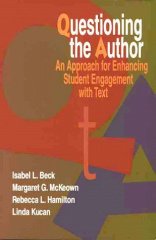 |
Questioning the Author: An Approach for Enhancing Student
Engagement With Text
Author: McKeown, Margaret G. Hamilton,
Rebecca L. Kucan, Linda Beck, Isabel L. (Editor) Hamilton, Rebecca L.
ISBN: 0-87207-242-8
LCCN: 96052260
Dewey:
372.47 21
Number:
|
Category: Educational systems
User Rating: 5.0
Stars
Pages: 128
Paperback International Reading Association
Book Description "Questioning the Author" (QtA) is an interactive teaching
strategy that helps students comprehend what they are reading. When elementary
students read in a QtA lesson, they learn to question the ideas presented in the
text while they are reading, making them thinkers, not just readers. Questioning
the Author: An Approach for Enhancing Student Engagement with Text presents many
examples of QtA in action. The authors analyze the transcripts of actual class
discussions to show the important tools that differentiate QtA from other
approaches to reading comprehension and engagement. From the Back Cover Despite
teachers' best efforts, students often fail to understand many of the ideas
presented in school textbooks. This is a common concern among educators who
encounter students who are not actively engaged with what they read. To address
this concern, the authors of this volume present a strategy called Questioning
the Author (QtA), an approach designed to establish student interactions with
text to build greater understanding. When students read in a QtA lesson, they
are taught to question the ideas presented in the text while they are reading, a
strategy that differs from many traditional approaches that ask students to
answer questions when they have finished reading the text. Questioning the
Author: An Approach for Enhancing Student Engagement with Text presents many
examples of QtA in action as children engage with narrative and expository texts
to construct meaning. The authors analyze the transcripts of actual class
discussions to show the important tools that differentiate QtA from other
approaches that have similar characteristics but that often do not help readers
reach the same level of understanding. Questioning the Author will be a valuable
resource for elementary teachers who are looking for a proven strategy to engage
their students in reading and improve comprehension.
Process and Portfolios in Writing Instruction
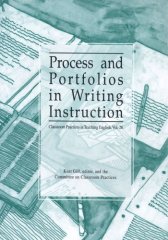 |
Process and Portfolios in Writing Instruction
Author:
Gill, Kent (Editor)
ISBN: 0-8141-3724-5
LCCN:
Dewey:
Number:
|
Category: General
User Rating: 5.0 Stars
Pages:
99
Paperback National Council of Teachers of English
Printing Teacher's Guide-Contracted Editions
|
Printing Teacher's Guide-Contracted Editions
Author:
Olsen, Jan Olsen, Jan Z.
ISBN:
1-891627-03-1
LCCN:
Dewey:
Number:
|
Category:
Handwriting
User Rating: 5.0 Stars
Pages: 88
Paperback Handwriting Without Tears
Printing Power-Contracted Edition
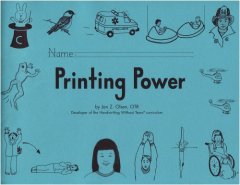 |
Printing Power-Contracted Edition
Author: Olsen, Jan
Olsen, Jan Z.
ISBN: 1-891627-02-3
LCCN:
Dewey:
Number:
|
Category: Handwriting
User Rating: 5.0
Stars
Pages: 60
Paperback Handwriting Without Tears
Primary Literacy Centers : Making Reading and Writing
Stick!
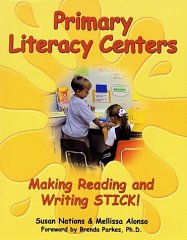 |
Primary Literacy Centers : Making Reading and Writing
Stick!
Author: Nations, Susan Alonso, Mellissa Alonso,
Mellissa Alonso, Mellissa
ISBN: 0-929895-46-0
LCCN:
00065397
Dewey: 372.6 21
Number:
|
Category: Teaching
Methods & Materials - Classroom Planning
User Rating: 4.5
Stars
Pages: 192
Paperback Maupin House Publishing
Book Description Make literacy centers a vital part of your standards-based
teaching! Primary teachers learn how to set up, manage, and evaluate seven
literacy centers that provide quality reading and writing experiences to supprt
IRA/NCTE standards. Allows teachers to support whole-class actvities while
working with small groups. Supports the balanced literacy approach and features
language arts mini-lesssons with easy-to-use center connections. Gives students
opportunities to practice and apply literacy-block skills and strategies.
Includes reading, work, reading the room, listening, research, literature
response, writing, and poetry. From the Author "With literacy demands higher
than ever before, it is critical that we give students time to practice and
apply the strategies we teach. Literacy centers provide authentic opportunities
for students to practice and apply reading and writing strategies."
Prereading Activities for Content Area Reading and
Learning
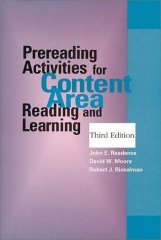 |
Prereading Activities for Content Area Reading and
Learning
Author: Readence, John E. Moore, David W.
Rickelman, Robert J. Readence, John E. Rickelman, Robert J.
ISBN: 0-87207-261-4
LCCN:
Dewey:
Number:
|
Category:
English language: reading skills
User Rating: 4.0
Stars
Pages: 96
Paperback International Reading Association
Book Description This revision of the best-selling second edition addresses
recent developments in prereading activities and includes a new chapter that
addresses the nuances of selecting, combining, and using prereading activities
across lessons and units. The wealth of strategies and the expanded reference
list offered in this new edition will help teachers make print materials in all
content areas understandable and interesting to students. From the Publisher The
third edition of Prereading Activities for Content Area Reading and Writing by
John Readence, David Moore, and Robert Rickelman is now available
(ISBN:0-87207-261-4). --This text refers to an out of print or unavailable
edition of this title.
Predictable Charts: Shared Writing for Kindergarten And First
Grade
|
Predictable Charts: Shared Writing for Kindergarten And First
Grade
Author: Hall, Dorothy Williams, Elaine
ISBN: 0-88724-627-3
LCCN:
Dewey:
Number:
|
Category:
Teaching Methods & Materials - General
User Rating: 4.5
Stars
Pages: 242
Paperback Carson-Dellosa Publishing Company
Practical Ideas for Teaching Writing as a Process, Elementary and Middle
Grade Levels
|
Practical Ideas for Teaching Writing as a Process, Elementary and
Middle Grade Levels
Author: Olson, Carol B. Olson, Carol B.
(Ed.)
ISBN: 0-8011-1221-4
LCCN:
Dewey:
Number:
|
Category:
General
User Rating: 5.0 Stars
Pages: 320
Paperback California Department of Education
Practical Guide to Reciprocal Teaching
|
Practical Guide to Reciprocal Teaching
Author:
Lubliner, Shira Palincsar, Annemarie
ISBN:
0-322-05127-4
LCCN: 2001017689
Dewey: 428.4/3
21
Number:
|
Category:
Teaching - Reading & Language
User Rating: Pages:
157
Hardcover Wright Group, The
Includes bibliographical references (p. 129-134).
Portfolios in the Writing Classroom: An Introduction
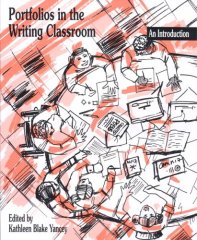 |
Portfolios in the Writing Classroom: An
Introduction
Author: Yancey, Kathleen Blake (Editor)
ISBN: 0-8141-3645-1
LCCN: 91039907
Dewey:
808/.042/07 20
Number:
|
Category: Rhetoric
User Rating: 4.5
Stars
Pages: 128
Paperback National Council of Teachers of English
Includes bibliographical references (p. 117-123).
Pocket Charts for Emergent Readers: 30 Fun, Interactive Cross-Curricular
Charts That Build Literacy
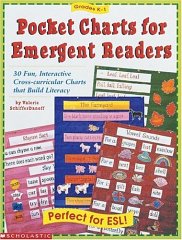 |
Pocket Charts for Emergent Readers: 30 Fun, Interactive
Cross-Curricular Charts That Build Literacy
Author:
SchifferDanoff, Valerie
ISBN: 0-590-31470-X
LCCN:
Dewey:
Number:
|
Category: Language Experience Approach
User Rating:
2.5 Stars
Pages: 112
Paperback Scholastic Teaching Resources
Product Description Create irresistible pocket charts that are just right for
emergent readers with this practical guide. It includes easy-to-follow
directions for making more than 30 charts using poems, songs, predictable
stories, and more to build early literacy skills. Includes reproducible patterns
and literature links. For use with Grades K-1. About the Author Valerie
SchifferDanoff is a mentor teacher and educational writer. She is also the
author of The Scholastic Integrated Language Arts Resource Book, The Pocket
Chart Book, and Pocket Charts for Emergent Readers, all for Scholastic Teaching
Resources.
Picture Books An Annotated Bibliography for Activities for Teaching 6-Trait
Writing
|
Picture Books An Annotated Bibliography for Activities for Teaching
6-Trait Writing
Author: Ruth Culham
ISBN:
LCCN:
Dewey:
Number:
|
Category: User
Rating: Pages: 0
Paperback Northwest Regional Education Laboratory
Phonics They Use: Words for Reading and Writing
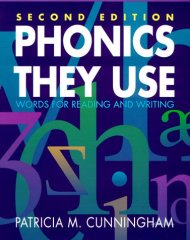 |
Phonics They Use: Words for Reading and Writing
Author:
Cunningham, Patricia M.
ISBN: 0-673-99087-7
LCCN:
94034943
Dewey: 372.4/145 20
Number:
|
Category:
Literacy
User Rating: 4.5 Stars
Pages: 202
Paperback Pearson P T R
From the Back Cover An invaluable resource for any teacher in search of new
ideas! The new edition of this bestseller is packed with new activities and
strategies for teaching reading. It weaves together the complex and varied
strategic approaches needed to help students develop reading and spelling
skills. Written by well-known author Patricia Cunningham, Phonics They Use
offers a coherent collection of practical, hands-on activities that provide a
framework for teaching phonics. The Fourth Edition continues to emphasize that
what matters most is when students use phonics for decoding a new word, for
reading and spelling a new word, and for writing. Rather than subscribe to a
single theory, the book stresses a balanced reading program- incorporating a
variety of strategic approaches-tied to the individual needs of children. Full
chapter on developing phonological and phonemic awareness, including activities
designed to develop the concept of rhyme and teach blending and segmenting as
well as activities using children's names. Includes classroom-tested ways to
develop fluency as well as a Fluency Development Lesson that can be easily
included in any teaching setting. Includes assessment devices which focus not
just on what children know about phonics but on what they actually use while
reading and writing. "It is one of the few phonics texts that achieves the goal
of helping teachers to gain the basic phonics knowledge they need to teach to
children." Jeanne Cobb, Eastern New Mexico University "For many, "phonics" will
finally make sense after reading this book." Mary Jane Eisenhauer, Purdue North
Central --This text refers to the Paperback edition.
Phonics Make-and-Take Manipulatives
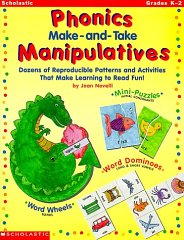 |
Phonics Make-and-Take Manipulatives
Author: Novelli,
Joan
ISBN: 0-590-86716-4
LCCN:
Dewey:
Number:
|
Category:
Language Experience Approach
User Rating: 4.5 Stars
Pages:
64
Paperback Scholastic
Book Description Dozens of Reproducible Patterns and Activities That Make
Learning to Read Fun! Put your students on the road to reading success with
these adorable, easy-to-make manipulatives. As students assemble mini-puzzles to
reinforce initial consonants, spin word wheels to teach blends, and play
dominoes to build an awareness of long and short vowel phonograms, they'll begin
to recognize the predictable sound/letter relationships that are so key to
reading success. Each playful learning tool is fully reproducible and comes with
warm-up and enrichment activities, book links, and ideas for interactive
bulletin boards. About the Author Joan Novelli is a former classroom teacher and
reading specialist. Her articles for parents, teachers, and children appear
regularly in Seseme Street Parents, Parent and Child and other magazines. Joan
is also a contributing editor to Instructor magazine and has edited many titles
for Scholastic Teaching Resources. She lives in South Burlington, Vermont.
Phonics from A to Z
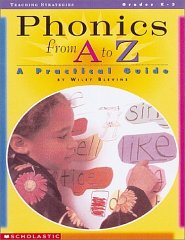 |
Phonics from A to Z
Author: Blevins, Wiley Lynch,
Judy
ISBN: 0-590-31510-2
LCCN:
Dewey:
Number:
|
Category:
Language Arts & Disciplines
User Rating: 4.5
Stars
Pages: 176
Paperback Teaching Resources
Book Description A Practical Guide Everything you wanted to know about
phonics but were afraid to ask! This practical handbook, written by an early
reading specialist, will show you how to build engaging, effective phonics
practice into your reading-writing program. Lots of ready-to-use lessons, word
lists, games and learning center ideas. About the Author Wiley Blevins is a
specialist in early reading who holds a Master of Education degree from Harvard
University. Wiley, a former elementary school teacher, has written and edited
many phonics and reading materials. He is the author of Quick and Easy Learning
Games: Phonics, and Phonemic Awareness Activities for Early Reading Success,
both published by Scholastic Teaching Resources.
Phonemic Awareness: Playing With Sounds to Strengthen Beginning Reading
Skills
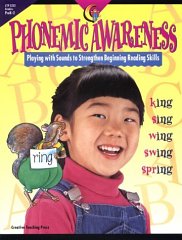 |
Phonemic Awareness: Playing With Sounds to Strengthen Beginning
Reading Skills
Author: Fitzpatrick, Jo Bauer, Karen
Dietzschold, Carol
ISBN: 1-57471-231-4
LCCN:
Dewey:
Number:
|
Category: Education / Teaching
User Rating: 5.0
Stars
Pages: 128
Paperback Creative Teaching Press
Product Description (Grades PreK - 2). This "must-have" resource for primary
teachers includes dozens of fun activities that help children listen to language
and play with sounds. Activity cards can be cut out and laminated to create a
handy reference file of fun ideas. A wide selection of reproducible (picture
cards, word cards, and manipulatives) included. 128 pages.
Phonemic Awareness in Young Children: A Classroom
Curriculum
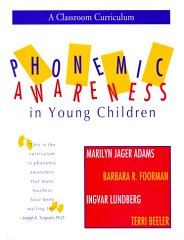 |
Phonemic Awareness in Young Children: A Classroom
Curriculum
Author: Adams, Marilyn Jager Foorman, Barbara R.
Lundberg, Ingvar Beeler, Terri Foorman, Barbara R.
ISBN:
1-55766-321-1
LCCN: 97021682
Dewey: 372.46/5
21
Number:
|
Category:
Curriculum planning & development
User Rating: 5.0
Stars
Pages: 208
Spiral-bound Brookes Publishing Company
Revue D'Orthophonie et D'Audiologie Use of this program in kindergarten
classrooms could result in the identification of children at risk... American
Educator This curriculum is an example of what we desperately need more of:
research-based theory in the classroom.
Paragraph Writing Made Easy
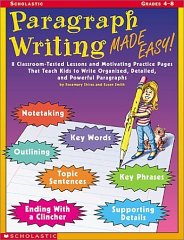 |
Paragraph Writing Made Easy
Author: Shiras, Rosemary
Smith, Susan
ISBN: 0-439-20764-9
LCCN:
Dewey:
Number:
|
Category: Elementary
User Rating: 4.5
Stars
Pages: 80
Paperback Scholastic Professional Books
Book Description 8 Classroom-Tested Lessons and Motivating Practice Pages
That Teach Kids to Write Organized, Detailed, and Powerful Paragraphs Boost
Writing Skills! Easy lessons and reproducible practice pages to teach paragraph
writing that really work!
On Solid Ground : Strategies for Teaching Reading K-3
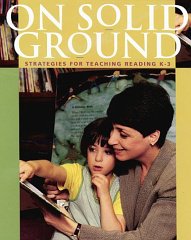 |
On Solid Ground : Strategies for Teaching Reading
K-3
Author: Taberski, Sharon Harwayne, Shelley (Foreword)
ISBN: 0-325-00227-4
LCCN: 00020275
Dewey:
372.41/6 21
Number:
|
Category: English language: reading skills
User Rating:
5.0 Stars
Pages: 304
Paperback Heinemann
Review �Sharon is the consummate teacher across the hall, willing to share
her best practice, her materials, her management, and most of all, the wisdom
she has acquired from years of devotion and study.��Shelley
Harwayne Product Description Sharon is the consummate teacher across
the hall, willing to share her best practice, her materials, her management, and
most of all, the wisdom she has acquired from years of devotion and study. -
Shelley Harwayne Enter Sharon Taberski's classroom and enter a world where
children take pride, take risks, and most of all, take reading seriously. It's
not utopia by any means; Sharon deals with the same issues other teachers face:
limited resources, tremendous diversity, and the constant threat of
overcrowding. What makes her exceptional is her clear vision. She is systematic
in her thinking, wise in her decision making. Most of all, she understands her
role as a teacher and goals for each student. This is why Sharon is on solid
ground. In her book, Sharon shares what she's gained in her twenty years of
working with children and teachers. It's organized not around a set of
prescribed skills, but around a series of interconnected interactions with the
learner: Assessment: Sharon begins by describing her procedures for assessing
children's reading and then using what she finds to inform her work. She covers
scheduling and managing reading conferences, taking oral-reading records, and
using retellings and discussions as tools. Demonstration: Once she has
identified strengths and needs, Sharon demonstrates strategies to help her
students become better readers. In this section, she explains how she uses
shared reading and read aloud as platforms for figuring out words and
comprehending texts, and explores small-group work - guided reading and
word-study groups - and teaching children one on one. Practice: Here, Sharon
describes how she uses independent reading as a time for practice, spelling out
the very active roles she and her students play. She also devotes a complete
chapter to matching children with books for independent reading. Response: It's
important for students to know they're doing well and where they must
concentrate their efforts. Sharon explains how her students use writing and
dialogue as tools to better understanding themselves as readers. On Solid Ground
is informed by current thinking, yet loaded with advice, booklists, ready-to-use
reproducibles, and - of course - the words and work of real children. Sharon's
approach is clear, sensible, timeless. You'll turn to her book throughout your
career.
An Observation Survey: Of Early Literacy Achievement
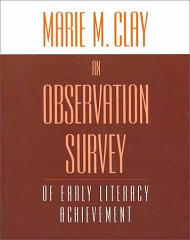 |
An Observation Survey: Of Early Literacy
Achievement
Author: Clay, Marie M.
ISBN:
0-435-08763-0
LCCN: 92046100
Dewey: 372.4/049
20
Number:
|
Category:
English language: reading skills
User Rating: 5.0
Stars
Pages: 93
Paperback Heinemann
Book Description An Observation Survey introduces teachers to ways of
observing children's progress in the early years of learning about literacy and
leads to the selection of children for whom supplementary teaching is necessary.
Nonfiction Craft Lessons: Teaching Information Writing
K-8
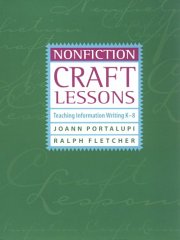 |
Nonfiction Craft Lessons: Teaching Information Writing
K-8
Author: Portalupi, Joann Fletcher, Ralph J. Fletcher,
Ralph J. Fletcher, Ralph J.
ISBN: 1-57110-329-5
LCCN:
2001017018
Dewey: 372.62/3044 21
Number:
|
Category:
Elementary
User Rating: 4.5 Stars
Pages: 148
Paperback Stenhouse Publishers
From the Publisher Writing nonfiction represents a big step for most
students. Most young writers are not intimidated by personal narrative, fiction,
or even poetry, but when they try to put together a "teaching book," report, or
persuasive essay, they often feel anxious and frustrated. JoAnn Portalupi and
Ralph Fletcher believe that young nonfiction writers supply plenty of passion,
keen interest, and wonder. Teachers can provide concrete strategies to help
students scaffold their ideas as they write in this challenging genre. Like the
authors' best-selling Craft Lessons: Teaching Writing K-8, this book is divided
into sections for K-2, 3-4, and middle school (grades 5-8) students. These
divisions reflect various differences between emerging, competent, and fluent
writers. In each section you'll find a generous collection of craft lessons
directed at the genre that's most appropriate for that particular age. In the
K-2 section, for example, a number of craft lessons focus on the all-about or
concept book. In the 3-4 section there are several lessons on biography. In the
5-8 section a series of lessons addresses expository writing. Throughout the
book each of the 80 lessons is presented on a single page in an easy-to-read
format. Every lesson features three teaching guidelines: Discussion--A brief
look at the reasons for teaching the particular element of craft specifically in
a nonfiction context. How to Teach It--Concrete language showing exactly how a
teacher might bring this craft element to students in writing conferences or a
small-group setting. Resource Material--Specific book or text referred to in the
craft lesson including trade books, or a piece of student writing in the
Appendixes. This book will help students breath voice into lifeless "dump-truck"
writing and improve their nonfiction writing by making it clearer, more
authoritative, and more organized. Nonfiction Craft Lessons gives teachers a
wealth of practical strategies to help students grow into strong writers as they
explore and explain the world around them. Synopsis Writing nonfiction
represents a big step for most students. Most young writers are not intimidated
by personal narrative, fiction, or even poetry, but when they try to put
together a "teaching book," report, or persuasive essay, they often feel anxious
and frustrated. JoAnn Portalupi and Ralph Fletcher believe that young nonfiction
writers supply plenty of passion, keen interest, and wonder. Teachers can
provide concrete strategies to help students scaffold their ideas as they write
in this challenging genre. Like the authors' best-selling Craft Lessons:
Teaching Writing K-8, this book is divided into sections for K-2, 3-4, and
middle school (grades 5-8) students. These divisions reflect various differences
between emerging, competent, and fluent writers. In each section you'll find a
generous collection of craft lessons directed at the genre that's most
appropriate for that particular age. In the K-2 section, for example, a number
of craft lessons focus on the all-about or concept book. In the 3-4 section
there are several lessons on biography. In the 5-8 section a series of lessons
addresses expository writing. Throughout the book each of the 80 lessons is
presented on a single page in an easy-to-read format. Every lesson features
three teaching guidelines: Discussion--A brief look at the reasons for teaching
the particular element of craft specifically in a nonfiction context. How to
Teach It--Concrete language showing exactly how a teacher might bring this craft
element to students in writing conferences or a small-group setting. Resource
Material--Specific book or text referred to in the craft lesson including trade
books, or a piece of student writing in the Appendixes. This book will help
students breath voice into lifeless "dump-truck" writing and improve their
nonfiction writing by making it clearer, more authoritative, and more organized.
Nonfiction Craft Lessons gives teachers a wealth of practical strategies to help
students gr
No Quick Fix: Rethinking Literacy Programs in America's Elementary Schools
(Language and Literacy Series
 |
No Quick Fix: Rethinking Literacy Programs in America's Elementary
Schools (Language and Literacy Series
Author: Allington,
Richard L. (Editor) Walmsley, Sean A. (Editor) Walmsley, Sean
ISBN: 0-8077-3388-1
LCCN: 94029705
Dewey:
372.6/0973 20
Number:
|
Category: English language: specific skills
User Rating:
5.0 Stars
Pages: 288
Paperback Teachers College Press
Description: This book suggests ways to improve literacy instruction for all
children, particularly those who are at risk and often do not succeed in today's
classroom. It responds to the growing consensus among researchers and educators:
that prevention of learning problems makes more sense than remediation.
My Printing Book-Contracted Editions
|
My Printing Book-Contracted Editions
Author: Olsen,
Jan Olsen, Jan Z.
ISBN: 1-891627-01-5
LCCN:
Dewey:
Number:
|
Category: Language Arts - Handwriting
User Rating:
5.0 Stars
Pages: 84
Paperback Handwriting Without Tears
Multicultural Manners: New Rules of Etiquette for a Changing
Society
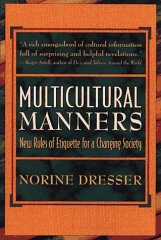 |
Multicultural Manners: New Rules of Etiquette for a Changing
Society
Author: Dresser, Norine
ISBN:
0-471-11819-2
LCCN: 96139921
Dewey: 395
20
Number:
|
Category:
Etiquette & entertaining
User Rating: 4.0 Stars
Pages:
304
Paperback Wiley
From Booklist "English Only" and anti-immigration folks won't like it, but
readers who hope with Rodney King that we can "all just get along" will want to
learn what Dresser--the Los Angeles Times' "Multicultural Manners"
columnist--has to teach. We don't all speak the same language or have the same
cultural assumptions; even caring, thoughtful people offend others
unintentionally. Dresser's longest section--on communication--addresses a broad
range of issues: body language, child-rearing practices, classroom behavior,
clothing, colors, gifts, luck and supernatural forces, foodways, male-female
relations, prejudice, time, and verbal expressions. Shorter chapters discuss
holidays and worship and health issues in terms of specific ethnic groups and
religious denominations. A longtime college ESL teacher, Dresser views her
subject as a folklorist or anthropologist, seeking to inform rather than to make
judgments; her style is lively and anecdotal. Given Los Angeles' demographics,
Dresser focuses on more recent immigrants, particularly those from Asia and
Latin America, rather than on groups that have been in the U.S. for generations.
Her advice will help businesspeople, teachers, neighbors--anyone who recognizes
the value of knowing about and respecting others' cultures. Mary Carroll Midwest
Book Review Multicultural Manners is an etiquette book which applies equally to
business and personal relationships, covering social interaction protocol among
people from different cultures and covering body language, word choices,
entertaining, and gift giving. Avoid problems at work and home with this
important guide.
Much More Than the ABC's: The Early Stages of Reading and
Writing
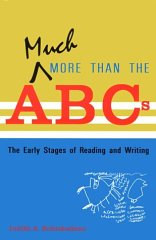 |
Much More Than the ABC's: The Early Stages of Reading and
Writing
Author: Schickendanz, Judith Children, National
Association for the Education of Young
ISBN:
0-935989-90-0
LCCN: 98088656
Dewey:
372.4
Number:
|
Category: Language Experience Approach
User Rating:
4.5 Stars
Pages: 164
Paperback National Association for the Education of You
"A 1999 NAEYC comprehensive membership benefit." Includes bibliographical
references and indexes.
Moving Forward With Literature Circles: How to Plan, Manage, and Evaluate
Literature Circles to Deepen Understanding and Foster a Love of
Reading
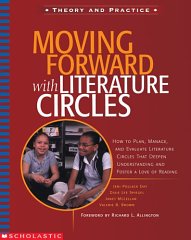 |
Moving Forward With Literature Circles: How to Plan, Manage, and
Evaluate Literature Circles to Deepen Understanding and Foster a Love of
Reading
Author: Day, Jeni Pollack Spiegel, Dixie Lee
McLellan, Janet Brown, Valerie B. Allington, Richard L.
ISBN:
0-439-17668-9
LCCN: 2002511204
Dewey: 372.41/62
21
Number:
|
Category:
Education
User Rating: 4.5 Stars
Pages: 176
Paperback Theory and Practice
Product Description There's no better way to deepen children's comprehension
and appreciation of books than with literature circles. But let's face it, it's
not always easy to plan, manage, and evaluate them-until now. Whether you're
starting from scratch or just looking for new ideas, Moving Forward with
Literature Circles provides all the tools you need-guidelines, minilessons,
booklists, checklists, and more-to maintain a successful program in your
classroom.
Motivating Recreational Reading and Promoting Home-School Connections:
Strategies from the Reading Teacher
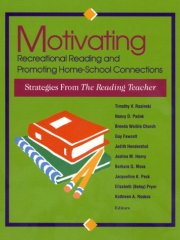 |
Motivating Recreational Reading and Promoting Home-School
Connections: Strategies from the Reading Teacher
Author:
Rasinski, Timothy V. (Editor) Padak, Nancy D. (Editor) Church, Brenda
Weible (Editor) Fawcett, Gay (Editor) Hendershot, Judith (Editor) Henry,
Justina M. (Editor)
ISBN: 0-87207-282-7
LCCN:
00058106
Dewey: 372.4 21
Number:
|
Category: English
language: reading skills
User Rating: 5.0 Stars
Pages:
156
Paperback Intl Reading Assn
Book Description Discover classroom-tested ideas, resources, and activities
to create motivational tools and home-school partnerships for making literacy
learning more effective and engaging. The innovative strategies in this
collection address a wealth of topics, including poetry, cooperative groups,
classroom libraries, multiculturalism, reading workshops, peer tutoring, reading
buddies and coaches, supporting parents and families, linking home and school,
and community involvement. The book also includes useful information on IRA
parent material, U.S. reading initiatives and programs, and IRA's "Choices"
booklists. ©2000 | 156 pp | ISBN: 0-87207-282-7 | 282-553 | Elementary From the
Back Cover Most educators recognize the importance of home-school connections,
especially for the development of engaged and enthusiastic readers. When the
home is involved, both reading achievement and children's love for reading
increase. Moreover, when successful home-school connections are made and
maintained, parents and teachers come to a greater appreciation and
understanding of the role of the other. Making a home-school reading connection
is a win-win-win situation--for readers, for parents and other family members,
and for teachers. Motivating Recreational Reading and Promoting Home-School
Connections: Strategies From The Reading Teacher presents the "best of the best"
classroom-tested ideas and approaches for increasing student motivation for
reading and for developing and maintaining home involvement in reading. The
articles in this volume have been drawn from the Teaching Reading department of
The Reading Teacher from 1993-1999; this section of the journal is devoted to
practical reading instruction strategies for classrooms, reading clinics, and
homes. The articles have been compiled by Timothy Rasinski and Nancy Padak,
editors of The Reading Teacher from 1993-1999, and their team of associate
editors. The ideas and strategies offered in Motivating Recreational Reading and
Promoting Home-School Connections offer ways to make reading motivation and home
involvement an integral part of your classroom reading program. This book is
part of the Teaching Reading Collection, a four-book set that also includes:
Teaching Word Recognition, Spelling, and Vocabulary: Strategies From The Reading
Teacher (ISBN: 0-87207-279-7) Developing Reading-Writing Connections: Strategies
From The Reading Teacher (ISBN: 0-87207-280-0) Teaching Comprehension and
Exploring Multiple Literacies: Strategies From The Reading Teacher (ISBN:
0-87207-281-9)
Mosaic of Thought: Teaching Comprehension in a Reader's
Workshop
 |
Mosaic of Thought: Teaching Comprehension in a Reader's
Workshop
Author: Zimmermann, Susan Keene, Ellin Oliver
ISBN: 0-435-07237-4
LCCN: 96053181
Dewey:
372.47 21
Number:
|
Category: English (ie as school subject)
User Rating:
4.0 Stars
Pages: 276
Paperback Heinemann
Review �You will be reluctant to set this book aside until you have
visualized, inferred, synthesized, and questioned the immediate application to
your classroom.��Kansas Journal of Reading Product
Description You will be reluctant to set this book aside until you have
visualized, inferred, synthesized, and questioned the immediate application to
your classroom. - Kansas Journal of ReadingHow do students become thoughtful,
independent readers who comprehend text at a deep level? To find the answers,
authors Keene and Zimmermann embarked on a journey into the thought processes of
proficient readers - a journey through poems and essays, classrooms and
workshops, humor and reflection. Mosaic of Thought chronicles that journey,
which ultimately led the authors to elaborate on eight cognitive processes
identified in comprehension research and used by successful readers. These serve
as models for the strategies offered in this book - strategies intended to help
children become more flexible, adaptive, independent, and engaged readers.
Mosaic proposes a new instructional paradigm focused on in-depth, explicit
instruction in the strategies used by proficient readers. The authors take us
beyond the traditional classroom into the literature based, workshop-oriented
classrooms. Through vivid portraits of these remarkable environments (all
participants in the Denver-based Reading Project of the Public Education ;
Business Coalition), we see how explicit instruction looks in dynamic,
literature-rich readers' workshops. As the students connect to background
knowledge, create sensory images, ask questions, draw inferences, determine
what's important, synthesize ideas, and solve problems at the word and text
level, they are able to construct a rich mosaic of meaning. Straightforward and
jargon-free, Mosaic of Thought has relevance to all literature-based classrooms,
regardless of level. It offers practical tools for inservice teachers, as well
as essential methods instruction for preservice teachers at both the
undergraduate and graduate level. Indeed, anyone interested in literacy will
benefit from the authors' challenge to rediscover the thought processes that
inform our own comprehension.
Month-by-Month Phonics for Upper Grades: A Second Chance for Struggling
Readers and Students Learning English
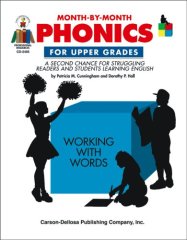 |
Month-by-Month Phonics for Upper Grades: A Second Chance for
Struggling Readers and Students Learning English
Author:
Cunningham, Patricia Hall, Dorothy P. Shanks, Gene Vaughn, Louise
(Editor)
ISBN: 0-88724-473-4
LCCN:
Dewey:
Number:
|
Category:
Education
User Rating: 4.5 Stars
Pages: 158
Paperback Four Blocks
Book Description This book offers monthly activities, sample lessons, and
word lists to help students become fluent decoders and spellers. Students will
learn how to apply reading and writing strategies.
Month-by-Month Phonics for Third Grade: Systematic, Multilevel Instruction
for Third Grade
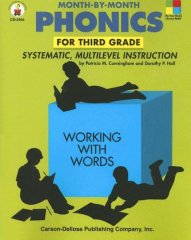 |
Month-by-Month Phonics for Third Grade: Systematic, Multilevel
Instruction for Third Grade
Author: Cunningham, Patricia
Hall, Dorothy P. Hall, Dorothy P.
ISBN:
0-88724-493-9
LCCN:
Dewey:
Number:
|
Category:
Education
User Rating: 5.0 Stars
Pages: 176
Paperback Four Blocks
Book Description This resource will help students learn to apply reading and
writing strategies, spell commonly-misspelled words, and more!
Month-by-Month Phonics for Second Grade: Systematic, Multilevel Instruction
for Second Grade
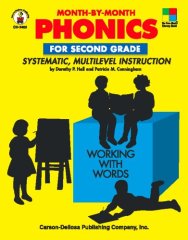 |
Month-by-Month Phonics for Second Grade: Systematic, Multilevel
Instruction for Second Grade
Author: Hall, Dorothy
Cunningham, Patricia M. Cunningham, Patricia M. Publishing, Carson Dellosa
ISBN: 0-88724-492-0
LCCN:
Dewey:
Number:
|
Category:
Education
User Rating: 5.0 Stars
Pages: 159
Paperback Four Blocks
Book Description This resource offers monthly activities, lessons, and word
lists to help second grade students become better readers and writers. Students
will learn to spell commonly-misspelled words and use spelling patterns.
Month-by-Month Phonics for First Grade: Systematic, Multilevel Instruction
for First Grade (Month-By-Month
 |
Month-by-Month Phonics for First Grade: Systematic, Multilevel
Instruction for First Grade (Month-By-Month
Author:
Cunningham, Patricia M. Hall, Dorothy McIntyre, Chris
ISBN:
0-88724-397-5
LCCN:
Dewey:
Number:
|
Category:
General
User Rating: 5.0 Stars
Pages: 130
Paperback Four Blocks
Book Description This month-by-month approach to a balanced literacy program
is packed with activities to reinforce interactive word-building and
pattern-decoding.
Modifying the Four Blocks for Upper Grades: Matching Strategies to Students'
Needs
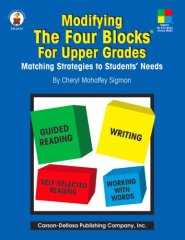 |
Modifying the Four Blocks for Upper Grades: Matching Strategies to
Students' Needs
Author: Sigmon, Cheryl M. Publishing, Carson
Dellosa
ISBN: 0-88724-659-1
LCCN:
Dewey:
Number:
|
Category:
Education
User Rating: 5.0 Stars
Pages: 240
Paperback Four Blocks
Book Description This book includes instructions for modifying strategies to
meet the needs of older students; fun, age-appropriate activities for each
block; tips on scheduling; reproducible to make implementation easier; and more.
Metaphors & Similes You Can Eat and 12 More Great Poetry Writing
Lessons
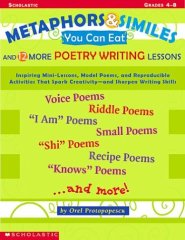 |
Metaphors & Similes You Can Eat and 12 More Great Poetry
Writing Lessons
Author: Protopopescu, Orel
ISBN:
0-439-44511-6
LCCN:
Dewey:
Number:
|
Category:
Elementary
User Rating: 5.0 Stars
Pages: 64
Paperback Teaching Resources
Book Description Inspiring Mini-Lessons, Model Poems, and Reproducible
Activities That Spark Creativity--and Sharpen Writing Skills Classroom tested!
Teaching poetry has never been so easy or inspiring! A poet in the schools
shares her classroom-tested lessons on metaphor, voice poems, "knows" poems,
recipe poems, poetry revision, and lots more. Includes model poems by well-known
poets, the author, and students. Also includes ready-to-use reproducibles. About
the Author Orel Protopopescu is a poet who also works in schools teaching poetry
writing to children. She has published several books of poems and poetry
translations. This is her first book for Scholastic Teaching Resources.
Meaningful Differences in the Everyday Experience of Young American
Children
 |
Meaningful Differences in the Everyday Experience of Young American
Children
Author: Hart, Betty Risley, Todd R.
ISBN: 1-55766-197-9
LCCN: 95003939
Dewey:
401/.93 20
Number:
|
Category: Sociology Of Children
User Rating: 4.5
Stars
Pages: 304
Hardcover Paul H Brookes Pub Co
Midwest Book Review This establishes a definite, studied link between early
childhood experiences and later intellectual development, providing a strong
study which focuses on American childhood experiences and which analyzes the
strong differences to be found between children at the same age levels. An
excellent, thought-provoking study. Senator Thomas Daschle ...alerts us to how
much each person's future intellectual ability hinges upon his or her experience
in the first year of life.
Matching Books to Readers: Using Leveled Books in Guided Reading,
K-3
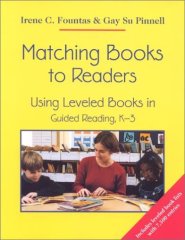 |
Matching Books to Readers: Using Leveled Books in Guided Reading,
K-3
Author: Fountas, Irene C. Pinnell, Gay Su
ISBN: 0-325-00193-6
LCCN: 00551708
Dewey:
372.4 21
Number:
|
Category: Pre-school & kindergarten
User Rating:
4.0 Stars
Pages: 416
Paperback Heinemann
Product Description Behind every successful reading program, you'll find a
skilled teacher who knows how to select "just the right" books for guided,
independent, and home reading. Now, with this practical new reference, the
best-selling authors of do the work for you, providing the most comprehensive,
up-to-date leveled reading list ever. Created with the input of hundreds of
early literacy teachers, Matching Books to Readers compiles more than seven
thousand caption books, natural language texts, series books, and children's
literature for kindergarten through grade three.Fountas and Pinnell have
significantly revised and expanded the original list of books featured in Guided
Reading, adding thousands of additional titles. Books are organized by title and
by level of difficulty. Word counts are provided for most books to assist
teachers as they take running records. To help teachers match the right book to
the reader, the authors consider text characteristics, including style, topic,
and format - with several hundred suggested titles for use at each level from
kindergarten through grade three. In addition to the book list itself, Matching
Books to Readers includes helpful descriptions of a leveled book collection and
how best to use it. There is information on using running records and benchmark
books for assessment, as well as equivalence charts that compare this list to
others. Other topics include how to create a school book room; how to create
classroom collections and how to select quality books; information on variously
priced starter sets and ordering guidelines; and how to acquire books. An
easy-to-use grant-writing guide is also included to make funding a rich book
collection a reality. No other leveled book list available today is as
exhaustive or informative. With Matching Books to Readers, Fountas and Pinnell
have made it easier than ever for teachers to teach students with texts that
both challenge and delight. About the Author IRENE C. FOUNTAS , a professor in
the School of Education at Lesley University in Cambridge, Massachusetts, has
been a classroom teacher, language arts specialist, and consultant in school
districts across the nation and abroad. She works extensively in the literacy
education field and directs the Literacy Collaborative in the School of
Education at Lesley University. Together with Gay Su Pinnell she hassauthored
numerous books, videos, and websites with Heinemann that are now considered
standards in the field of literacy instruction and staff development.sTheir
latest innovation is The Fountas and Pinnell Benchmark Assessment System, a
comprehensive assessment system for grades K - 8. Visit
http://www.fountasandpinnellbenchmarkassessment.com sfor details. Fountas and
Pinnellshavesinfluenced the classroom practices of teachers nationwide
throughsbestselling books such as: The Continuum of Literacy Learning, Grades K
- 8 (2007) The Continuum of Lite GAY SU PINNELL issa professor in the School of
Teaching and Learning at The Ohio State University. She has extensive experience
in classroom teaching and field-based research, and in developing comprehensive
approaches to literacy education. She has received the International Reading
Association's Albert J. Harris Award for research and the Charles A. Dana
Foundation Award for her contributions to the field of education. She is also a
member of the Reading Hall of Fame. Together with Irene Fountas she has authored
numerous books, videos, and websites with Heinemann that are considered
standards in the field of literacy instruction and staff development. Their
latest innovation is The Fountas and Pinnell Benchmark Assessment System , a
comprehensive assessment system for grades K - 8. Visit
fountasandpinnellbenchmarkassessment.com for details. Fountas and Pinnell have
influenced the classroom practices of teachers nationwide through bestselling
titles
Making Big Words: Multilevel, Hands-On Spelling and Phonics
Activities
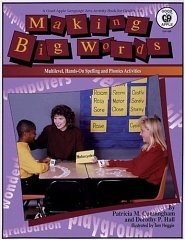 |
Making Big Words: Multilevel, Hands-On Spelling and Phonics
Activities
Author: Cunningham, Patricia M Hall, Dorothy P.
Heggie, Tom (Illustrator)
ISBN: 0-86653-807-0
LCCN:
Dewey:
Number:
|
Category: Education
User Rating: 5.0
Stars
Pages: 146
Paperback Frank Schaffer
Product Description Best Seller. This innovative book combines phonics and
spelling in 150 hands-on activities that will challenge children as they learn
new words and sort them by letter patterns, prefixes, suffixes, and big word
parts. With each lesson, students use pre-selected letters to make 15-20 words,
starting with short words and building up to longer words. And they discover
that changing just one letter or the sequence of letters in a word can change
its meaning. Includes guidelines for creating lessons to suit your specific
needs!
Make It Real: Strategies for Success with Informational
Texts
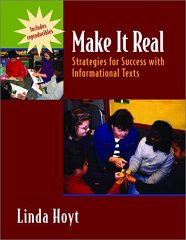 |
Make It Real: Strategies for Success with Informational
Texts
Author: Hoyt, Linda
ISBN:
0-325-00537-0
LCCN: 2002027515
Dewey: 372.6
21
Number:
|
Category:
English (ie as school subject)
User Rating: 5.0 Stars
Pages:
336
Paperback Heinemann
Product Description Feeding students a steady diet of fiction is all too
common in the classroom. Yet informational literacy is critical to success in
school and beyond. In Make It Real, Linda Hoyt provides a practical,
classroom-friendly guide to unlocking the treasures of informational text.
What's more, she demonstrates that reading and writing nonfiction can overcome
the gender gap, allowing girls and boys to share interests in any subject from
bugs and magnets to gardens and cake baking. Hoyt explains the use of a range of
instructional strategies, including shared and guided reading and writing, to
help students understand and use nonfiction material to answer questions about
the world around them. She shows teachers how to make texts more attainable,
scaffold vocabulary, and deal with content-specific words. Her simple
suggestions help you get started and maintain your course: having students write
about the visuals in their texts, infusing informational texts into guided
reading, then using these texts to teach reading strategies. For further help,
she includes throughout her book: teaching points reading strategies writing
exercises checklists, plans, reading logs, and other forms vignettes from
teachers across the country to serve as real-life models. Do a better job
linking up the curriculum. Teach skills and strategies applicable across content
areas. See students' natural curiosities aroused. Take the tips from Make It
Real, teach informational text, and hear comments like one from an enthusiastic
first grader, "We're learning about the world and learning how to read, too!"
About the Author Linda Hoyt has many years of experience teaching in elementary
classrooms. She has also worked as a reading specialist, a staff developer, a
curriculum specialist, and is currently a full-time consultant. Her special love
is creating environments where children engage as active participants in the
learning process.
Lively Discussions: Fostering Engaged Reading
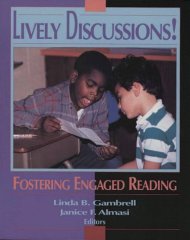 |
Lively Discussions: Fostering Engaged Reading
Author:
Gambrell, Linda B. (Editor) Almasi, Janice F. (Editor) Almasi, Janice
F.
ISBN: 0-87207-147-2
LCCN:
96017614
Dewey: 372.41 20
Number:
|
Category: Educational
psychology
User Rating: 5.0 Stars
Pages: 332
Paperback International Reading Association
Book Description Transform your classroom into an interactive environment
where students are empowered to share ideas and explore the wonderful world of
literature. "Lively Discussions!" not only emphasizes why classroom discussion
is important, but also offers "how to" advice on implementing specific
strategies. The contributors present excellent examples of children
participating in discussion activities that emphasize collaborating with others,
constructing meaning, and using a variety of texts to arrive at new
understandings. Through these activities that foster peer interactions, children
develop discussion skills and the confidence to discover new ideas within a
supportive environment. From the Back Cover "We have discussions so that if you
don't understand the story you might be able to understand it better if you talk
about it," This observation by Jimmy, a fourth-grade student, reinforces this
book's emphasis on the value of classroom discussion. The authors offer
practical, classroom based strategies teachers can use to promote literacy
development by allowing their students to play a larger role in their own
development as readers. The book presents many examples of children engaging in
discussion activities that emphasize collaborating, constructing meaning, foster
peer interaction, children develop discussion skills that allow them to explore
new ideas within the supportive environment of their peers. "Lively
Discussions!" Will appeal to all teachers working with developing readers in the
elementary classroom. This book expands on the possibilities of classroom
discussion to promote new interpretation and comprehension of text.
Literature-Based Workshops for Language Arts: Ideas for Active Learning
Grades K-2
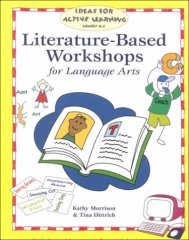 |
Literature-Based Workshops for Language Arts: Ideas for Active
Learning Grades K-2
Author: Morrison, Kathy Dittrich, Tina
ISBN: 1-57379-091-5
LCCN: 00044900
Dewey:
372.6 21
Number:
|
Category: Special Education - General
User Rating:
5.0 Stars
Pages: 222
Paperback High/Scope Pr
Includes bibliographical references and index.
Literature-Based Reading Activities
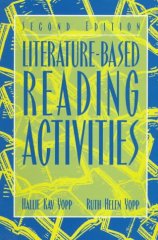 |
Literature-Based Reading Activities
Author: Yopp,
Hallie Kay Yopp, Ruth Helen
ISBN: 0-205-16387-4
LCCN:
95037380
Dewey: 372.6/4044 20
Number:
|
Category:
Linguistics
User Rating: 5.0 Stars
Pages: 160
Paperback Allyn & Bacon
From the Back Cover This book provides classroom teachers with activities for
developing and implementing a literature-based reading program. Numerous
activities and examples of their application to a variety of genre are provided.
Literature Pockets, Nonfiction
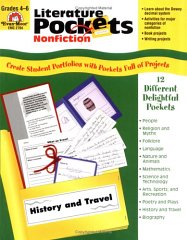 |
Literature Pockets, Nonfiction
Author: Norris, Jill
ISBN: 1-55799-823-X
LCCN:
Dewey:
Number:
|
Category:
Elementary
User Rating: 4.0 Stars
Pages: 96
Paperback Evan-Moor Educational Publishers
From the Publisher The first pocket presents the Dewey decimal system and
includes activities for finding books in the library. The remaining 11 pockets
present activities for various types of nonfiction as they are organized
according to the Dewey Decimal System: people, religion and myths, folklore,
language, nature and animals, mathematics, science and technology,
arts/sport/recreation, poetry and plays, history and travel, biography. Each
pocket includes an illustrated chart of a favorite nursery rhyme and art and
writing projects to extend the appreciation of the rhyme. The 12 rhymes included
are "Jack and Jill," "My Black Hen," "A Little Bird," "Little Miss Muffet,"
"Little Bo Peep, Take fun, exciting literature projects. Store them in labeled
construction paper pockets. Add a charming cover (we give you the patterns)
and?Voila, Literature Pockets! You couldn't find a more impressive way to create
portfolios to display what students Each book in the series contains 12 pockets
of activities. For every pocket there are reading, writing, and "make-it"
projects that extend the literature concept or book being studied. The completed
projects are an authentic assessment of what each studen Synopsis The first
pocket presents the Dewey decimal system and includes activities for finding
books in the library. The remaining 11 pockets present activities for various
types of nonfiction as they are organized according to the Dewey Decimal System:
people, religion and myths, folklore, language, nature and animals, mathematics,
science and technology, arts/sport/recreation, poetry and plays, history and
travel, biography. Each pocket includes an illustrated chart of a favorite
nursery rhyme and art and writing projects to extend the appreciation of the
rhyme. The 12 rhymes included are "Jack and Jill," "My Black Hen," "A Little
Bird," "Little Miss Muffet," "Little Bo Peep, Take fun, exciting literature
projects. Store them in labeled construction paper pockets. Add a charming cover
(we give you the patterns) and?Voila, Literature Pockets! You couldn't find a
more impressive way to create portfolios to display what students Each book in
the series contains 12 pockets of activities. For every pocket there are
reading, writing, and "make-it" projects that extend the literature concept or
book being studied. The completed projects are an authentic assessment of what
each studen
Literature Discussion Groups in the Intermediate Grades: Dilemmas and
Possibilities
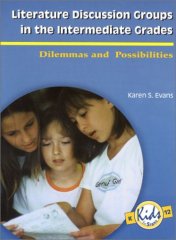 |
Literature Discussion Groups in the Intermediate Grades: Dilemmas
and Possibilities
Author: Evans, Karen S.
ISBN:
0-87207-293-2
LCCN: 2001000074
Dewey: 372.64/044
21
Number:
|
Category:
Language & Literature
User Rating: 4.5 Stars
Pages:
156
Paperback International Reading Association
Book Description "...Having a discussion beats paper! 'Cause papers don't
talk back!" (Ryan, fifth-grade student) The process of implementing literature
discussion groups in grades 3-5 can be difficult. Many students may be reluctant
to participate in this activity because they are accustomed to round-robin
reading and whole-class discussions followed by individual workbook exercises,
but these children may require extensive instructional support in order to learn
to participate in more independent discussions. Students' initial reluctance to
contribute can sometimes be frustrating to a teacher who truly believes in the
ability of literature discussions to create "grand conversations." In Literature
Discussion Groups in the Intermediate Grades: Dilemmas and Possibilities, author
Karen S. Evans describes how her strong belief in the value of literature
discussions helped her to deal with the dilemmas of introducing a new way of
"doing reading" to students in several different classrooms. Teachers are
invited to join in each step of the author's literature discussion group
journey-from choosing appropriate titles to integrating skills instruction and
finding workable assessment methods. Along the way, the pitfalls and
possibilities inherent in each step are discussed clearly and honestly, using
the voices of Evans's students to show their progression from hesitant
participants to strong, independent, and responsible speakers and learners. Use
these insights to support you on your journey as you navigate through the work
of integrating literature discussion groups in your own classroom. The rewards
will be well worth the effort. About the Author Karen S. Evans is an assistant
professor of Educational Policy and Leadership Studies in the School of
Education at Marquette University, Milwaukee, Wisconsin, USA.
Literature Circles: Voice and Choice in the Student-Centered
Classroom
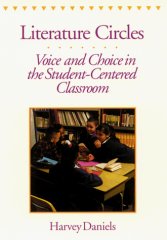 |
Literature Circles: Voice and Choice in the Student-Centered
Classroom
Author: Daniels, Harvey
ISBN:
1-55138-048-X
LCCN:
Dewey:
Number:
|
Category: English
literature: literary criticism
User Rating: 5.0 Stars
Pages:
200
Paperback Stenhouse Publishers
Language and Learning, June 1996 Overall this is a very readable book, one
which is a blend of theory and practice and which shows anyone interested in
knowing about literature circles what they are and how to use them. I have
really benefited tremendously from reading this book, the style is easy to
follow and Daniels writes in a light-hearted and yet compelling manner. As I
read the book, I found myself wanting to try out many of the ideas. Anyone
interested in engaging children in literary activities in a meaningful manner in
the classroom situation should read this book. English Journal, October 1995
Filled with practical ideas and clear explanations. Literature Circles is an
excellent choice for all teachers who want to organize student-led grouped
reading in their classes, encourage genuine discussion about books, and nourish
a love of reading. Daniels also introduces perhaps the most crucial aspect of
literature circles, the group roles. Role sheets for students to use appear in
Chapter 5; these are "blackline masters" for easy duplication. I particularly
appreciate that both English and Spanish versions are provided. While some
secondary and university level teachers may be put off by the "cuteness" of the
role names, I'm very taken with what students are asked to do. Consider what the
literature circle students are doing compared to students in the IRE class
mentioned above by Clamence McLaren.
Literacy Work Stations: Making Centers Work
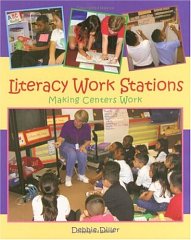 |
Literacy Work Stations: Making Centers Work
Author:
Diller, Debbie
ISBN: 1-57110-353-8
LCCN:
2003041568
Dewey: 372.6 21
Number:
|
Category:
Elementary
User Rating: 5.0 Stars
Pages: 218
Paperback Stenhouse Publishers
From the Publisher This new book will help teachers solve the dilemma: What
does the rest of my class do while I'm working with a small reading group?
Debbie Diller offers practical suggestions for over a dozen literacy work
stations that link to instruction and make preparation and management easy for
teachers. Learn how to set up work stations, how to manage them, and how to keep
them going throughout the year. Each chapter includes: how to introduce each
station; materials to include at each station; what to model; how to solve
problems; how to differentiate; how to assess and keep students accountable;
reflection questions for professional development. Materials in both English and
Spanish are provided in the extensive resource section. Throughout the book the
author has included photos of literacy workstations from a variety of classrooms
in which she has worked to illustrate the methods discussed in the text.
Synopsis This new book will help teachers solve the dilemma: What does the rest
of my class do while I'm working with a small reading group? Debbie Diller
offers practical suggestions for over a dozen literacy work stations that link
to instruction and make preparation and management easy for teachers. Learn how
to set up work stations, how to manage them, and how to keep them going
throughout the year. Each chapter includes: how to introduce each station;
materials to include at each station; what to model; how to solve problems; how
to differentiate; how to assess and keep students accountable; reflection
questions for professional development. Materials in both English and Spanish
are provided in the extensive resource section. Throughout the book the author
has included photos of literacy workstations from a variety of classrooms in
which she has worked to illustrate the methods discussed in the text.
Literacy Through Literature
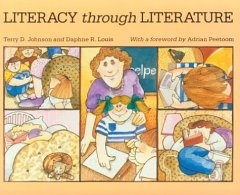 |
Literacy Through Literature
Author: Johnson, Terry D.
Louis, Daphne R. Louis, Daphne R.
ISBN:
0-435-08451-8
LCCN: 87014831
Dewey: 372.6
19
Number:
|
Category:
Elementary
User Rating: 5.0 Stars
Pages: 160
Paperback Heinemann
From the Publisher In recent years teachers have turned more and more to
children's literature to form the basis of their classroom language program.
They have recognized the importance of children reading literature that is
accessible in language and meaning, literature that "speaks to them." With
Literacy Through Literature, teachers will be better able to implement a
literature-based language program. It provides a feast of original ideas on
offering literature in the classroom as part of a whole language/literacy
program for children aged five to fifteen. Synopsis In recent years teachers
have turned more and more to children's literature to form the basis of their
classroom language program. They have recognized the importance of children
reading literature that is accessible in language and meaning, literature that
"speaks to them." With Literacy Through Literature, teachers will be better able
to implement a literature-based language program. It provides a feast of
original ideas on offering literature in the classroom as part of a whole
language/literacy program for children aged five to fifteen.
Literacy Instruction for Culturally and Linguistically Diverse Students: A
Collection of Articles and Commentaries
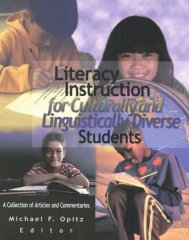 |
Literacy Instruction for Culturally and Linguistically Diverse
Students: A Collection of Articles and Commentaries
Author:
Association, International Reading (Corporate Author) Opitz, Michael
F. (Editor) Opitz, Michael F.
ISBN:
0-87207-194-4
LCCN: 98027561
Dewey: 370.117
21
Number:
|
Category:
English language
User Rating: 3.0 Stars
Pages: 336
Paperback International Reading Association
Book Description This compilation of journal articles provides novice and
veteran teachers with access to information that heightens understanding of
culturally and linguistically diverse learners. Articles are grounded in theory
yet offer clear explanations that show how this theory can be put into classroom
practice. They show the need to value and celebrate diversity, viewing diversity
as differences rather than deficiencies. From the Back Cover Now, more than
ever, educators face extraordinary challenges resulting from an increasingly
diverse student population. "Literacy Instruction for Culturally and
Linguistically Diverse Students" brings together articles from "The Reading
Teacher," Journal of Reading," and "Language Arts" to help teachers meet these
challenges. The compilation offers practical teaching strategies, highlights the
values of diversity and ways to capitalize on differences to benefit all
learners in the classroom, and shows how to use multicultural literature to
enhance reading instruction. The articles are grouped into the following parts:
Awareness and Attitudes Toward Literacy Principles of Instruction Enhancing
Reading Comprehension Using Writing to Develop Reading Selecting and Using
Multicultural Literature One of the many useful features of the book is that
each part is introduced by a well-known professional in the literacy field.
Also, an annotated bibliography of more than 100 recently published
multicultural books for children in grades K-5 is included, plus a chart that
shows the themes included in each book. "Literacy Instruction for Culturally and
Linguistically Diverse Students" will encourage both teachers and students to
value the differences that each cultural group brings to the classroom and view
these differences as springboards to learning.
Literacy Development in the Early Years
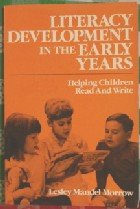 |
Literacy Development in the Early Years
Author:
Morrow, Lesley Mandel
ISBN: 0-13-386541-X
LCCN:
88025043
Dewey: 372.6 19
Number:
|
Category:
Schools
User Rating: 5.0 Stars
Pages: 240
Paperback Prentice Hall
From the Back Cover **********STUDENT EDITION ONLY*********** The Fifth
Edition Gets Better and Better: Maintaining past successful strategies and
infusing new cutting edge research, Literacy Development in the Early Years:
Helping Children Read and Write, Fifth Edition, emphasizes both constructivist
and explicit strategies for teaching literacy to young children within an
integrated language arts approach. With a thought-provoking and rich
presentation, renowned author, Lesley Morrow explores literacy development as an
active process between children and adults to create meaning and real purpose.
This edition spends more time with strategies for preschool literacy, and skill
development in grades K through 3. What Makes This Book the First of its Kind...
Increased coverage of assessment-A new separate chapter on assessment (Ch. 2)
and Strategies for assessment in all chapters. New chapter on Diversity (Ch. 3).
New ELL marginal annotations. New Ideas for Classroom Use. New emphasis on the
latest theories and research in early literacy development, including findings
from the National Reading Panel, Preventing Reading Difficulties, Reading First,
The Rand Report, and the implications of the No Child Left Behind Legislation.
Book Earns High Praise From Reviewers and Students "Students like this book. It
is easy to read and keeps their attention." Professor Becky Oekerman, University
of Texas of the Permian Basin "I like the stressing of the foundations of
literacy instruction. Also, the case studies are an interesting extra." Dr.
Edith A. Norris, West Texas A&M University "There is SO MUCH to deal with in
emerging literacy and this book addresses many of the issues relating to
emerging literacy. " Vikki Boatman, Stephen F. Austin State University Here are
some comments from students using Literacy Development in the Early Years:
Helping Children Read and Write: "Yes, the text was fantastic. I have shared it
with several teachers and they have expressed interest in obtaining one for
themselves. I plan to keep this book and use it as future reference. " "Yes, I
liked this text a lot. I kept it for future reference. I liked how it read, it
was not like normal text books (well some). I also really liked the sections
where it explained literacy centers. I think it would be excellent to use in a
future class. " Student quotes provided by Carol J. Nelson, Lewis-Clark State
College About the Author Lesley Mandel Morrow is a Professor at Rutgers
University's Graduate School of Education where she is coordinator of the
literacy program. Her area of research deals with early literacy development,
and the organization and management of Language Arts Programs. Dr. Morrow has
more than two hundred publications; one of her most recent book is The Literacy
Center: Contexts for Reading and Writing, 2nd edition. She served as President
of the International Reading Association in 2003-2004. ********EXAM COPY EDITION
ONLY*********** The Fifth Edition Gets Better and Better: Maintaining past
successful strategies and infusing new cutting edge research, Literacy
Development in the Early Years: Helping Children Read and Write, Fifth Edition,
emphasizes both constructivist and explicit strategies for teaching literacy to
young children within an integrated language arts approach. With a
thought-provoking and rich presentation, renowned author, Lesley Morrow explores
literacy development as an active process between children and adults to create
meaning and real purpose. This edition spends more time with strategies for
preschool literacy, and skill development in grades K through 3. What Makes This
Book the First of its Kind... Increased coverage of assessment-A new separate
chapter on assessment (Ch. 2) and Strategies for assessment in all chapters. New
chapter on Diversity (Ch. 3). New ELL marginal annotations. New Ideas for
Classroom Use. New emphasis on the latest theories and research in early
literacy development, including findings from the National Reading Panel,
Preventing Reading Di
The Literacy Center: Contexts for Reading and Writing
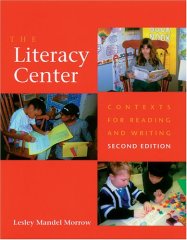 |
The Literacy Center: Contexts for Reading and
Writing
Author: Morrow, Lesley Mandel
ISBN:
1-57110-350-3
LCCN: 2002017593
Dewey: 372.6
21
Number:
|
Category:
Elementary
User Rating: 5.0 Stars
Pages: 214
Paperback Stenhouse Publishers
About the Author Lesley Mandel Morrow (Ph.D. Fordham University) is Professor
of Education and Coordinator of Graduate Early Childhood and Elementary Programs
at Rutgers University Graduate School of Education. A recipient of many awards
and a prolific author, she recently published Literacy Development in the Early
Years and Family Literacy Connections in Schools and Communities. Her many
professional and consulting positions include membership on the Board of
Directors of the International Reading Association. Lesley's research interests
center on early literacy development, family literacy, and the physical and
social contexts that motivate reading and writing. --This text refers to an out
of print or unavailable edition of this title.
Literacy at the Crossroads: Crucial Talk About Reading, Writing, and Other
Teaching Dilemmas
 |
Literacy at the Crossroads: Crucial Talk About Reading, Writing,
and Other Teaching Dilemmas
Author: Routman, Regie
ISBN: 0-435-07210-2
LCCN: 96012254
Dewey:
302.2/044 20
Number:
|
Category: Teaching skills & techniques
User Rating:
4.0 Stars
Pages: 240
Paperback Heinemann
Review �Regie's insight, practical suggestions, and can-do approach can't
help but inspire teachers - and parents! This was a real page turner for
me.��Patricia Broderick, Teaching K8 Product Description
Regie's insight, practical suggestions, and can-do approach can't help but
inspire teachers - and parents! This was a real page turner for me. - Patricia
Broderick, Teaching K8 From ill-informed politicians, parents, and news
reporters, the message is clear: whole language is to blame for illiteracy,
declining test scores, and poor spelling and grammar skills. But is whole
language - when accurately understood and practiced - truly at fault? Shouldn't
we first question the ways in which teachers are trained, students are assessed,
educators and parents are communicating, and funds are allocated? Literacy at
the Crossroads takes a hard look at these issues. By informing teachers about
what's really happening in our schools, Routman opens up the educational
dialogue and disproves some of the misconceptions that threaten good practice.
She describes and clarifies critical concerns, suggesting actions we must take
so that, in her words, "we can continue to do what's right and best for
children." True, there are problems with schools in America - but, according to
Routman, back-to-basics instruction is not the solution. What's needed are
teachers who are clear about their goals and outspoken about their beliefs. Here
is a book that shows them how.
Literacy Assessment: A Collection of Articles from the Australian Literacy
Educators' Association
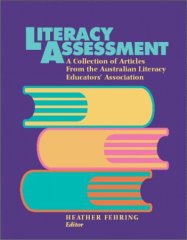 |
Literacy Assessment: A Collection of Articles from the Australian
Literacy Educators' Association
Author: Fehring, Heather
(Editor) Association, Australian Literacy Educators' (Corporate Author)
ISBN: 0-87207-004-2
LCCN: 2002154828
Dewey:
428/.007/1 21
Number:
|
Category: English language: reading skills
User Rating:
4.5 Stars
Pages: 199
Paperback International Reading Association
Book Description Editor: Heather Fehring In the last 10 years, the world has
witnessed a massive change to the nature of what it means to be literate.
Educators of English must ask themselves challenging questions, such as how can
we effectively assess students' literacies, and how can we ensure that the
assessment process empowers individuals? Although there are many stakeholders to
consider as educators perform and report on literacy assessments-students,
parents, colleagues, and government, to name a few-teachers must make informed,
consistent judgments regarding students' literacy achievement. This volume
presents articles published by the Australian Literacy Educators' Association
(ALEA) between 1992 and 2002. Editor Heather Fehring has chosen 19 articles that
present diverse viewpoints related to literacy assessment and reporting
practices. The articles, which encompass a range of grade levels from elementary
school to high school, explore literacy assessment from a theoretical
perspective, report on applicable research studies, discuss the implications of
standards and benchmarking, and demonstrate practical classroom implementation
of assessment and reporting techniques. Literacy Assessment provides a rich
resource of perspectives on the topic of literacy assessment, but more
important, it stresses the importance of teacher judgment in relation to
literacy assessment and reporting. This collection will give you the knowledge
to make informed judgments about the literacy assessments and reporting
practices in your own classroom. About the Author Heather Fehring is Associate
Professor in Literacy Assessment at Royal Melbourne Institute of Technology
University, Bundoora, Victoria, Australia
Leveling Books K-6: Matching Readers to Text
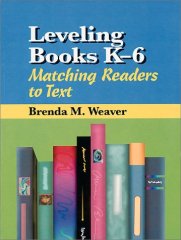 |
Leveling Books K-6: Matching Readers to Text
Author:
Weaver, Brenda M.
ISBN: 0-87207-267-3
LCCN:
00024182
Dewey: 372.4 21
Number:
|
Category: English
language
User Rating: 5.0 Stars
Pages: 76
Paperback International Reading Association
Book Description This book helps K-6 teachers match students' abilities to
texts and make informed choices about suitable books for use in the classroom.
It explains why leveling is important, describes the impact of new instructional
techniques on leveling, provides procedures for leveling, and reviews the most
widely used leveling systems available. The author presents a detailed
description of her own successful leveling system. From the Back Cover In recent
years, as elementary teachers have shifted from the use of basal readers to
literature or trade books, the task of how to match books to students' reading
levels-a process often referred to as book leveling-has become a common concern.
Leveling Books K-6: Matching Readers to Text will assist teachers in making
informed choices about which leveling system is appropriate, which books can be
used in instruction, and how the text level of books should be matched to the
reading abilities of students in the primary and intermediate grades. Author
Brenda Weaver discusses the need for leveling books and the dynamics involved in
this process. She explains the terminology involved in book leveling and takes
readers through each step of the process. Weaver discusses her own leveling
system, the Weaver Reading/Writing Stages, and compares it to other leveling
systems using the criteria of instructional focus, assessment, teacher
accessibility, disadvantages, and advantages. Finally, the author outlines a
plan of action for beginning the challenging task of leveling books. Leveling
Books K-6 will help both classroom teachers and administrators find ways to
customize their literature-based programs to fit the specific needs of their
students.
Leveled Books for Readers, Grades 3-6: A Companion Volume to Guiding Readers
and Writers
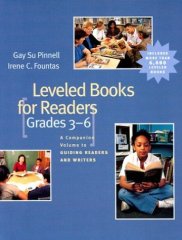 |
Leveled Books for Readers, Grades 3-6: A Companion Volume to
Guiding Readers and Writers
Author: Fountas, Irene C.
Pinnell, Gay Su Fountas, Irene C.
ISBN:
0-325-00307-6
LCCN: 2002280266
Dewey: 372.4
21
Number:
|
Category:
Education
User Rating: 4.0 Stars
Pages: 408
Paperback Heinemann
Product Description With this book, the authors build on their previous work,
extending leveled books up through the elementary grades and covering all the
different genres that are important to students. About the Author IRENE C.
FOUNTAS, a professor in the School of Education at Lesley University in
Cambridge, Massachusetts, has been a classroom teacher, language arts
specialist, and consultant in school districts across the nation and abroad. She
works extensively in the literacy education field and directs the Literacy
Collaborative in the School of Education at Lesley University. GAY SU PINNELL is
a professor in the School of Teaching and Learning at The Ohio State University.
She has extensive experience in classroom teaching and field-based research, and
in developing comprehensive approaches to literacy education. She has received
the International Reading Associations Albert J. Harris Award for research and
the Charles A. Dana Foundation Award for her contributions to the field of
education. She is also a member of the Reading Hall of Fame.
Letters and Numbers for Me-Contracted Edition
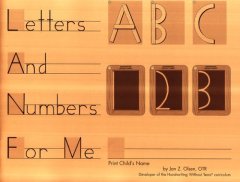 |
Letters and Numbers for Me-Contracted Edition
Author:
Olsen, Jan Olsen, Jan Z.
ISBN:
1-891627-10-4
LCCN:
Dewey:
Number:
|
Category:
Handwriting
User Rating: 4.5 Stars
Pages: 72
Paperback Handwriting Without Tears
Let's Write
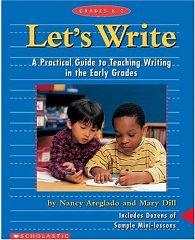 |
Let's Write
Author: Dill, Mary Areglado, Nancy Dill,
Mary
ISBN: 0-590-93102-4
LCCN:
97198078
Dewey: 372.62/3 21
Number:
|
Category:
Elementary
User Rating: 5.0 Stars
Pages: 160
Paperback Scholastic
Book Description A Practical Guide to Teaching Writing in the Early Grades
Packed with ideas from kindergarten, first- and second-grade teachers, this book
will help set up an exciting and effective writing program. From time-saving
tips on conferences to fresh ideas for writing across the curriculum, this
resource combines everything the teacher needs in one volume. Includes sample
mini-lessons on the mechanics of writing and classroom-proven methods to inspire
beginning writers. About the Author Mary Dill is principal of Rolling Valley
Elem., (K-6) in Fairfax County, VA, where she implemented the integrated
language arts philosophy throughout the school. Ms. Dill's professional career
includes primary teacher, resource teacher, coordinator of the
gifted-and-talented program, and human-relations specialist. Nancy Areglado is a
reading specialist at Rolling Valley Elem. She is an independent language arts
consultant and presents nationally. In the summer months, she is a consultant
for the Bill Martin Pathways to Literacy conferences. Both authors have
published numerous articles in educational journals.
Let's Learn About Story Elements: Plot
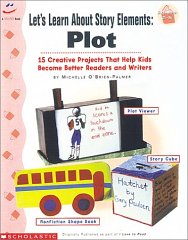 |
Let's Learn About Story Elements: Plot
Author:
O'Brien-Palmer, Michelle Stephens, Heidi
ISBN:
0-590-10716-X
LCCN:
Dewey:
Number:
|
Category: Teaching
Methods & Materials - Reading
User Rating: 4.0 Stars
Pages:
64
Paperback Scholastic
Book Description 15 Creative Projects That Help Kids Become Better Readers
and Writers Engaging art and writing activities. Invite your students to
celebrate reading and learn about plot. These kid-tested projects come complete
with simple how-tos, ready-to-go reproducibles, and student samples. Originally
published as part of I Love to Read. About the Author Michelle O'Brien-Palmer
received her undergraduate and graduate degrees at the University of Washington.
She is an educational consultant and speaker. Michelle always includes children
in the creation of her books.
Learning to Learn in a Second Language
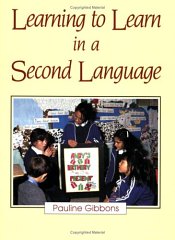 |
Learning to Learn in a Second Language
Author:
Gibbons, Pauline
ISBN: 0-435-08785-1
LCCN:
92040291
Dewey: 428/.007 20
Number:
|
Category: Language
teaching theory & methods
User Rating: 5.0 Stars
Pages:
128
Paperback Heinemann
Review �[This] is a readable resource book which elementary bilingual
teachers will find both insightful and practical.��ESLEJ
Product Description [This] is a readable resource book which elementary
bilingual teachers will find both insightful and practical. - ESLEJ Children
from language backgrounds other than English represent a quarter of all our
school population. Learning to Learn in a Second Language has been written
specifically for all teachers of children for whom English is a second language,
although it will be equally helpful to teachers of English speaking children.
The book is based on the assumption that the classroom program is a major
resource for language development, and that a responsive program takes into
account the fact that children are not only learning a new language, but that
they are learning in that language as well. It exemplifies current theories of
second language development through a wide range of strategies and practical
suggestions for the classroom teacher.
Learning Phonics and Spelling in a Whole Language
Classroom
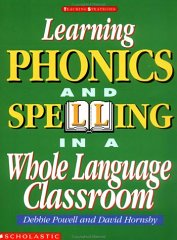 |
Learning Phonics and Spelling in a Whole Language
Classroom
Author: Powell, Debbie Hornsby, David
ISBN: 0-590-49148-2
LCCN: 94199877
Dewey:
372.4/145 20
Number:
|
Category: Elementary School Language Arts
User Rating:
4.5 Stars
Pages: 168
Paperback Scholastic
Book Description Here's help in teaching phonics and spelling in an
integrated language arts classroom. Includes specific strategies: word sorts,
clusters, cumulative charts, word webs, and more. With charts, checklists, and
student samples.
Learning from Teaching in Literacy Education: New Perspectives on
Professional Development
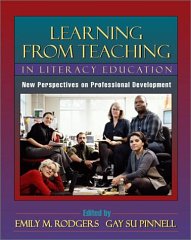 |
Learning from Teaching in Literacy Education: New Perspectives on
Professional Development
Author: Pinnell, Gay Su Rodgers,
Emily M.
ISBN: 0-325-00483-8
LCCN:
2002006124
Dewey: 428.4/071/5 21
Number:
|
Category: Language
learning: specific skills
User Rating: Pages: 208
Paperback Heinemann
Product Description Nearly every public school teacher in the United States
takes part in some form of professional development, according to the U.S.
Department of Education's statistics. Yet very little is known about if and how
these sessions bring about real change to instruction. In this book, Emily
Rodgers and Gay Su Pinnell provide insights into the complexity of providing
effective professional development for literacy educators and the challenges of
bringing about fundamental change to literacy instruction. In each chapter,
educatorsincluding Billie J. Askew, Yvonne Rodriquez, and Carol Lyonsshare their
research-based findings about the structure of an effective professional
development program for literacy teachers. Some chapters connect professional
development initiatives to student outcomes. Others focus on changes in
teachers' instructional practices and growing understandings about literacy
development. All chapters clearly report the practical implications of
professional development that are relevant to anyone interested in literacy
education. The research and experience represented in these chapters encompass
many varied models and settings. What binds them together is a common theme:
true expertise means developing internal systems for learning while teaching and
teaching while learning. Whether you are a classroom teacher, a school
administrator, a staff developer, a college professor, or a teacher in training,
there is much to be learned from Learning from Teaching. About the Author Gay Su
Pinnell is a professor in the School of Teaching and Learning at The Ohio State
University. She has extensive experience in classroom teaching and field-based
research, and in developing comprehensive approaches to literacy education. She
has received the International Reading Association's Albert J. Harris Award for
research and the Charles A. Dana Foundation Award for her contributions to the
field of education. She is also a member of the Reading Hall of Fame. Together
with Irene Fountas she has authored numerous books, videos, and websites with
Heinemann that are considered standards in the field of literacy instruction and
staff development. Their latest innovation is The Fountas and Pinnell Benchmark
Assessment System, a comprehensive assessment system for grades K - 8. Visit
fountasandpinnellbenchmarkassessment.com for details. Fountas and Pinnell have
influenced the classroom practices of teachers nationwide through bestselling
titles such as: The Continuum o Emily M. Rodgers is an assistant professor in
the College of Education at The Ohio State University. Before joining OSU, Emily
was a teacher for ten years in Newfoundland. Her research focuses on the
professional development of teachers and the nature of effective scaffolding of
literacy learning. Her paper "Language Matters: When is a Scaffold Really a
Scaffold" won the National Reading Conference's Outstanding Student Research
Award in 1999.
Language Study in Middle School, High School, and Beyond: Views on Enhancing
the Study of Language
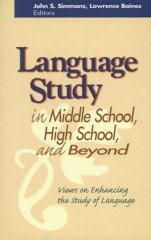 |
Language Study in Middle School, High School, and Beyond: Views on
Enhancing the Study of Language
Author: Simmons, John S.
(Editor) Baines, Lawrence (Editor) Simmons, Johns S. Baines, Lawrence
ISBN: 0-87207-182-0
LCCN: 97039591
Dewey:
428/.0071/2 21
Number:
|
Category: Language, Literature And Biography
User Rating:
4.5 Stars
Pages: 240
Paperback International Reading Association
Book Description The contributors to this book believe that language should
be the central focus for study in the reading and language arts classroom and
that gaining mastery over language can be stimulating , enlightening, and
enjoyable. The text presents 10 diverse viewpoints on language study that are
divided into the following areas: studying language through literature and the
arts, using writing and speaking to study language, language use in different
academic settings, and emerging trends in language study. All the chapters
recommend that language study be connected to students' lives in visceral as
well as rational ways. From the Back Cover The contributors to "Language Study
in Middle School, High School, and Beyond" believe that language should be the
central focus for study in the reading and language arts classroom and that
gaining mastery over language can be stimulating , enlightening, and enjoyable.
This volume presents 10 diverse viewpoints on language study that are divided
into the following areas: studying language through literature and the arts,
using writing and speaking to study language, language use in different academic
settings, and emerging trends in language study. All the chapters recommend that
language study be connected to students' lives in visceral as well as rational
ways. "Language Study in Middle School, High School, and Beyond" will appeal to
English language arts teachers who agree that students can learn nothing more
valuable in school than a mastery over language.
Language and Reading Success
 |
Language and Reading Success
Author: Biemiller,
Andrew
ISBN: 1-57129-068-0
LCCN:
99012368
Dewey: 372.62/2 21
Number:
|
Category: Elementary
School Language Arts
User Rating: 4.0 Stars
Pages: 75
Paperback Brookline Books
Product Description This book incisively presents recent research in the area
of language development and relates those findings to practices that parents and
teachers can implement at home and in classrooms with theor own children and
students.
Knee to Knee, Eye to Eye: Circling in on Comprehension
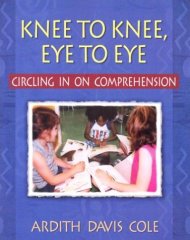 |
Knee to Knee, Eye to Eye: Circling in on
Comprehension
Author: Cole, Ardith Davis
ISBN:
0-325-00494-3
LCCN: 2002155230
Dewey: 372.47
21
Number:
|
Category:
English language
User Rating: 5.0 Stars
Pages: 176
Paperback Heinemann
Product Description Imagine this: First graders analyzing texts, critiquing
ideas, debating points, and making connections.Third graders sharing analogies
between slaves' lives in the 1800s and their own.Fifth graders synthesizing
elements of foreshadowing before the term is even mentioned. This is what
literature conversations are all about. And this is what Ardith Cole writes
about in this book, a comprehensive, inspiring guide to the art and practice of
literature conversations. Cole is committed to literature conversations because
she has watched them change lives and perspectives, build confidence and
compassion, and produce dramatic consequences, both in and out of the classroom.
That's why she wants teachers to understand the importance of teaching children
how to talk about their reading. In Knee to Knee, Eye to Eye Cole addresses
text, organization, management, assessment, and the tremendous amount of
learning that occurs through the powerful, engaging combination of books and
talk. Most important, she offers a step-by-step guided comprehension process in
which teachers have students: observe, analyze, and investigate the workings of
a real conversation "wonder" with a partner after a read-aloud refine content
and behaviors in one large literature conversation use the process in a small
group without the teacher's presence read independently for conversation grist
that will later drive interactions and assessments. Because dialogue is critical
to this process, the book features plentiful examples to demonstrate the higher
levels of thinking and rich discussions that occur as students move into
constructing their own knowledge. An appendix includes textual resources to use
during read-aloud modeling lessons and sample conversation transcriptions that
are handy examples for instruction and assessment. Create a conversation
community in your classroom. Invite your students into this culture of focused
talk. Build relationships between and among students. And watch as they develop
deep, reflective conversations as reading becomes an adventure in learning.
About the Author Ardith Davis Cole has 30 years of public school experience in a
range of capacities, from classroom teacher to literacy specialist. She has also
worked with teachers as a literacy consultant, a university adjunct, and an
officer in professional literacy organizations. A recipient of numerous
professional awards, including the University of Buffalo's Outstanding Alumni
Award for the Year 2000, she is the author of Better Answers: Written
Performance That Looks Good and Sounds Smart and Literacy Activities for
Building Classroom Communities. Read Ardith's article - "It's the Teacher, Not
the Program" - which appeared in Education Week (Vol. 22, No. 26, March 12,
2003).
Kids InSight: Reconsidering How to Meet the Literacy Needs of All
Students
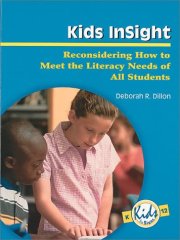 |
Kids InSight: Reconsidering How to Meet the Literacy Needs of All
Students
Author: Dillon, Deborah R.
ISBN:
0-87207-265-7
LCCN: 00035103
Dewey: 373.1102
21
Number:
|
Category:
English language
User Rating: 5.0 Stars
Pages: 208
Paperback International Reading Association
Book Description Author Deborah Dillon shows the qualities of insightful
teachers through the interpretation of research and the analysis of classroom
vignettes. The author challenges herself and all educators to develop the
vision, knowledge base, and skills that will allow teachers to meet the needs of
all learners. This book, the foundational book in the Kids InSight series, also
outlines the overarching goals and common features that run throughout the
series. From the Back Cover Kids InSight is a new book series that brings to the
foreground stories about children and adolescents as the basis for K-12
teachers' instructional decisions. Kids InSight: Reconsidering How to Meet the
Literacy Needs of All Students is the first book in the series, the foundation
on which the future volumes will build. Author Deborah Dillon begins by
explaining the goals of the Kids InSight series, then highlights the threads
that will run throughout all books in the series. Next she presents the goals of
the book: to encourage teachers to reflect on and reconsider their instruction,
to change their focus to their students, to view their students' actions in
light of new data, and to renew their teaching efforts. The chapters discuss in
detail the different requirements of being an insightful teacher; report the
author's experiences conducting research in two classrooms; and detail the
interactions of the teachers and students in these classrooms, explaining what
makes these teachers insightful. Interspersed throughout this book and others in
the Kids InSight series are Reflection Points, which ask the reader to reflect
on his or her own practice, allowing for consideration of personal philosophies
and strategies for teaching literacy. This book and others in the Kids InSight
series will challenge teachers to focus on students as individuals and as
learners. When students are placed in the foreground, teachers are able to glean
insights about who their students are, what they know, how they learn, and what
can be done to support them. Other books in the Kids InSight series are, Looking
Through the Faraway End: Creating a Literature-Based Reading Curriculum With
Second Graders, by Lee Galda, Shane Rayburn, and Lisa Cross Stanzi (ISBN:
0-87207-263-0), and "All the Stories That We Have": Adolescents' Insights About
Literacy and Learning in Secondary Schools, by Elizabeth Birr Moje (ISBN:
0-87207-264-9).
It's Never Too Late: Leading Adolescents to Lifelong
Literacy
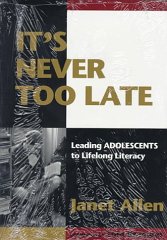 |
It's Never Too Late: Leading Adolescents to Lifelong
Literacy
Author: Allen, Janet Romano, Tom
ISBN:
0-435-08839-4
LCCN: 94041022
Dewey: 428.4/071/2
20
Number:
|
Category:
English language: reading skills
User Rating: 4.5
Stars
Pages: 240
Paperback Heinemann
Review �Any teacher of general English could read It's Never Too Late and
know that he or she is definitely not alone.��English Journal
Product Description Any teacher of general English could read It's Never Too
Late and know that he or she is definitely not alone. - English Journal It's
Never Too Late is a research chronicle that offers not only proven methods but
also inspiration. Anyone working with "at risk" students - those for whom school
has not been a place of success - will find here a reflection of their own
experiences, plus thoughtful and creative strategies for making those
experiences positive ones. When Janet Allen, a respected lecturer, researcher,
and award-winning teacher, began teaching in 1972, she was wholly unprepared for
the challenges she encountered: motivating the unmotivated, developing a
curriculum with no models to draw from, building an environment that supported
strategic learning, finding creative resources with limited means, and dealing
with reluctant, even rebellious students. More daunting, perhaps, was the
challenge of constantly rekindling her own fervor for teaching. But she
persevered and found ways to break through those obstacles. It's Never Too Late
is at once a story and a "how to" book. Readers will find absorbing case
studies, photographs, quotes from educators, surveys, activities, and step
by-step strategies for teaching reading and writing to the most reluctant middle
and secondary school students. Most important, they will find affirmation for
the powerful role they play as teachers.
Issues and Trends in Literacy Education
|
Issues and Trends in Literacy Education
Author:
McKenna, Michael C. (Editor) Wedman, Judy M. (Editor) Robinson,
Richard David (Editor)
ISBN: 0-205-16146-4
LCCN:
95023601
Dewey: 372.6/044 20
Number:
|
Category:
Literacy
User Rating: 5.0 Stars
Pages: 352
Paperback Allyn & Bacon
Book Description Issues and Trends in Literacy Education, Second Edition, is
a unique, friendly reference designed to provide necessary information needed by
both pre-service and in-service educators to better understand the various
viewpoints in the ever-changing field of literacy education. Current topics of
interest are identified with articles, related references, discussion questions,
application ideas and an annotated bibliography of related resources. After
using this book, students will be well versed in reading education and will be
able to decide upon and articulate their own informed approach to reading
education. For readers interested in literacy education. --This text refers to
an out of print or unavailable edition of this title. From the Back Cover This
unique reference provides the necessary information needed by both preservice as
well as inservice educators to better understand and study the field of literacy
education. Each of eleven chapters is based on a critical issue in the field of
literary education, with topics such as whole language, literacy assessment,
phonics, emergent literacy, and technology.
Inviting Children's Responses to Literature: Guides to 57 Notable
Books
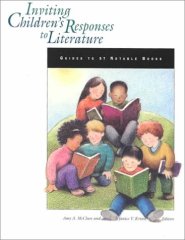 |
Inviting Children's Responses to Literature: Guides to 57 Notable
Books
Author: McClure, Amy A. (Editor) Kristo, Janice V.
(Editor)
ISBN: 0-8141-2379-1
LCCN:
93046088
Dewey: 372.64 20
Number:
|
Category:
Elementary
User Rating: 5.0 Stars
Pages: 145
Paperback National Council of Teachers of English
From Booklist In the style of Book Links magazine, this is an excellent guide
for library-classroom cooperation. For each of 57 books, there's a suggested
grade level (preschool through middle school), a plot summary, teaching
suggestions, and a list of related books. The layout is clear and attractive,
with each book discussion taking up one or two pages. The books are great, from
Paula Fox's One-Eyed Cat (1984) to Alexandra Day's Frank and Ernest (1988) to
Virginia Hamilton's People Could Fly (1985), and exhibit a range of cultures,
genres, and reading levels. Many of the contributors teach children's
literature. They don't push for any "right" answer. Their open-ended questions
will stimulate discussion and personal response and make kids want to read more.
Hazel Rochman
Invitations: Changing As Teachers and Learners K-12
|
Invitations: Changing As Teachers and Learners
K-12
Author: Routman, Regie
ISBN:
0-435-08578-6
LCCN: 91009304
Dewey: 372.4/1
20
Number:
|
Category:
Language teaching theory & methods
User Rating: 5.0
Stars
Pages: 672
Paperback Heinemann
Product Description This book is becoming my bible. - Instructor With this
remarkably complete and well-organized resource, Regie Routman invites all
teachers to reflect upon their practice, and in doing so, she makes whole
language teaching and learning possible for everyone. The text provides in-depth
information, as well as step-by-step demonstration lessons for topics such as:
becoming a whole language teacher; shared reading and shared writing for all
grades; guided reading - whole class, small group, and individualized; grouping
for success; examining a basal story and using it holistically; developing
literature extension activities; responding to literature through literature
response logs and discussion groups; setting up an independent reading program;
journal writing; teaching phonics and skills strategically; letter writing and
story writing for authentic purposes; integrating spelling into the
reading-writing classroom; getting the publishing process going; integrating the
language arts through literature and across the curriculum; understanding and
utilizing meaningful evaluation procedures - anecdotal records, grading, and
self-evaluation; applying holistic strategies to L.D. and "at-risk" students;
organizing and managing the whole language classroom; establishing teacher
support groups and other networks. With the Blue Pages bound in, Invitations is
the most exhaustive resource available for any teacher interested in
professional development and changing his or her teaching. --This text refers to
the Paperback edition.
Infotext: Reading & Learning
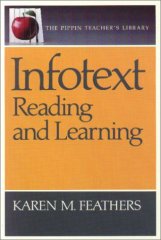 |
Infotext: Reading & Learning
Author: Feathers,
Karen M.
ISBN: 0-88751-056-6
LCCN:
94162692
Dewey: 428.4/3 20
Number:
|
Category: Language
teaching theory & methods
User Rating: 5.0 Stars
Pages:
144
Paperback Pippin Publishing
-- Curriculum Materials "...for the teacher with little experience in
teaching reading skills...practical, easy to read. Valuable for teachers and
parents." Susan M. Blair-Larsen at Trenton State College "...a unique addition
to the school professional library."
Informational Text in K-3 Classrooms: Helping Children Read and
Write
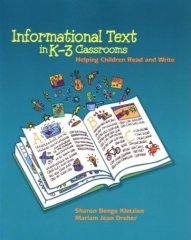 |
Informational Text in K-3 Classrooms: Helping Children Read and
Write
Author: Kletzien, Sharon Benge Dreher, Mariam Jean
ISBN: 0-87207-537-0
LCCN: 2003017361
Dewey:
372.6 22
Number:
|
Category: English language: reading skills
User Rating:
5.0 Stars
Pages: 168
Paperback International Reading Association
Product Description Increasing evidence shows that young children benefit
from reading instruction that includes informational text. Educational
organizations, U.S. state mandates, and standardized tests all call for children
to effectively read information, yet emphasis on using story text with young
readers persists in the early literacy community. Teachers who are unsure about
how to integrate informational text into their instruction will find expert
guidance in this book, which demonstrates the effectiveness of this text in
early reading instruction. Authors Kletzien and Dreher provide suggestions for
developing classroom libraries and choosing quality informational text that can
be used with all children in a variety of settings, such as inclusive classrooms
and self-contained special education classrooms. The authors guide teachers in
choosing informational books at appropriate reading levels for their students,
featuring them in class read-alouds, and using them to teach comprehension,
writing, and search strategies. Informational Text in K–3 Classrooms: Helping
Children Read and Write provides ways in which teachers can strive for and
maintain a more equal balance of fiction and informational text in the
classroom.
Independent Reading Management Kit
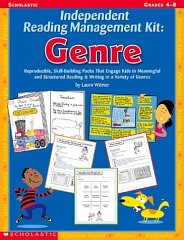 |
Independent Reading Management Kit
Author: Witmer,
Laura
ISBN: 0-439-44514-0
LCCN:
Dewey:
Number:
|
Category:
Education
User Rating: 5.0 Stars
Pages: 112
Paperback Teaching Resources
From the Publisher Ready to use literature response and writing activities
help boost reading comprehension and build key reading and writing skills.
Synopsis Ready to use literature response and writing activities help boost
reading comprehension and build key reading and writing skills.
In the Middle: New Understanding About Writing, Reading, and
Learning
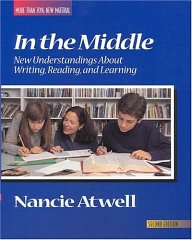 |
In the Middle: New Understanding About Writing, Reading, and
Learning
Author: Atwell, Nancie Newkirk, Thomas Graves,
Donald H.
ISBN: 0-86709-374-9
LCCN:
97051627
Dewey: 428/.0071/2 21
Number:
|
Category: English
language: specific skills
User Rating: 5.0 Stars
Pages:
560
Paperback Boynton/Cook
Review �The best way to teach is to learn together with the students. One of
the rare breed of teachers who do know this is Nancie Atwell.��The New
York Times �Reading this book can be revolutionary. . . . Atwell leads
us to new understandings of teaching and learning in a workshop
classroom.��Voices from the Middle Product Description The
best way to teach is to learn together with the students. One of the rare breed
of teachers who do know this is Nancie Atwell. - The New York Times Reading this
book can be revolutionary. . . . Atwell leads us to new understandings of
teaching and learning in a workshop classroom. - Voices from the Middle When
first published in 1987, this seminal work was widely hailed for its honest
examination of how teachers teach, how students learn, and the gap that lies in
between. In depicting her own classroom struggles, Nancie Atwell shook our
orthodox assumptions about skill-and-drill-based curriculums and became a
pioneer of responsive teaching. Now, in the long awaited second edition, Atwell
reflects on the next ten years of her experience, rethinks and clarifies old
methods, and demonstrates new, more effective approaches. The second edition
still urges educators to "come out from behind their own big desks" to turn
classrooms into workshops where students and teachers create curriculums
together. But it also advocates a more activist role for teachers. Atwell
writes, "I'm no longer willing to withhold suggestions and directions from my
kids when I can help them solve a problem, do something they've never done
before, produce stunning writing, and ultimately become more independent of me."
More than 70 percent of the material is new, with six brand-new chapters on
genres, evaluation, and the teacher as writer. There are also lists of several
hundred minilessons, and scripts and examples for teaching them; new
expectations and rules for writing and reading workshops; ideas for teaching
conventions; new systems for record keeping; lists of essential books for
students and teachers; and forms for keeping track of individual spelling,
skills, proofreading, homework, writing, and reading. The second edition of In
the Middle is written in the same engaging style as its predecessor. It reads
like a story - one that readers will be pleased to learn has no end. As Atwell
muses, "I know my students and I will continue to learn and be changed. I am
resigned - happily - to be always beginning for the rest of my life as a
teacher."
Improving Comprehension with Think-Aloud Strategies: Modeling What Good
Readers Do
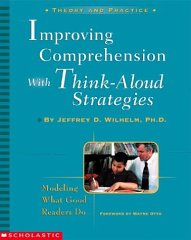 |
Improving Comprehension with Think-Aloud Strategies: Modeling What
Good Readers Do
Author: Wilhelm, Jeffrey Otto, Wayne
ISBN: 0-439-21859-4
LCCN: 2002265346
Dewey:
Number:
|
Category:
Education
User Rating: 5.0 Stars
Pages: 176
Paperback Teaching Resources
Product Description Help students learn how to read better with the powerful
technique that makes the reading process come alive for kids. Model predicting,
inferring, visualizing, summarizing, making connections to real life and more.
Card catalog description "With this book, Jeff Wilhelm gets to the heart of what
it means to be a passionate teacher and reader, one who not only conveys to his
students an enthusiasm for reading, but also shows them ways that they can
comprehend, appreciate, and converse with texts of all kinds. Jeff's energy for
teaching is palpable and infectious, yet the beauty of this book emanates from
Jeff's ability to reveal the raw mechanics of the reading process both to his
students and to us."--Cover, p. 4.
Ideas and Insights: Language Arts in the Elementary
School
|
Ideas and Insights: Language Arts in the Elementary
School
Author: Watson, Dorothy J. (Contributor)
ISBN: 0-8141-2259-0
LCCN: 87022110
Dewey:
372.6 19
Number:
|
Category: Elementary School Language Arts
User Rating:
4.0 Stars
Pages: 243
Paperback Natl Council of Teachers
Bibliography: p. 223-239.
I Read It, but I Don't Get It: Comprehension Strategies for Adolescent
Readers
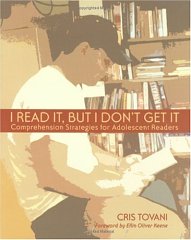 |
I Read It, but I Don't Get It: Comprehension Strategies for
Adolescent Readers
Author: Tovani, Cris Keene, Ellin Oliver
(Foreword)
ISBN: 1-57110-089-X
LCCN:
00058798
Dewey: 428.4/3 21
Number:
|
Category: English
language: reading skills
User Rating: 4.5 Stars
Pages:
140
Paperback Stenhouse Publishers
From the Publisher I Read It, but I Don't Get It is a practical, engaging
account of how teachers can help adolescents develop new reading comprehension
skills. Cris Tovani is an accomplished teacher and staff developer who writes
with verve and humor about the challenges of working with students at all levels
of achievement - from those who have mastered the art of "fake reading" to
college-bound juniors and seniors who struggle with the different demands of
content-area textbooks and novels. Enter Cris' classroom, a place where students
are continually learning new strategies for tackling difficult text. You will be
taken step-by-step through practical, theory-based reading instruction that can
be adapted for use in any subject area. The book features: anecdotes in each
chapter about real kids with real universal problems. You will identify with
these adolescents and will see how these problems can be solved; a thoughtful
explanation of current theories of comprehension instruction and how they might
be adapted for use with adolescents; a What Works section in each of the last
seven chapters that offers simple ideas you can immediately employ in your
classroom. The suggestions can be used in a variety of content areas and grade
levels (6-12); teaching tips and ideas that benefit struggling readers as well
as proficient and advanced readers; appendixes with reproducible materials that
you can use in your classroom, including coding sheets, double entry diaries,
and comprehension constructors. In a time when students need increasingly
sophisticated reading skills, this book will provide support for teachers who
want to incorporate comprehension instruction into their daily lesson plans
without sacrificing content knowledge. Synopsis I Read It, but I Don't Get It is
a practical, engaging account of how teachers can help adolescents develop new
reading comprehension skills. Cris Tovani is an accomplished teacher and staff
developer who writes with verve and humor about the challenges of working with
students at all levels of achievement - from those who have mastered the art of
"fake reading" to college-bound juniors and seniors who struggle with the
different demands of content-area textbooks and novels. Enter Cris' classroom, a
place where students are continually learning new strategies for tackling
difficult text. You will be taken step-by-step through practical, theory-based
reading instruction that can be adapted for use in any subject area. The book
features: anecdotes in each chapter about real kids with real universal
problems. You will identify with these adolescents and will see how these
problems can be solved; a thoughtful explanation of current theories of
comprehension instruction and how they might be adapted for use with
adolescents; a What Works section in each of the last seven chapters that offers
simple ideas you can immediately employ in your classroom. The suggestions can
be used in a variety of content areas and grade levels (6-12); teaching tips and
ideas that benefit struggling readers as well as proficient and advanced
readers; appendixes with reproducible materials that you can use in your
classroom, including coding sheets, double entry diaries, and comprehension
constructors. In a time when students need increasingly sophisticated reading
skills, this book will provide support for teachers who want to incorporate
comprehension instruction into their daily lesson plans without sacrificing
content knowledge.
How to write a report
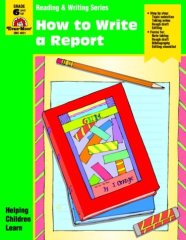 |
How to write a report
Author: Moore, Jo Ellen
ISBN: 1-55799-429-3
LCCN:
Dewey:
Number:
|
Category:
Aids and devices
User Rating: 4.0 Stars
Pages: 32
Unknown Binding Evan-Moor
How to Align Literacy Instruction, Assessment, and Standards: And Achieve
Results You Never Dreamed Possible
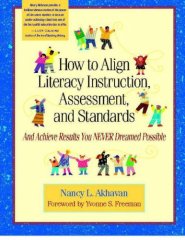 |
How to Align Literacy Instruction, Assessment, and Standards: And
Achieve Results You Never Dreamed Possible
Author: Akhavan,
Nancy Freeman, Yvonne S. Freeman, Yvonne S.
ISBN:
0-325-00662-8
LCCN: 2003028094
Dewey: 371.2/03
22
Number:
|
Category:
Organization & management of education
User Rating: 3.5
Stars
Pages: 312
Paperback Heinemann
Review �During this time How To Align Literacy Instruction, Assessment, and
Standards is an important reminder of what's truly essential in creating a
school wide literate community. Using the standards as her foundation, Nancy
Akhavan teaches us not only how to triumph with the standards but how to
transform a faltering school into a thriving reading and writing community. This
book is much more than a "how-to" book on implementing the standards in the
classroom; instead it's really about the art of teaching reading and
writing.��Georgia Heard, Author of Writing Toward Home, Awakening the
Heart, and The Revision Toolbox �How To Align Literacy Instruction,
Assessment, and Standards is a precise blend of research and practice. Nancy
Akhavan has created practical hands-on ideas using a real school, real kids, and
real life situations. This text is an invaluable guidebook to help you create an
environment where learning for understanding becomes the norm for children and
adults.��Jan Duke, Ed.D., BER National Presenter, Milken Educator,
California Teacher of the Year �Nancy Akhavan provides a brilliant
demonstration of the power of classroom teachers to turn an under-achieving
school into one of the best public education has to offer.��Lucy
Calkins, Author of The Art of Teaching Writing Product Description
During this time How To Align Literacy Instruction, Assessment, and Standards is
an important reminder of what's truly essential in creating a school wide
literate community. Using the standards as her foundation, Nancy Akhavan teaches
us not only how to triumph with the standards but how to transform a faltering
school into a thriving reading and writing community. This book is much more
than a "how-to" book on implementing the standards in the classroom; instead
it's really about the art of teaching reading and writing. - Georgia Heard,
Author of Writing Toward Home, Awakening the Heart, and The Revision Toolbox How
To Align Literacy Instruction, Assessment, and Standards is a precise blend of
research and practice. Nancy Akhavan has created practical hands-on ideas using
a real school, real kids, and real life situations. This text is an invaluable
guidebook to help you create an environment where learning for understanding
becomes the norm for children and adults. - Jan Duke, Ed.D., BER National
Presenter, Milken Educator, California Teacher of the Year Nancy Akhavan
provides a brilliant demonstration of the power of classroom teachers to turn an
under-achieving school into one of the best public education has to offer. -
Lucy Calkins, Author of The Art of Teaching Writing In this book, Nancy Akhavan
details the stories and strategies that enabled her school to move from
"under-performing" status to one in which students achieve and teachers have a
whole new understanding of targeted instruction, sensitive assessment, and
meaningful curriculum. There is much to appreciate in what she says, from her
attention to "thinking small" and understanding the power of the details, her
emphasis on planning and goal-setting, to the seriousness with which she takes
the standards and incorporates them into the life of the classroom. Drawing on
the work of the best in the business, Lucy Calkins, David and Yvonne Freeman,
and Tony Alvarado, Akhavan made professional development the heartbeat of her
school as she helped her faculty understand that their work begins and ends with
continuous assessment of their students. Now she helps readers of her book
learn: how child-centered assessment leads to strategic instruction how to best
support multilingual learners how to organize for yearlong learning how to think
through precise workshop instruction in minilessons how to develop meaningful
curriculum around units of study how to create a vibrant school community where
standards and accountability stem from regular assessment and examination of
instructional practices. Akhavan provides immediately useful information for any
elementary teacher, principal, or curriculum
Help America Read: A Handbook for Volunteers
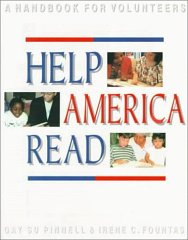 |
Help America Read: A Handbook for Volunteers
Author:
Fountas, Irene C. Pinnell, Gay Su
ISBN:
0-435-07250-1
LCCN: 97041387
Dewey: 371.14/124
21
Number:
|
Category:
Literacy
User Rating: 4.0 Stars
Pages: 120
Paperback Heinemann
Product Description A recent explosion of volunteerism has occurred in
classrooms, libraries, boardrooms, and church basements across the nation - and
nowhere has this trend been more keenly felt than in literacy programs. Here,
unpaid workers want to help meet the challenge of teaching America to read. But
who teaches them to work with children? With teachers' time already stretched to
the limit and many volunteers lacking sufficient training, the need for a
concise and practical handbook has never been greater. Help America Read fills
the void, containing everything you would want a literacy volunteer to know
about tutoring children. Designed to help the volunteer become more
self-reliant, this handbook includes: ten specific ways of working with
children, with guides and suggestions for each; many book lists, including
multicultural titles, at several grade levels; concrete suggestions, without
assuming that a volunteer knows how to perform basic teaching tasks; sample
lesson plans; time management tips; basic information on phonics and fluency in
reading and writing; and guidelines for working with individuals as well as
groups. Since the authors are Gay Su Pinnell and Irene Fountas, two of our
nation's leading literacy educators, teachers and leaders can be certain that
they are providing a resource based upon sound research on how children learn to
read and write. Literacy volunteers will learn how to gain children's trust,
monitor their comfort level, and create a positive learning environment. Perhaps
most important, they will feel valued and encouraged to continue their
all-important work, now when we need them most. About the Author Irene C.
Fountas, a professor in the School of Education at Lesley University in
Cambridge, Massachusetts, has been a classroom teacher, language arts
specialist, and consultant in school districts across the nation and abroad. She
works extensively in the literacy education field and directs the Literacy
Collaborative in the School of Education at Lesley University. Together with Gay
Su Pinnell she has authored numerous books, videos, and websites with Heinemann
that are now considered standards in the field of literacy instruction and staff
development. Their latest innovation is The Fountas and Pinnell Benchmark
Assessment System, a comprehensive assessment system for grades K - 8. Visit
http://www.fountasandpinnellbenchmarkassessment.com for details.Fountas and
Pinnell have influenced the classroom practices of teachers nationwide through
bestselling books such as: The Continuum of Literacy Learning, Grades K - 8
(2007) The Continuum of Literacy Learning, Grade Gay Su Pinnell is a professor
in the School of Teaching and Learning at The Ohio State University. She has
extensive experience in classroom teaching and field-based research, and in
developing comprehensive approaches to literacy education. She has received the
International Reading Association's Albert J. Harris Award for research and the
Charles A. Dana Foundation Award for her contributions to the field of
education. She is also a member of the Reading Hall of Fame. Together with Irene
Fountas she has authored numerous books, videos, and websites with Heinemann
that are considered standards in the field of literacy instruction and staff
development. Their latest innovation is The Fountas and Pinnell Benchmark
Assessment System, a comprehensive assessment system for grades K - 8. Visit
fountasandpinnellbenchmarkassessment.com for details. Fountas and Pinnell have
influenced the classroom practices of teachers nationwide through bestselling
titles such as: The Continuum o
Happily Ever After: Sharing Folk Literature With Elementary and Middle
School Students
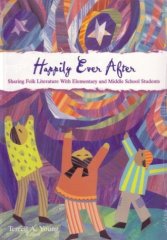 |
Happily Ever After: Sharing Folk Literature With Elementary and
Middle School Students
Author: Young, Terrell A. (Editor)
ISBN: 0-87207-510-9
LCCN: 2003018329
Dewey:
372.64 22
Number:
|
Category: Fairy tales, folk tales, fables, magical tales &
traditional stories
User Rating: 5.0 Stars
Pages: 368
Paperback International Reading Association
From School Library Journal Folk literature is an important component in
today's curriculum, not just for its literary merits but for its ability to
expose youngsters to a variety of cultures and a diversity of beliefs and
lifestyles. This collaborative effort from a group of professors, storytellers,
editors, school-media specialists, and authors/folklorists brings together a
complete overview of the genre. The book begins with a good guide to the
subgenres within the folk-literature category. Explanations, literary
criticisms, and examples are given for folktales, fables, mythology, legends,
and tall tales in six detailed chapters. Next, stories from a wide range of
cultures are explored. An entire section is devoted to "Cinderella" and its
numerous variants. Throughout the book is a wealth of classroom applications,
ideas, and suggestions for interpretation outlined in the form of lesson plans,
writing exercises, art projects, role playing/dramatization, and the integration
of social- and global-studies units. It concludes with discussions of the
validity of studying and evaluating transformed fairy- and folktales such as the
fractured and twisted tale, and of exploring the timeliness and timelessness of
folk literature through an evaluation of "Rumpelstiltskin" from the original
Brothers Grimm to Diane Stanley's rendition. This well-written, broad approach
to folk literature will be suited to not just educators and classroom teachers,
but to children's literature devotees as well.–Rita Soltan, Oakland University,
Rochester, MI Copyright © Reed Business Information, a division of Reed Elsevier
Inc. All rights reserved. Book Description Anansi, Cinderella, Rumpelstiltskin,
and the Three Little Pigs are just a few of the beloved characters whose stories
have been shared for generations. Their adventures, rooted in the oral
storytelling tradition, have been recorded as folk literature in every corner of
the world. Because folk literature represents a large portion of the trade books
published for children and young adults, elementary and middle school teachers
and librarians need a resource to help them understand and use this genre with
students. Happily Ever After: Sharing Folk Literature With Elementary and Middle
School Students defines folk literature and provides ideas for teaching it,
making it not only a practical resource for classroom teachers and librarians
but also an appropriate textbook for teacher education courses. The book is
divided into four sections. Section one provides an overview of traditional
literature. Section two examines the subgenres of folk literature, helping
readers to better understand folk tales and fairy tales, fables, myths, legends,
and tall tales. Section three deals with traditional literature across cultures
and includes thought-provoking chapters dealing with African, Asian, European,
Jewish, Latino, Middle Eastern and South Asian, and Native American folk
literature. Section four looks at how teachers might use folk literature in
their classrooms through drama, writing, comparing versions and variants of a
single tale type, and collecting oral folklore and adapting it to the written
form. Throughout the chapters, authors show how folk literature can extend
students' literacy and love of reading through a range of classroom applications
spanning the full range of the language arts. This book will be a valuable
resource to guide teachers, librarians, and students in experiencing the
"happily ever after" magic found in folk literature.
Handwriting Without Tears: Kindergarten Teacher's Guide - Contracted
Edition
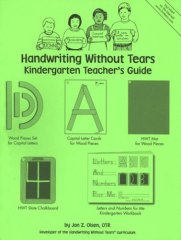 |
Handwriting Without Tears: Kindergarten Teacher's Guide -
Contracted Edition
Author: Olsen, Janice Z. Olsen, Jan Z.
ISBN: 1-891627-07-4
LCCN:
Dewey:
Number:
|
Category:
Handwriting
User Rating: 5.0 Stars
Pages: 81
Paperback Handwriting Without Tears
Handwriting Without Tears Kindergarten Teacher's Guide is the guide for the
kindergarten workbook, Letters and Numbers for Me. In this book are: tips for K
teachers, parents and therapists; lesson plans for using the manipulatives: Wood
Pieces, Letter Cards, Mat and Slate; and daily games and activities to use after
the workbook is completed.
Guiding Readers and Writers: Teaching Comprehension, Genre, and Content
Literacy
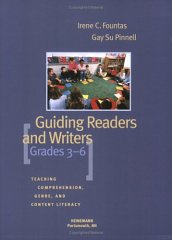 |
Guiding Readers and Writers: Teaching Comprehension, Genre, and
Content Literacy
Author: Fountas, Irene C. Pinnell, Gay Su
Pinnel, Gay Su
ISBN: 0-325-00310-6
LCCN:
00712760
Dewey:
Number:
|
Category: English
language: reading skills
User Rating: 5.0 Stars
Pages:
672
Paperback Heinemann
Product Description Authors Irene Fountas and Gay Su Pinnell have already
helped hundreds of thousands of K-3 teachers engage, inform, and inspire early
readers and writers. Now, with Guiding Readers and Writers (Grades 3-6), Fountas
and Pinnell support teachers on the next leg of the literacy journey, addressing
the unique challenges of teaching upper elementary students. The product of many
years of work with classroom teachers, Guiding Readers and Writers (Grades 3-6)
is one of the most comprehensive, authoritative guides available today. It
explores all the essential components of a quality literacy program in six
separate sections: Breakthrough to Literacy: Fountas and Pinnell present the
basic structure of the language/literacy program within a breakthrough framework
that encompasses the building of community through language, word study,
reading, writing, and the visual arts. The framework plays out as three
"blocks," which can be interpreted as conceptual units as well as segments of
time within the school day. Specific information on how to structure a reading
and writing workshop is provided. A practical chapter on organizing and managing
the classroom will help you implement the principles in your own classroom.
Independent Reading: It is essential for students to develop interests and
tastes as readers, selecting books for themselves every day. Fountas and Pinnell
devote four chapters to independent reading, exploring how to structure
teaching, minilessons, conferences, groupshare, and ways to use response
journals as part of a reading workshop. Guided Reading: The chapters in this
section provide detailed information on planning for guided reading, dynamic
grouping for effective teaching, and selecting, introducing, and using leveled
texts. Fountas and Pinnell describe characteristics of texts related to
difficulty and ways to organize texts in your classroom and school. Literature
Study: This section of the book discusses how to make students' experiences with
literature as rich as possible. The authors offer specific suggestions for
forming groups, guiding student choices, and establishing and teaching routines
for literature discussion. A full chapter explores reader response and ways to
help readers dig deep to uncover the meaning of texts. Teaching for
Comprehension and Word Analysis: This detailed look at the reading process
explores both oral and silent reading, processes and behaviors related to
comprehension, and ways to help students construct meaning. Included are twelve
systems for sustaining the reading process and expanding meaning, plus
discussions of the important areas of phonics, spelling, and vocabulary. The
Reading and Writing Connection: These chapters showcase the instructional
contexts - poetry, writer's notebooks, writer's talks, genre, content literacy,
and student research - that support students in connected reading and writing.
An informative overview of the characteristics of fiction and nonfiction will
help you teach students to read and write a variety of genre. What's more, the
authors suggest ways to help students learn the "genre" of testing and perform
the kinds of reading and writing tasks that tests require. They also detail the
continuous thoughtful assessment that guides all aspects of effective teaching.
A special feature appears at the end of each section, in which Fountas and
Pinnell provide indispensable suggestions for working with struggling readers
and writers. About the Author Irene C. Fountas, a professor in the School of
Education at Lesley University in Cambridge, Massachusetts, has been a classroom
teacher, language arts specialist, and consultant in school districts across the
nation and abroad. She works extensively in the literacy education field and
directs the Literacy Collaborative in the School of Education at Lesley
University. Together with Gay Su Pinnell she has authored numerous books,
videos, and websites with Heinemann that are now considered standards in the
field of literacy instruction and staff development. Their latest innovation
Guided Reading: Making It Work
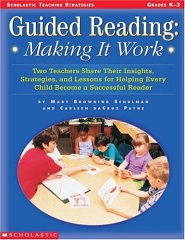 |
Guided Reading: Making It Work
Author: Schulman, Mary
Carleen, Payne Shulman, Mary Browning
ISBN:
0-439-11639-2
LCCN: 00709507
Dewey: 372.4
21
Number:
|
Category:
English language reading schemes
User Rating: 4.5
Stars
Pages: 272
Paperback Scholastic Teaching Resources
Product Description Guided reading is wonderful in theory, but how do you
manage it? In this practical resource, two veteran teachers provide a
step-by-step guide to guided reading, sharing their lesson plans, management
strategies, and assessment tools. They show you how Card catalog description
Ideas, resources, and a list of childrens' books that can be used to implement
guided reading.
Guided Reading: Good First Teaching for All Children
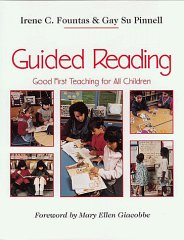 |
Guided Reading: Good First Teaching for All
Children
Author: Pinnell, Gay Su Fountas, Irene C. Fountas,
Irene C. Pinnell, Gay Su Giacobbe, Mary Ellen
ISBN:
0-435-08863-7
LCCN: 96032481
Dewey: 372.4
20
Number:
|
Category:
Literacy
User Rating: 5.0 Stars
Pages: 424
Paperback Heinemann
Review �This is an important book for teachers, administrators, prospective
teachers, college professors, or anyone seeking to provide quality teaching to
children in their first years of schooling.��Harvard Educational
Review Product Description This is an important book for teachers,
administrators, prospective teachers, college professors, or anyone seeking to
provide quality teaching to children in their first years of schooling. -
Harvard Educational Review Among the many changes to sweep American literacy
education has been a move toward whole class instruction. Nonetheless, children
still bring to literacy a wide range of experiences and competencies. How, then,
might teachers best support a literate community yet still meet the needs of
individual readers? For Fountas and Pinnell, the answer lies in guided reading,
which allows children to develop as individual readers within the context of a
small group. Their new book is the richest, most comprehensive guided reading
resource available today and the first systematic offering of instructional
support for guided reading adherents. Guided Reading was written for K-3
classroom teachers, reading resource teachers, teacher educators, preservice
teachers, researchers, administrators, and staff developers. Based on the
authors' nine years of research and development, it explains how to create a
balanced literacy program based on guided reading and supported by read aloud,
shared reading, interactive writing, and other approaches. While there is an
entire chapter devoted solely to the process by which children become literate,
every chapter clearly presents the theoretical underpinnings of the practices it
suggests. Also included are guidelines for: observation and assessment dynamic
grouping of readers creating sets of leveled books selecting and introducing
books teaching for strategies classroom management. Best of all, there are well
over 2,500 leveled books in the Appendixes, along with many other reproducible
resources that teachers will use for years to come. "Good first teaching is the
foundation of education and the right of every child," assert the authors. With
the publication of this book, educators themselves will find the foundation in
reading skills instruction they so rightly deserve.
Guided Reading the Four-blocks Way: The Four Blocks Literacy Model Book
Series
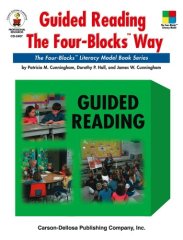 |
Guided Reading the Four-blocks Way: The Four Blocks Literacy Model
Book Series
Author: Cunningham, Patricia Hall, Dorothy P.
Cunningham, James W.
ISBN: 0-88724-579-X
LCCN:
Dewey:
Number:
|
Category: General
User Rating: 5.0 Stars
Pages:
224
Paperback Four Blocks
Book Description This resource provides instructions for teaching reading
comprehension skills and strategies; a variety of reading activities; and
variations for Kindergarten and Upper Grade students.
Guided Comprehension: A Teaching Model for Grades 3-8
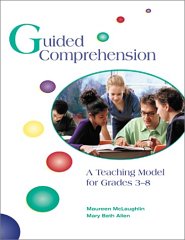 |
Guided Comprehension: A Teaching Model for Grades
3-8
Author: McLaughlin, Maureen Allen, Mary Beth
ISBN: 0-87207-172-3
LCCN: 2001005664
Dewey:
372.4 21
Number:
|
Category: English language: reading skills
User Rating:
5.0 Stars
Pages: 276
Paperback Intl Reading Assn
Book Description In response to the disparity between what is known about
best practice for comprehension instruction and what they saw happening in
classrooms, authors Maureen McLaughlin and Mary Beth Allen have developed an
innovative teaching model for grades 3-8. The Guided Comprehension Model is a
step-by-step teaching framework that encourages students to become active,
strategic readers by providing direct and guided strategy instruction, numerous
opportunities for engagement, and a variety of texts and instructional settings.
Guided Comprehension: A Teaching Model for Grades 3-8 is a complete resource
that provides all the necessary tools to make this classroom-tested process work
with students, from detailed explanations of how each stage functions to ideas
for facilitating assessment, organization, and management in the classroom.
There are a variety of useful reproducibles in the appendixes, including
teaching ideas and blackline masters, forms for organizing and managing
comprehension centers and routines, literature response prompts, leveled book
resources, assessment forms, and instruction plans. Classroom teachers, staff
developers, Title I reading specialists, and teacher educators will welcome this
practical guide that contains everything needed to implement the Guided
Comprehension Model in grades 3-8. About the Author Maureen McLaughlin is
Professor of Reading Education at East Stroudsburg University of Pennsylvania,
East Stroudsburg, Pennsylvania, USA. Mary Beth Allen is Assistant Professor of
Reading Education at East Stroudsburg University of Pennsylvania, East
Stroudsburg, Pennsylvania, USA.
Guided Comprehension in Action: Lessons for Grades 3-8
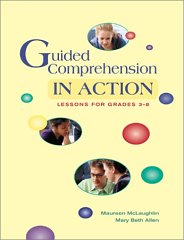 |
Guided Comprehension in Action: Lessons for Grades
3-8
Author: McLaughlin, Maureen Allen, Mary Beth
ISBN: 0-87207-343-2
LCCN: 2002001514
Dewey:
372.47 21
Number:
|
Category: English (ie as school subject)
User Rating:
5.0 Stars
Pages: 194
Paperback International Reading Association
Book Description Expand your strategies for teaching reading comprehension
with this collection of lessons for using Guided Comprehension in your
classroom. Written to complement Guided Comprehension: A Teaching Model for
Grades 3-8, this book provides classroom-tested instructional plans and
resources for teaching reading comprehension strategies within a variety of
themes: multiple perspectives, mystery, favorite authors, poetry, biography and
autobiography, and fantasy. Each theme-based chapter presents the components for
implementing the Guided Comprehension Model in grades 3-8: a theme description,
theme-based plan, planning forms and lessons, teacher commentaries and
think-alouds, samples of student work, and theme-based resources including
related texts, websites, performance extensions across the curriculum, and
culminating activities. A final chapter suggests even more themes and resources,
and provides practical forms for planning themes and lessons based on the Model.
Teaching ideas and blackline masters to support strategy applications in the
theme-based lessons are included in an appendix.
Grand Conversations: Literature Groups in Action
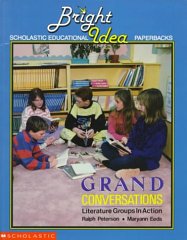 |
Grand Conversations: Literature Groups in Action
Author:
Peterson, Ralph Eeds, Maryann
ISBN:
0-590-73422-9
LCCN:
Dewey:
Number:
|
Category: Teaching
Methods & Materials - Classroom Planning
User Rating: 5.0
Stars
Pages: 79
Paperback Scholastic
Book Description Literature Groups in Action Teach with real books in
literature groups and watch your students read aloud and discuss books
enthusiastically and learn together. Includes a rationale, grouping strategies
and inspiring stories from the classroom. About the Author Ralph Peterson and
Maryann Eeds, experts in the field of literature and literacy, are professors at
the Arizona State University.
Good-bye Round Robin: 25 Effective Oral Reading
Strategies
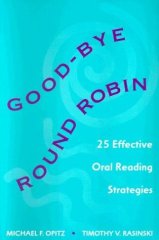 |
Good-bye Round Robin: 25 Effective Oral Reading
Strategies
Author: Opitz, Michael F. Rasinski, Timothy
Rasinski, Timothy
ISBN: 0-325-00098-0
LCCN:
98037936
Dewey: 372.45/2 21
Number:
|
Category: English
language: specific skills
User Rating: 4.0 Stars
Pages:
112
Paperback Heinemann
Product Description Is oral reading important? "Absolutely," assert Michael
Opitz and Timothy Rasinski, "so important that we must put it into perspective
and use it in the most effective and efficient ways possible." Opitz and
Rasinski have written this book to help teachers do just that. Their aim is to
show where oral reading fits in the reading program and share twenty-five of the
best strategies for helping children learn to read aloud. Good-bye Round Robin
is the first book of its kind, offering teachers a new alternative to
traditional round robin reading - an outmoded practice that more often prohibits
rather than facilitates the ability to read. The book is completely research
based, demonstrating how to use oral reading to help students develop
comprehension, share information, and discover effective reading strategies. All
of the activities are categorized and easy to locate. For each technique, the
authors provide a grade level, description, teaching procedures, suggested
children's literature, classroom scenarios, and additional ideas for extending
the activity. A separate chapter on oral reading as a tool for assessment
provides specific strategies and guidelines teachers can use along with many
reproducible forms. There are also separate chapters on teaching struggling
readers and working with parents. According to the authors, silent reading
should remain the mainstay of an effective reading program, but there are times
when oral reading is also important. Children need both types of reading
experiences to ensure that comprehension occurs. Following the strategies
outlined in this book, preservice and inservice elementary teachers can be
certain they are truly helping children meet this goal. About the Author Michael
F. Opitz is the author of nine books, including the Heinemann titles Do-able
Differentiation (2008), Books & Beyond (2007), Listen Hear! (2004), Reaching
Readers (2001), Rhymes and Reasons (2000), and Good-bye Round Robin
(1998).Michael is a former elementary school teacher and reading specialist. Now
he is a professor of elementary education and reading at the University of
Northern Colorado and the winner of its Outstanding Scholar Award in the College
of Education and Behavioral Sciences. He works in classrooms in the US and
abroad planning, teaching and evaluating demonstration lessons focused on
different aspect of literacy in K - 5 classrooms. He is also the author of the
books Flexible Grouping in Reading (1998), and Literacy Instruction for
Culturally and Linguistically Diverse Students (1998) as well as Summer Success
Reading (Great Source, 2001). He works as a consultant for Great Source
Education Group and the US Department of Defense Schools.Mic Timothy Rasinski is
a professor of curriculum and instruction at Kent State University. He has
written and edited several books on reading education and is coeditor of IRAs
elementary-level reading journal, The Reading Teacher.
Getting Beyond I Like the Book: Creating Space for Critical Literacy in K-6
Classrooms
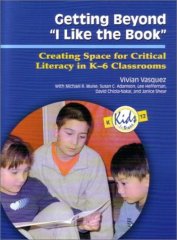 |
Getting Beyond I Like the Book: Creating Space for Critical
Literacy in K-6 Classrooms
Author: Vasquez, Vivian Maria
Muise, Michael R. Adamson, Susan C. Heffernan, Lee Chiola-Nakai, David
ISBN: 0-87207-512-5
LCCN: 2003004933
Dewey:
372.6 21
Number:
|
Category: English language: reading skills
User Rating:
5.0 Stars
Pages: 120
Paperback International Reading Association
Book Description Getting Beyond "I Like the Book": Creating Space for
Critical Literacy in K-6 Classrooms Vivian Vasquez, with Michael R. Muise, Susan
C. Adamson, Lee Heffernan, David Chiola-Nakai, and Janice Shear Discover the
potential of children's literature as a tool to teach critical literacy in K-6
classrooms. This book tells the story of eight teachers who work in a variety of
schools serving diverse populations. These educators used critical literacy
discourse to frame classroom conversations about children's literature,
prompting students to critically examine the meaning of the texts they read. By
putting this critical edge on children's talk about books, the teachers enabled
students to examine and act on social issues that emerged from their
conversations. The book shows critical literacy in action through many classroom
vignettes and offers a variety of other resources that are the hallmarks of the
Kids InSight series, including Reflection Points, examples of students' work,
annotated booklists, and information boxes. ©2003 | 120 pp | ISBN: 0-87207-512-5
| 512-553 | Elementary IRA Book Club selection 05/03 About the Author Vivian
Vasquez is an assistant professor at American University, Washington, D.C. USA.
Michael R. Muise is an assistant professor at Wayne State University, Detroit,
Michigan, USA. Susan C. Adamson is the program director at Indiana Partnership
for Young Writers, Indianapolis, Indiana, USA. Lee Heffernan is a doctoral
candidate at Indiana University, Bloomington, Indiana, USA. David Chiola-Nakai
is a teacher librarian for the Dufferin-Peel Catholic District School Board in
Mississauga, Ontario, Canada. Janice Shear is an elementary school teacher in
Mississaugu, Ontario, Canada.
From Literature to Literacy: Bridging Learning in the Library and the
Primary Grade Classroom
 |
From Literature to Literacy: Bridging Learning in the Library and
the Primary Grade Classroom
Author: Moss, Joy F. Fenster,
Marilyn F.
ISBN: 0-87207-345-9
LCCN:
2002007434
Dewey: 372.64/044 21
Number:
|
Category: English
language
User Rating: 4.0 Stars
Pages: 224
Paperback International Reading Association
Book Description Learn how elementary school teachers and librarians can
collaborate to provide rich and fulfilling literary and literacy experiences for
the children they teach. Teachers will find that they can observe students'
responses to new challenges in a setting outside the classroom, and librarians
will gain a deeper understanding of children that will help them plan literature
programs and individualize their response to each child. Authors Moss, a school
librarian and literature teacher, and Fenster, a teacher of a combined K-1
classroom, developed a yearlong literary/literacy program that exposed first
graders to a wide range of literary selections in weekly read-aloud sessions in
the school library. The dialogue that emerged as the core of the children's
literary experiences enabled them to confidently explore unfamiliar territory in
the world of literature. You'll witness firsthand the culmination of the program
in "The Magic Library," a story that the students wrote collaboratively based on
what they had discovered in the literary/literacy units. About the Author Joy F.
Moss is a librarian and literature teacher at the Harley School, Rochester, New
York, USA, and an adjunct/associate professor at the University of Rochester
Warner Graduate School of Education and Human Development, Rochester, New York,
USA. Marilyn F. Fenster is a classroom teacher of a combined K-1 classroom at
The Harley School, Rochester, New York, USA.
The Fluent Reader: Oral Reading Strategies for Building Word Recognition,
Fluency, and Comprehension
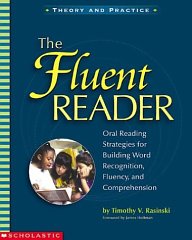 |
The Fluent Reader: Oral Reading Strategies for Building Word
Recognition, Fluency, and Comprehension
Author: Rasinski,
Timothy V.
ISBN: 0-439-33208-7
LCCN:
2004272695
Dewey:
Number:
|
Category:
Education
User Rating: 5.0 Stars
Pages: 192
Paperback Scholastic, Inc.
Product Description Oral reading strategies for building word recognition,
fluency and comprehension.
Fluency Lessons for the Overhead: Grades 4-6
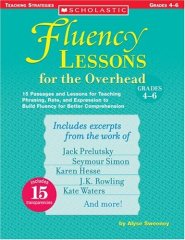 |
Fluency Lessons for the Overhead: Grades 4-6
Author:
Sweeney, Alyse
ISBN: 0-439-58853-7
LCCN:
Dewey:
Number:
|
Category: Elementary School Language Arts
User Rating:
4.5 Stars
Pages: 56
Paperback Scholastic Paperbacks
Product Description This resource provides 15 lessons for modeling fluency
using fun passages that kids will love to read and reread. Includes excerpts
from the work of J.K. Rowling, Seymour Simon, Karen Hesse, and more! Each
passage is provided on an overhead and a reproducible; each lesson is complete
with independent practice and comprehension activities
Flexible Grouping in Reading
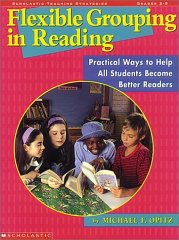 |
Flexible Grouping in Reading
Author: Opitz, Michael
F.
ISBN: 0-590-96390-2
LCCN:
Dewey:
Number:
|
Category:
Education / Teaching
User Rating: 3.0 Stars
Pages:
128
Paperback Scholastic
Book Description Practical Ways to Help All Students Become Better Readers
Avid and reluctant readers alike will love to work in flexible groups arranged
by interest, ability, student choice, random selection, and genre. Strategies
include anticipation guides, cut aparts, response logs, think alouds,
cooperative reading, book murals, and more. About the Author Michael F. Opitz is
Assistant Professor of Reading-Language Arts at the University of Southern
Colorado where he teachers undergraduate and graduate courses, and also directs
the reading minor for the university. He is an active consultant in several
areas of language learning, and has been a teacher since 1974, when he taught a
combined third and fourth grade in Hoonah, AK. His education articles have
appeared in several trade and professional journals.
Family Literacy Connections in Schools and Communities
 |
Family Literacy Connections in Schools and
Communities
Author: Morrow, Lesley Mandel (Editor)
ISBN: 0-87207-127-8
LCCN: 94043139
Dewey:
302.2/244 20
Number:
|
Category: Teaching of a specific subject
User Rating:
5.0 Stars
Pages: 336
Paperback International Reading Association
Book Description How can educators involved in family literacy initiatives be
confident they are providing beneficial, rather than intrusive, experiences?
What role should the community play in family literacy issues? How can schools,
families, and organizations better collaborate to enhance literacy development
for both children and their caregivers? This volume--developed by IRA's Family
Literacy Commission--presents a wide variety of school-based and
organization-sponsored programs and initiatives that address these questions.
With it, practitioners and researchers will learn how others are responding to
the needs of families and will gain insight into how to develop new programs.
Foreword by Barbara Bush. From the Back Cover Ever since the creation of the
Barbara Bush Foundation for Family Literacy in 1989, people have been asking me
questions about the focus we chose: What is family literacy? How does it work?
What can we do to support it? And why is it different from just plain literacy?
So, I was delighted to learn that the International Reading Association would be
publishing this comprehensive volume of family literacy programs and practices,
put together by Lesley Mandel Morrow and IRA's Family Literacy Commission and
written by other experts, to answer the questions and spread the word about the
truly exciting developments in family literacy... To paraphrase one of my
favorite songs, it's clear to me that family literacy is her to stay. The number
of programs, the amount of legislation, and even the money available to fund
family literacy programs have all increased dramatically in the past six years
or so. "Family Literacy Connections in Schools and Communities" gives us all an
opportunity to reflect on what we've been doing and to think about what we need
to be doing in the years ahead... Barbara Bush (from the foreword)
The Explicit Teaching of Reading
 |
The Explicit Teaching of Reading
Author: Association,
International Reading (Corporate Author) Hancock, Joelie (Editor)
ISBN: 0-87207-253-3
LCCN: 99039695
Dewey:
372.41/6 21
Number:
|
Category: English language: reading skills
User Rating:
5.0 Stars
Pages: 139
Paperback International Reading Association
Book Description Study guides are useful tools for enhancing instruction at
any grade level and in any content area. This practical book discusses why and
how study guides help students comprehend text, while emphasizing the most
effective ways to use these guides in the classroom. Complete descriptions,
along with examples from a wide variety of lessons in primary through secondary
grades, will help teachers select the best guides for their purposes.
Essential Ingredients: Recipes for Teaching Writing
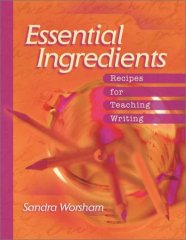 |
Essential Ingredients: Recipes for Teaching
Writing
Author: Worsham, Sandra
ISBN:
0-87120-594-7
LCCN: 2001005144
Dewey: 808/.042/071
21
Number:
|
Category:
Teaching Methods & Materials - Language Arts
User Rating: 5.0
Stars
Pages: 188
Paperback Association for Supervision & Curriculum Deve
Book Description Looking for ways to make the teaching of writing fresh?
Invite your students to use the approaches in Essential Ingredients: Recipes for
Teaching Writing. This book offers suggestions for writing that are appropriate
across the curriculum and for students in grades K-12. Sandra Worsham treats
experienced and new writing teachers to a feast of ideas for enlivening
students' writing experiences, including an innovative use of the helping
circle. Explore the differences between what the author calls "school" writing
and "real" writing and learn to make both forms work for students. Worsham
distills the qualities of successful writing, which she says must -appeal to the
senses -make use of the author's locale and sense of place -spring from memory
and stories -experience revision and expansion. To authenticate the suggestions,
Worsham's book includes several of her mother's recipes and stories from her
childhood-giving us a chance to experience the qualities of successful writing
as we learn to teach it to our students. Student writing samples from actual
assignments illustrate key points. A chapter on creating a warm classroom
atmosphere gives practical tips on enhancing writing in a collaborative setting.
In addition, writing assignments that work across the disciplines guarantee that
Essential Ingredients is useful not only for writing teachers, but for all
teachers who use writing as part of their curriculum.
An English Teacher's Guide to Performance Tasks & Rubrics: High
School
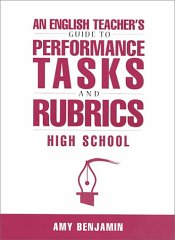 |
An English Teacher's Guide to Performance Tasks & Rubrics: High
School
Author: Benjamin, Amy
ISBN:
1-883001-93-5
LCCN: 00023506
Dewey: 428/.0076
21
Number:
|
Category:
General
User Rating: 5.0 Stars
Pages: 189
Paperback Eye on Education,
From the Publisher This book provides step-by-step procedures, student
hand-outs, and samples of student work. Synopsis This book provides step-by-step
procedures, student hand-outs, and samples of student work.
English at Your Command: Level G
|
English at Your Command: Level G
Author: No Author
ISBN: 0-7362-0192-0
LCCN:
Dewey:
Number:
|
Category:
Language Arts - General
User Rating: 5.0 Stars
Pages:
0
Paperback Hampton Brown Co Inc
English at Your Command!
|
English at Your Command!
Author: No Author
ISBN: 0-7362-0194-7
LCCN:
Dewey:
Number:
|
Category:
User Rating: 5.0 Stars
Pages: 336
Paperback Hampton-Brown
English At Your Command Practice Book [STUDENT EDITION]
|
English At Your Command Practice Book [STUDENT
EDITION]
Author: No Author
ISBN:
0-7362-0193-9
LCCN:
Dewey:
Number:
|
Category: User
Rating: 5.0 Stars
Pages: 0
Paperback Hampton Brown
Product Description Practice book for Grade 4 or 5
Editing
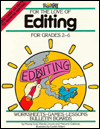 |
Editing
Author: Suid, Murray Lincoln, Wanda Gatheral,
Maryann
ISBN: 0-912107-00-6
LCCN:
Dewey:
Number:
|
Category:
Journalism
User Rating: 4.5 Stars
Pages: 112
Paperback Monday Morning Books
Easy Strategies & Lessons That Build Content Area Reading
Skills
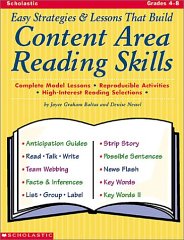 |
Easy Strategies & Lessons That Build Content Area Reading
Skills
Author: Baltas, Joyce Graham Nessel, Denise Nessel,
Denise D.
ISBN: 0-439-04092-2
LCCN:
Dewey:
Number:
|
Category:
Teaching Methods & Materials - Language Arts
User Rating: 5.0
Stars
Pages: 96
Paperback Scholastic
Book Description Complete Model Lesson, High Interest Reading Lesson
Selections, Reproducible Activities Students will learn the skills and
strategies they need to tackle content area reading with the ready-to-go lessons
in this book. Each lessons features a brief introduction to a reading strategy,
a complete model lessons, a reading selection you can use to teach the strategy,
plus reproducible activities. Lessons include Anticipation Guides, Possible
Sentence Strategy, Team Webbing, and more!
Early Literacy in the Classroom: A New Standard for Young
Readers
|
Early Literacy in the Classroom: A New Standard for Young
Readers
Author: Depress, Helen Iversen, Sandra
ISBN: 0-7802-2087-0
LCCN:
Dewey:
Number:
|
Category:
Education
User Rating: 4.5 Stars
Pages: 0
Paperback Wright Group/ McGraw-Hill
Discovering What Works for Struggling Readers: Journeys of Exploration with
Primary-grade Students (Kids Insight)
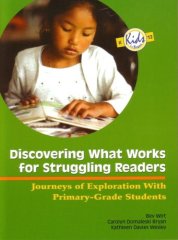 |
Discovering What Works for Struggling Readers: Journeys of
Exploration with Primary-grade Students (Kids Insight)
Author:
Wirt, Bev Bryan, Carolyn Domaleski Wesley, Kathleen Davies Bryan,
Carolyn Domaleski
ISBN: 0-87207-008-5
LCCN:
2004020920
Dewey: 372.43 22
Number:
|
Category: English
language: reading skills
User Rating: 5.0 Stars
Pages:
164
Paperback International Reading Association
Review "Will be invaluable and practical for anyone charged with the
responsibility of helping children learn how to read with skill." --Midwest Book
Review Product Description “Mrs. Wesley, I did it! I did it!” (Joshua,
first-grade student) As a teacher, you know the excitement of sharing those
life-changing moments with your students when they comprehend the previously
unknown. This book follows the yearlong journeys of three reading teachers who
discovered the challenges and rewards that come with addressing the needs of
struggling readers. As the authors share their insights, you'll come to learn
that good teaching requires not only knowing your craft but also knowing your
students. The chapters focus on the five teaching principles that the authors
consistently found to be effective with all their students-meaningful
conversation, choice, pertinent instruction, consistent support, and purpose-and
came to call “points of action.” The chapters recount the individual struggles
and successes of three students as they become readers, specifically
illustrating the points of action and how critical they are to successful
reading instruction. The final chapter offers additional ideas that you can use
to bring the points of action into your own classroom. The many classroom
vignettes and excerpts of student dialogue throughout the chapters bring the
students' voices to the forefront. Plus, Reflection Points are included to
provoke thought and discussion among you and your colleagues. All students have
their own unique stories from which you can learn. So join the authors on their
journeys, and let this book lead you to your own discoveries.
Discovering Children's Literature
|
Discovering Children's Literature
Author: Hillman,
Judith
ISBN: 0-02-355085-6
LCCN:
94004319
Dewey: 028.1/62 20
Number:
|
Category: Children's
literature studies: general
User Rating: 4.5 Stars
Pages:
276
Paperback Macmillan Pub Co
Product Description A concise introduction to the world of literature for
infants, children, and adolescents, this popular book taps the work of
well-known scholars to provide its foundation in genre theory while clearly
relating the books it recommends to practical teaching applications. After first
defining literature and literacy, and examining relevant aspects of children's
development, the author explores each of the traditional literature genres in
turn; and provides a firm structure for evaluation that will serve future
teachers well as they approach any form of literature. Each chapter asks the
student for reflections, opinions, and participation through suggested projects
and activities. For elementary and high school teachers of English and Language
Arts. --This text refers to the Paperback edition. The publisher, Prentice-Hall
Career & Technology A readable, succinct guide to the world of children's
literature, featuring a strong evaluation focus that explores the structure and
content of children's literature. Using numerous examples and suggestions, the
text provides a framework to support future literature evaluation as readers
discover new books. By providing a carefully-chosen range of suggestions and
examples -- rather than an encyclopedic presentation of worthwhile titles --
this text encourages both instructors and students to sample and discuss the
largest possible number of children's trade books.
Differentiated Literacy Coaching: Scaffolding for Student and Teacher
Success
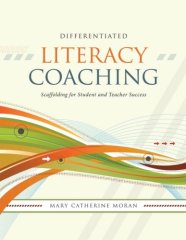 |
Differentiated Literacy Coaching: Scaffolding for Student and
Teacher Success
Author: Moran, Mary Catherine
ISBN: 1-4166-0623-8
LCCN: 2007033134
Dewey:
371.14/8 22
Number:
|
Category: Teaching Methods & Materials - Reading
User
Rating: 5.0 Stars
Pages: 185
Paperback ASCD
From the Publisher "Making sure that all students read well is a top priority
for schools, and literacy coaches are playing an increasingly important role in
the effort. Their challenge? To deliver the kind of instruction and support best
suited to the teachers they work with and most likely to help those teachers
improve the literacy of their students. In Differentiated Literacy Coaching,
Mary Catherine Moran presents a solution for meeting the diverse needs of
literacy coaches and their charges. The heart of the book is an exploration of
the Literacy Coaching Continuum, a series of professional learning formats that
coaches can use singularly or in combination to design and deliver the most
effective, most appropriate support: • Collaborative Resource Management •
Literacy Content Presentations • Focused Classroom Visits • Coplanning • Study
Groups • Demonstration Lessons • Peer Coaching • Coteaching Moran reviews the
key considerations school leaders and literacy coaches must keep in mind when
determining program focus and scope; describes the roles, responsibilities, and
procedures involved in each coaching format; and offers guidelines based on
research findings, exemplary coaching programs, and insights from her nearly 30
years as an educator. Readers will also find more than a dozen modules for
coaches' professional development, including recommended materials and
step-by-step procedures to help both new and experienced coaches expand their
expertise. An extensive collection of print and online resources further
enhances the book's usefulness for anyone interested in learning more about
establishing-orimproving-a literacy coaching program. " Synopsis "Making sure
that all students read well is a top priority for schools, and literacy coaches
are playing an increasingly important role in the effort. Their challenge? To
deliver the kind of instruction and support best suited to the teachers they
work with and most likely to help those teachers improve the literacy of their
students. In Differentiated Literacy Coaching, Mary Catherine Moran presents a
solution for meeting the diverse needs of literacy coaches and their charges.
The heart of the book is an exploration of the Literacy Coaching Continuum, a
series of professional learning formats that coaches can use singularly or in
combination to design and deliver the most effective, most appropriate support:
• Collaborative Resource Management • Literacy Content Presentations • Focused
Classroom Visits • Coplanning • Study Groups • Demonstration Lessons • Peer
Coaching • Coteaching Moran reviews the key considerations school leaders and
literacy coaches must keep in mind when determining program focus and scope;
describes the roles, responsibilities, and procedures involved in each coaching
format; and offers guidelines based on research findings, exemplary coaching
programs, and insights from her nearly 30 years as an educator. Readers will
also find more than a dozen modules for coaches' professional development,
including recommended materials and step-by-step procedures to help both new and
experienced coaches expand their expertise. An extensive collection of print and
online resources further enhances the book's usefulness for anyone interested in
learning more about establishing-orimproving-a literacy coaching program. "
Dancing With the Pen: The Learner As a Writer
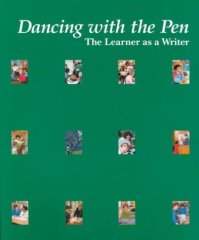 |
Dancing With the Pen: The Learner As a Writer
Author:
Education, New Zealand Staff Ministry Of Staff, Richard C. Owen Publ.
Inc.
ISBN: 0-478-05560-9
LCCN:
Dewey:
Number:
|
Category:
Reference
User Rating: 5.0 Stars
Pages: 152
Paperback Richard C. Owen Publishing
Cursive Teacher's Guide-Contracted Edition
|
Cursive Teacher's Guide-Contracted Edition
Author:
Olsen, Jan Olsen, Jan Z.
ISBN:
1-891627-06-6
LCCN:
Dewey:
Number:
|
Category:
Handwriting
User Rating: 1.0 Stars
Pages: 84
Paperback Handwriting Without Tears
Cursive Success-Contracted Editions
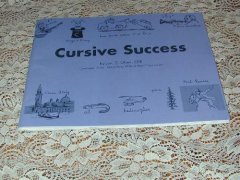 |
Cursive Success-Contracted Editions
Author: Olsen,
Jan Olsen, Jan Z.
ISBN: 1-891627-11-2
LCCN:
Dewey:
Number:
|
Category: Handwriting
User Rating: 5.0
Stars
Pages: 80
Paperback Handwriting Without Tears
Cursive Handwriting - Contracted Edition
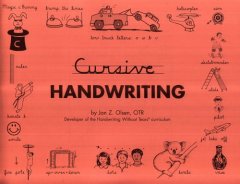 |
Cursive Handwriting - Contracted Edition
Author:
Olsen, Jan Olsen, Jan Z.
ISBN:
1-891627-04-X
LCCN:
Dewey:
Number:
|
Category: Language Arts -
Handwriting
User Rating: 5.0 Stars
Pages: 88
Paperback Handwriting Without Tears
Critical Literacy and Writer's Workshop: Bringing Purpose and Passion to
Student Writing
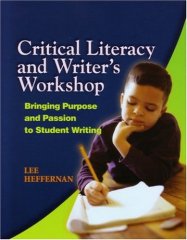 |
Critical Literacy and Writer's Workshop: Bringing Purpose and
Passion to Student Writing
Author: Heffernan, Lee
ISBN: 0-87207-541-9
LCCN: 2004002142
Dewey:
372.62/3 22
Number:
|
Category: English language: creative writing
User Rating:
5.0 Stars
Pages: 96
Paperback International Reading Association
Book Description Do you feel like your students are capable of more when it
comes to writing? You've probably read numerous pieces of writing-about new
pets, baby sisters, or the latest video games-that reflect students' personal
lives rather than new understandings about themselves and the world around them.
This book shows upper elementary-grade teachers how incorporating critical
literacy into writer's workshop will take their students' writing to the next
level. Author Lee Heffernan shares her story of a yearlong project that changed
the type of writing that third-grade students produced as they learned to bridge
their personal lives and social issues through social-narrative writing. This
critical literacy approach to writer's workshop allows students to question
multiple viewpoints, explore sociopolitical issues, and take action to promote
social justice. The chapters provide insight into each step of the author's
journey to help you take the first steps toward implementing this type of
workshop in your classroom. Plus, you'll discover how integrating critical
literacy into writer's workshop allows students to engage in a form of social
action as they actively critique the connections between their personal lives
and society. Use Critical Literacy and Writer's Workshop to reimagine your
teaching and redefine students' writing. From Critical Literacy and Writer's
Workshop: Bringing Purpose and Passion to Student Writing, by Lee Heffernan. ©
2004, International Reading Association.
Creating Young Writers: Using the Six Traits to Enrich Writing Process in
Primary Classrooms
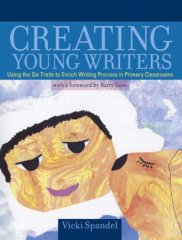 |
Creating Young Writers: Using the Six Traits to Enrich Writing
Process in Primary Classrooms
Author: Spandel, Vicki Lane,
Barry (Foreword)
ISBN: 0-205-37953-2
LCCN:
2003051719
Dewey: 372.62/3 21
Number:
|
Category: English
language: writing skills
User Rating: 4.5 Stars
Pages:
260
Paperback Pearson / Allyn & Bacon
From the Back Cover Creating Young Writers by Vicki Spandel This long-awaited
text offers a most comprehensive exploration of Spandel's effective 6-trait
approach to writing for K-3 teachers. The perfect complement to its phenomenally
successful parent text, Creating Writers, Third Edition, this new text provides
clear guidelines on helping young students draft, assess, and revise their
writing, as well as explicit criteria to show students precisely what they must
do to succeed as writers in virtually any situation-including state tests.
Features Loaded with lesson ideas suitable for students K-3 will help teachers
understand exactly how to teach writing to very beginning writers. (Chs. 3 &
4.) Samples of actual student work, both text and art, offers teachers a clear
understanding of how to recognize strengths and growth in student work (Chs. 2
& 5). Specific examples of how to model writing for students encourage
teachers to try modeling and to write with students as a teaching technique (Ch.
6). Samples of simple student portfolios take the mystery out of creating
student portfolios by showing that portfolios need not be complex or long to
work (Ch. 5). Explanation of how revision looks/works at beginning levels gives
teachers (and students) in-depth understanding of what revision is and how to
teach it (Ch. 5). Step-by-step review of the publishing process offers teachers
and students options for "publishing" text at the classroom level (Ch. 5).
Recommended books for teaching key traits of writing at primary level reinforce
the link between reading and writing and gives even non-writers a way into the
traits (Ch. 7). Analysis of classroom versus large-scale assessment from a
primary education perspective strengthens teachers' understanding of what good
assessment should look like at various levels (Ch. 8). Inside look at four
classrooms that use process and trait-based writing in various ways helps
current or prospective teachers see how many individual forms trait-based
writing can take (Ch. 9). "I really enjoyed reading this book...I think this is
an essential read for primary writing teachers!" Wendy Ellis, Literacy
Specialist, Arkansas State Dept. of Education 'Creating Young Writers will be a
powerful resource for the primary teachers in my class...I find so many great
ideas that I can also recommend this text to my 4-8 teachers. So much applies
directly to the needs of students in middle grades.' Dennis O'Connor, Certified
Online Instructor, Milken National Educator Author Bio Vicki Spandel is a former
language arts teacher, journalist, technical writer, and co-director of the
teacher team that developed the original 6-trait model. She has written or
co-authored more than 25 books for teachers and students, including-most
recently-Creating Writers, 3rd edition (Allyn and Bacon), the Daybooks of
Critical Reading and Writing for Grades 2-5 (Great Source Education Group) and
The Write Traits Classroom Kits, Grades 3-8 (also published by Great Source). In
the course of developing educational materials, Vicki serves as a visiting
teacher in classrooms K-12. She has been the scoring director for more than 80
state, county and district writing assessments. She is currently the lead
trainer for Write Traits, teacher in-service specialists who offer training and
consultation in process-based 6-trait instruction and assessment throughout the
country. About the Author Vicki Spandel is a master teacher and was the
co-director of the original teacher team that developed the 6 Trait model. She
has designed instructional materials for all grade levels and is the author of
numerous books on writing and writing assessment including Creating Writers -
Linking Writing Assessment and Instruction. Vicki is a former language arts
teacher, journalist, technical writer, consultant and scoring director for
dozens of state, county, and district writing assessments. She also serves as
contributing editor to r.w.t, the magazine for reading, writing, thinking.
Creating Support for Effective Literacy Education: Workshop Materials and
Handouts
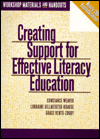 |
Creating Support for Effective Literacy Education: Workshop
Materials and Handouts
Author: Gillmeister-Krause, Lorraine
Weaver, Constance Vento-Zogby, Grace
ISBN:
0-435-08894-7
LCCN: 96033994
Dewey: 372.4/14
20
Number:
|
Category:
Teaching of a specific subject
User Rating: Pages:
324
Spiral-bound Heinemann
Review �Designed for workshop presentation and replete with illustrations,
this very practical manual on literacy strategies will be valuable to teachers
as well as parents. Materials, culled from many sources, from whom permission to
reproduce has been secured, are an asset to this publication.��The New
Advocate Product Description Designed for workshop presentation and
replete with illustrations, this very practical manual on literacy strategies
will be valuable to teachers as well as parents. Materials, culled from many
sources, from whom permission to reproduce has been secured, are an asset to
this publication. - The New Advocate In helping others to understand how reading
and writing flourish in whole language classrooms, have you ever wished for
materials that clearly convey what we know about effective teaching and learning
of literacy? This indispensable resource provides everything you need, including
just the right transparencies, brochures, and fact sheets. It's been proven that
by treating reading and writing as gradually emerging processes rather than
skills to be taught and mastered in isolation, children not only become
proficient, but also develop a lifetime love of reading and writing. But when
parents and administrators hear only about literacy activities without details
on how teachers "teach" children to read and write, they understandably become
concerned. "What about phonics and spelling?" they ask. This book addresses the
need, then, to help others understand the nature of learning and the processes
of language and literacy development, as well as some of the specific things
teachers do to nurture independent and competent readers and writers. Part I
contains eight sections, made up of materials that can be copied directly onto
transparencies, on learning theory, language acquisition, the reading process,
teaching and learning reading, phonics, reading strategies, writing, and
assessment. Each set is accompanied by suggestions for using the transparencies,
relevant anecdotes about the authors' experiences using them, background
information from research, and sources and resources. The transparencies can be
selected and organized in any order to fit your individual needs. Part II
includes fliers, letters, brochures, and fact sheets on various topics relating
to emergent literacy and teaching practice, all of which can also be copied and
distributed as needed. Though designed primarily for workshops and weekend
courses, Creating Support for Effective Literacy Education is also appropriate
for regular college courses focusing on professional development and inservice
teacher training.
Creating Strategic Readers: Techniques for Developing Competency in Phonemic
Awareness, Phonics, Fluency, Vocabulary, and Comprehension
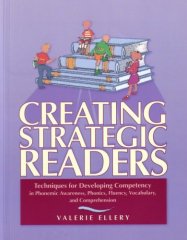 |
Creating Strategic Readers: Techniques for Developing Competency in
Phonemic Awareness, Phonics, Fluency, Vocabulary, and
Comprehension
Author: Ellery, Valerie
ISBN:
0-87207-561-3
LCCN: 2004024963
Dewey: 372.41
22
Number:
|
Category:
English language: reading skills
User Rating: 4.5
Stars
Pages: 252
Paperback International Reading Association
Education Librarian Well-organized, thoughtful, and provides a comprehensive
framework to aid any teacher in effectively teaching to state standards and
Reading First. Product Description The days of stressing the acquisition of
reading skills in isolation are in the past. To develop lifelong readers, it is
vital for teachers to also show students how to apply these reading skills
strategically to acquire meaning from text. This book is a comprehensive
resource you can use to better equip yourself in the craft of teaching reading.
Author Valerie Ellery first lays the groundwork for a comprehensive literacy
classroom, detailing appropriate curriculum, assessment, and instruction. She
then focuses on the five essential components of reading instruction identified
in the 2000 National Reading Panel report-phonemic awareness, phonics, fluency,
vocabulary, and comprehension-to align instruction with current standards. You
will learn how to implement the components into your instruction with techniques
that foster active, strategic reading. Each technique identifies corresponding
multiple intelligences and developmental levels of reading so you can determine
which approach is best suited for each student's specific learning style and
reading need. Because scaffolding and teacher talk are essential to successful
instruction, procedures for modeling the techniques and examples of teacher talk
are provided throughout the book. Ultimately, you will learn how to gradually
release responsibility for learning to students and guide them in becoming
strategic, independent readers.
Creating Classrooms for Authors and Inquirers
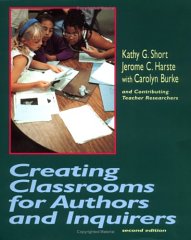 |
Creating Classrooms for Authors and Inquirers
Author:
Harste, Jerome C. Short, Kathy Gnagey Burke, Carolyn Harste, Jerome C.
Burke, Carolyn
ISBN: 0-435-08850-5
LCCN:
95018854
Dewey: 372.6 20
Number:
|
Category:
Literacy
User Rating: 4.5 Stars
Pages: 640
Paperback Heinemann
Review �Perhaps the richest source of practical, concrete structures for
running a whole language classroom.��Rethinking Schools on the first
edition Product Description Perhaps the richest source of practical,
concrete structures for running a whole language classroom. - Rethinking Schools
on the first edition How do you set up supportive classrooms in which children
can become real readers, writers, and inquirers? Can it be done every day,
across the curriculum? In the first edition, Short, Harste, and Burke presented
practical theory of literacy instruction based on their work with classroom
teachers. Their aim was to show practicing and preservice elementary teachers
how to create the best possible literacy-learning environment. In this second
edition, the authors offer more ideas and rich descriptions of how their
curriculum moved from writing and reading to include inquiry. Creating
Classrooms for Authors and Inquirersrepresents their latest thinking, along with
lingering questions and new concerns. The first half of the book focuses on the
authoring cycle and the ways in which Short, Harste, Burke, and other
teacher-researchers have used the cycle as a curricular framework. The authors
share their work within the writing curriculum, then move to the reading
curriculum, and finally to rethinking curriculum as inquiry. They also discuss
issues related to maintaining a community of inquirers. The second half of the
book contains more detailed descriptions of curricular engagements within the
authoring cycle framework, such as authors folder, bookmaking, and readers
theatre. These classroom strategies have already worked for hundreds of
teachers, and Short, Harste, and Burke are at their practical best as they share
them with you. Extensive samples of student work are included. The ideas and
experiences expressed in this volume are the result of a group of people who
have worked together, thought together, and built from the work of others over
time. Creating Classrooms for Authors and Inquirers is a resource you will refer
to again and again.
Creating an Integrated Approach to Literacy Instruction
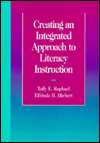 |
Creating an Integrated Approach to Literacy
Instruction
Author: Raphael, Taffy E. Hiebert, Elfrida H.
ISBN: 0-03-051554-8
LCCN: 95081597
Dewey:
372.6/00044 20
Number:
|
Category: Literacy
User Rating: 5.0
Stars
Pages: 319
Paperback Wadsworth Publishing
Product Description Presents a social constructivist approach to the teaching
of reading. Includes theory, curriculum, two case studies, and material on
comprehension and assessment within whole literary environments.
A Coordinator's Guide to Help America Read: A Handbook for
Volunteers
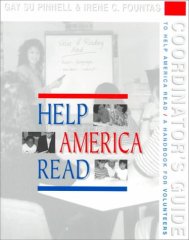 |
A Coordinator's Guide to Help America Read: A Handbook for
Volunteers
Author: Fountas, Irene C. Pinnell, Gay Su
Pinnell, Gay Su
ISBN: 0-435-07252-8
LCCN:
97228514
Dewey: 371.14/124 21
Number:
|
Category: Charities &
voluntary services
User Rating: 4.0 Stars
Pages: 144
Paperback Heinemann
Product Description If you have the challenging task of coordinating literacy
volunteers, you want the best information available on building a high-quality
program along with practical suggestions on effective training. This outstanding
resource from Gay Su Pinnell and Irene Fountas offers both. It provides
everything you need to know to run a successful program, no matter who the
volunteers are or where they are working. Research has shown that to run an
effective volunteer program, the coordinator must provide strong leadership,
solid training, and careful monitoring. Pinnell and Fountas help you achieve
these goals, offering: specific training in ten ways to help children read and
write; practical advice on recruiting, orienting, organizing, supervising, and
advising volunteers; an extended training program, detailing twelve training
sessions; a single session training program - for coordinators who must provide
training quickly; thirty-nine transparencies, sample letters to parents, and
recognition certificates; and specific instructions on how volunteers can
connect with children's families. Well-planned volunteer service will greatly
enhance our efforts to make literacy a reality for all children. And the
leader's contribution is of immeasurable value. This guide will help you make
that experience worthwhile for everyone involved - the children served as well
as those who serve them. About the Author Irene C. Fountas, a professor in the
School of Education at Lesley University in Cambridge, Massachusetts, has been a
classroom teacher, language arts specialist, and consultant in school districts
across the nation and abroad. She works extensively in the literacy education
field and directs the Literacy Collaborative in the School of Education at
Lesley University. Together with Gay Su Pinnell she has authored numerous books,
videos, and websites with Heinemann that are now considered standards in the
field of literacy instruction and staff development. Their latest innovation is
The Fountas and Pinnell Benchmark Assessment System, a comprehensive assessment
system for grades K - 8. Visit
http://www.fountasandpinnellbenchmarkassessment.com for details.Fountas and
Pinnell have influenced the classroom practices of teachers nationwide through
bestselling books such as: The Continuum of Literacy Learning, Grades K - 8
(2007) The Continuum of Literacy Learning, Grade Gay Su Pinnell is a professor
in the School of Teaching and Learning at The Ohio State University. She has
extensive experience in classroom teaching and field-based research, and in
developing comprehensive approaches to literacy education. She has received the
International Reading Association's Albert J. Harris Award for research and the
Charles A. Dana Foundation Award for her contributions to the field of
education. She is also a member of the Reading Hall of Fame. Together with Irene
Fountas she has authored numerous books, videos, and websites with Heinemann
that are considered standards in the field of literacy instruction and staff
development. Their latest innovation is The Fountas and Pinnell Benchmark
Assessment System, a comprehensive assessment system for grades K - 8. Visit
fountasandpinnellbenchmarkassessment.com for details. Fountas and Pinnell have
influenced the classroom practices of teachers nationwide through bestselling
titles such as: The Continuum o
Content Knowledge: A Compendium of Standards and Benchmarks for K-12
Education, 2nd edition
 |
Content Knowledge: A Compendium of Standards and Benchmarks for
K-12 Education, 2nd edition
Author: Kendall, John S.
Marzano, Robert J.
ISBN: 0-87120-301-4
LCCN:
97037866
Dewey: 379.1/58 21
Number:
|
Category:
Finance
User Rating: 5.0 Stars
Pages: 651
Paperback McRel
Book Description Are you familiar with the education standards developed by
the National Council of Teachers of Mathematics? The science standards developed
by the National Research Council? The science "literacy goals" proposed by the
American Association for the Advancement of Science? In Content Knowledge you'll
find information on all the major subject areas, organized to allow you and
others in your school or district to quickly and easily explore the variety of
education standards and benchmarks in use today. The authors have consulted 116
national and state-level documents that address standards and benchmarks. By
putting all the standards in a clear, consistent format, they have streamlined
the process of developing standards-based curriculum and instruction in K-12
mathematics, science, history, language arts, the arts, technology, civics,
economics, foreign languages, health, physical education, behavioral studies,
and life skills. In each subject, you'll find clear and succinct summaries of
standards and benchmarks at various grade levels, K-12. Benchmarks are keyed to
three broad categories of knowledge (procedural, declarative, or contextual
knowledge), making it easy to identify targets for learning at every level.
There are more than 250 standards and 3,900 benchmarks in all. Whether used as a
resource for creating new standards or as a reference for validating existing
standards, Content Knowledge is an indispensable resource for every school.
Content Area Literacy: An Integrated Approach
[ILLUSTRATED]
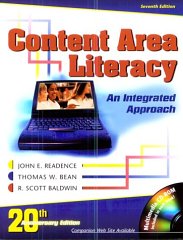 |
Content Area Literacy: An Integrated Approach
[ILLUSTRATED]
Author: Readence, John E. Bean, Thomas W.
Baldwin, R. Scott Bean, Thomas W. Baldwin, R. Scott
ISBN:
0-7872-7648-0
LCCN: 00110678
Dewey: 428.4/071/2
21
Number:
|
Category:
Literacy
User Rating: 3.0 Stars
Pages: 356
Paperback Kendall/Hunt Publishing Company
Book Description A book/CD-ROM package focused on promoting literacy
education to preservice and inservice middle and secondary school teachers. Part
A contains five chapters introducing content area literacy, discussing multiple
literacies, technology and literacy, the sociopolitical nature of textbooks, and
assessment. Part B consists of seven chapters of strategies for teaching and
learning in content areas, with material on lesson planning, multicultural
literature, and writing. The companion CD-ROM is new to this edition and
contains some 500 pages of original source material and professional articles,
The Call of the Wild in its entirety, short stories and poems, and video and
audio clips demonstrating instructional strategies. Readence teaches education
at the University of Nevada. Annotation c. Book News, Inc., Portland, OR
(booknews.com)
Comprehensive Reading Instruction Across the Grade Levels: A Collection of
Papers from the Reading Research 2001 Conference
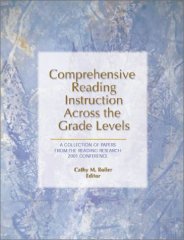 |
Comprehensive Reading Instruction Across the Grade Levels: A
Collection of Papers from the Reading Research 2001
Conference
Author: (2001), Reading Research Conference
Roller, Cathy M. (Editor) Roller, Cathy M.
ISBN:
0-87207-347-5
LCCN: 2002009342
Dewey: 372.4
21
Number:
|
Category:
English language: reading skills
User Rating: 4.0
Stars
Pages: 184
Paperback International Reading Association
Book Description Comprehensive reading instruction across the grade levels is
necessary for our schools to produce a literate population, although defining
the concept has proven complicated for researchers, teacher educators, and
classroom teachers alike. Based on papers presented at the Association's Reading
Research 2001 Conference of the same name, this volume provides snapshots of
comprehensive reading instruction, highlights gaps in the knowledge base, and
serves as an impetus to further investigation. This collection provides a wide
range of perspectives about a variety of topics relevant to reading instruction
at each stage of children's development. It also discusses areas of reading
education in which more research is necessary. About the Author Cathy M. Roller
is Director of Research and Policy for the International Reading Association,
Newark, DE, USA.
Comprehensive Reading Assessment
|
Comprehensive Reading Assessment
Author: No Author
ISBN: 1-56936-895-3
LCCN:
Dewey:
Number:
|
Category:
Language Arts - General
User Rating: 4.5 Stars
Pages:
0
Paperback Options Pub Inc
Comprehension Strategies for Middle Grade Learners: A Handbook for Content
Area Teachers
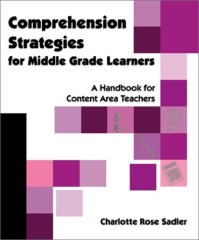 |
Comprehension Strategies for Middle Grade Learners: A Handbook for
Content Area Teachers
Author: Sadler, Charlotte Rose
ISBN: 0-87207-292-4
LCCN: 2001003584
Dewey:
428.4/071/2 21
Number:
|
Category: Literacy
User Rating: 4.5
Stars
Pages: 81
Paperback International Reading Association
Book Description When students have poor reading comprehension skills,
educators across the curriculum face a daunting task. Help is at hand in this
new collection of easy-to-use classroom-tested strategies for middle school
teachers in the content areas. Comprehension Strategies for Middle Grade
Learners: A Handbook for Content Area Teachers arms teachers in all curricular
areas with practical tools to help students understand their assigned readings.
Each of the 56 strategies includes a brief description and easy-to-follow
procedures, content area examples, and suggestions for assessment. Depending on
the reading differences in the classroom, these strategies can be used with
individuals, small groups, or the entire class. About the Author Charlotte Rose
Sadler is a classroom teacher in the Gwinnett County Public Schools,
Lawrenceville, Georgia, USA
Comprehension Instruction: Research-Based Best
Practices
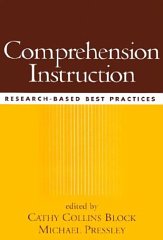 |
Comprehension Instruction: Research-Based Best
Practices
Author: Block, Cathy Collins (Editor) Pressley,
Michael (Editor) Pressley, Michael
ISBN:
1-57230-692-0
LCCN: 2001040933
Dewey: 428.4/3
21
Number:
|
Category:
Cognition & cognitive psychology
User Rating: 5.0
Stars
Pages: 414
Paperback The Guilford Press
Review
"The importance of this timely volume cannot be overstated. It provides an
essential counterbalance to the strong emphasis on decoding research that is
currently so influential in educational policy. Researchers, students, and
professionals from a wide variety of disciplines will find much of value in this
very up-to-date and complete volume. Featured are readable summaries of research
in particular areas, evidence-based practice guidelines, and clear outlines of
future research needs. This is truly an excellent resource."--Anne van Kleeck,
PhD, Department of Communication Sciences and Disorders, University of Georgia
"This book offers a detailed, comprehensive, yet readable presentation of
current research-based understandings of effective comprehension instruction,
from the initial stages of reading acquisition through college literacy
instruction. Chapters from leading scholars demonstrate the complex nature of
comprehension and the complex task of teaching students to construct meaning
from text. The book provides teacher educators with a solid framework for
introducing effective comprehension instruction to teachers-in-training. Working
teachers, for their part, will find it a wonderful resource for developing
instruction and instructional routines based on up-to-date theory and
research."--Timothy Rasinski, PhD, Department of Teaching, Leadership, and
Curriculum Studies, College and Graduate School of Education, Kent State
University "In this unique volume, Block and Pressley give us comprehension,
comprehensively addressed. They have brought together researchers and educators
who fundamentally reconceptualized the nature of reading comprehension in the
last quarter of the 20th century, as well as those who have elaborated and
extended those insights. For teachers and graduate students, here is a robust
agenda for effective comprehension development and instruction across a range of
developmental levels, genres, formats, contexts, and individual learner
characteristics."--Shane Templeton, PhD, Department of Curriculum and
Instruction, College of Education, University of Nevada, Reno "From new looks at
familiar topics, such as metacognitive strategies and schema theory, to emerging
topics such as comprehension of morals and themes and critical reading, this
book brings comprehension instruction fully up to date. Each chapter moves
research clearly into practice, so that there is something here for practicing
elementary and secondary teachers, for researchers, and for teacher educators
and graduate students. I found something new and useful in every
chapter."--Steven A. Stahl, EdD, Department of Reading Education, College of
Education, The University of Georgia; Codirector, Center for the Improvement of
Early Reading Achievement (CIERA)
Collected Perspectives: Choosing and Using Books for the
Classroom
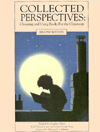 |
Collected Perspectives: Choosing and Using Books for the
Classroom
Author: Moir, Hughes (Editor)
ISBN:
0-926842-12-9
LCCN:
Dewey:
Number:
|
Category:
General
User Rating: 5.0 Stars
Pages: 417
Paperback Christopher-Gordon Publishers
Classrooms That Work: They Can All Read and Write
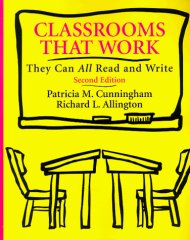 |
Classrooms That Work: They Can All Read and Write
Author:
Cunningham, Patricia M. Allington, Richard L. Allington, Richard L.
Cunningham, Patricia Marr
ISBN: 0-321-01339-5
LCCN:
97052381
Dewey: 372.6/044 21
Number:
|
Category: Elementary
School Language Arts
User Rating: 4.5 Stars
Pages: 284
Paperback Allyn & Bacon
From the Publisher Designed for courses focusing on instructional reading
methods for struggling and culturally diverse students, this affordable text
assists preservice and in-service teachers in enriching the learning and reading
skills of ALL children. Literacy movements and philosophies are subject to a
pendulum effect, but renowned authors Cunningham and Allington promote the
integration of phonics and literature-based process writing and reading
instruction for a more balanced approach. The book helps ALL children engage in
meaning-centered reading by showing teachers how to foster powerful decoding and
comprehension strategies. This book is filled with workable, practical
strategies and activities to use in the classroom. Booknews This education
textbook provides strategies for helping children learn to read and write in
elementary school. The authors suggest specific activities for encouraging
recognition of letter-sound patterns, decoding and spelling, thinking while
writing, and interest in science and social studies. The third edition adds
chapters on multilevel instruction, assessment, and comprehension. Annotation c.
Book News, Inc., Portland, OR (booknews.com) Synopsis Designed for courses
focusing on instructional reading methods for struggling and culturally diverse
students, this affordable text assists preservice and in-service teachers in
enriching the learning and reading skills of ALL children. Literacy movements
and philosophies are subject to a pendulum effect, but renowned authors
Cunningham and Allington promote the integration of phonics and literature-based
process writing and reading instruction for a more balanced approach. The book
helps ALL children engage in meaning-centered reading by showing teachers how to
foster powerful decoding and comprehension strategies. This book is filled with
workable, practical strategies and activities to use in the classroom. Booknews
This education textbook provides strategies for helping children learn to read
and write in elementary school. The authors suggest specific activities for
encouraging recognition of letter-sound patterns, decoding and spelling,
thinking while writing, and interest in science and social studies. The third
edition adds chapters on multilevel instruction, assessment, and comprehension.
Annotation c. Book News, Inc., Portland, OR (booknews.com)
Classrooms That Work They Can All Read and Write
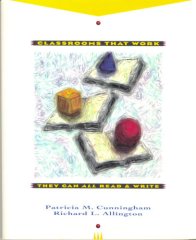 |
Classrooms That Work They Can All Read and Write
Author:
Cinningham, Patricia M.
ISBN: 0-673-98449-4
LCCN:
Dewey:
Number:
|
Category: User Rating: 4.5 Stars
Pages:
0
Paperback Harper/Collins Publishing
Classroom Instruction That Works With English Language
Learners
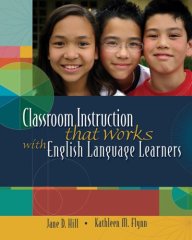 |
Classroom Instruction That Works With English Language
Learners
Author: Hill, Jane D. Flynn, Kathleen M.
ISBN: 1-4166-0390-5
LCCN: 2006014599
Dewey:
428.2/4 22
Number:
|
Category: Bilingual Education
User Rating: 5.0
Stars
Pages: 144
Paperback Association for Supervision & Curriculum Deve
Book Description As more and more English language learners (ELLs) are
included in mainstream classrooms, what can we do to ensure that they understand
academic content and develop their English language skills? To answer this
question, authors Jane Hill and Kathleen Flynn have examined decades of
research, interviewed mainstream teachers with ELLs in their classrooms, and
reviewed the classroom recommendations from Marzano, Pickering, and Pollock's
seminal Classroom Instruction That Works (2001) through an ELL lens. The result
is Classroom Instruction That Works with English Language Learners-a
comprehensive guide to helping elementary school students at all levels of
English language acquisition succeed. The strategies discussed in the book
include homework and practice, summarization and note taking, and use of
nonlinguistic representations, among many others. For each strategy, the authors
provide a summary of the research, detailed examples of how to modify the
strategy for use with ELLs in mainstream classrooms, and teacher accounts of
implementation. Because ELLs face cultural hurdles as well as linguistic ones,
this book also shows teachers how to glean insight into students' backgrounds
and address the cultural biases inherent in many classroom practices.
Accommodating English language learners is one of the greatest challenges
educators face today. Just as different levels of fluency require different
approaches, so too do different backgrounds and languages. This practical,
research-based book gives elementary school teachers the guidance they need to
help ELLs of all nationalities thrive alongside their English-dominant peers.
Classics in Literacy Education: Historical Perspectives for Today's
Teachers
 |
Classics in Literacy Education: Historical Perspectives for Today's
Teachers
Author: Robinson, Richard David
ISBN:
0-87207-174-X
LCCN: 2001005969
Dewey: 428.4/071
21
Number:
|
Category:
Literacy
User Rating: 4.0 Stars
Pages: 141
Paperback Intl Reading Assn
Book Description There can be but two real goals toward which we aim in
teaching reading-or, more precisely, a single goal with two aspects: to teach
children to read well and to love to read. Arthur Gates (1890-1972) These two
threads are the common theme that runs throughout the writings of past educators
included in Classics in Literacy Education: Historical Perspectives for Today's
Teachers. Excerpts from classic authors A. Sterl Artley, Emmett Betts, Richard
de Bury, Arthur Gates, William S. Gray, Helen Robinson, David H. Russell, Nila
Banton Smith, and George Spache touch on a variety of topics facing today's
reading teachers. In addition to presenting selections of each writer's work,
author Robinson provides an overview of the writer's professional life and
includes a list of annotated resources for further reading. Each chapter ends
with "Reflections" to stimulate teachers to think about the words of past
educators, and reevaluate their own classroom instruction. Classics in Literacy
Education shows all reading educators-specifically inservice teachers,
preservice teachers, reading researchers, and those involved in reading teacher
preparation-that the perspectives of classic writers in the history of reading
instruction are important and relevant to their current practice. ©2002 | 152 pp
| ISBN: 0-87207-174-X | 174-553 | General About the Author Richard D. Robinson
is a professor of education at the University of Missouri-Columbia, Columbia,
Missouri, USA.
Can-do Cursive: Grade 5
|
Can-do Cursive: Grade 5
Author: Olsen, Jan Fine,
Edith H. Fine, Edith H. Mallett, Jef
ISBN:
1-891627-31-7
LCCN:
Dewey:
Number:
|
Category: Language Arts -
Handwriting
User Rating: 4.0 Stars
Pages: 96
Paperback Handwriting Without Tears
By Different Paths to Common Outcomes
 |
By Different Paths to Common Outcomes
Author: Clay,
Marie M.
ISBN: 1-57110-087-3
LCCN:
Dewey:
Number:
|
Category:
Sociology, Social Studies
User Rating: 4.0 Stars
Pages:
288
Paperback Stenhouse Publishers
Knowledge Quest, Volume 27/Number 4, March/April 1999 Well-known for her work
with early literacy intervention, Marie M. Clay has authored these essays to
focus on the development of literacy awareness, the power of writing in early
literacy encounters, and the use of conversation as a tool for improving
teaching. Librarians will be interested, for example, in her advice about
introducing storybooks to young children in ways that encourage them to become
independent readers. By providing "practical examples" and well-researched,
reasoned discussion," this volume can serve as the basis for teacher-librarian
study-group discussions on early literacy. From the Back Cover I am interested
in having schools be ready for the differences that their school entrants will
display across the entire range of competencies. If we notice children taking
different paths we can interact with their different journeys just as we would
alter our talking to adapt to our listeners and in a couple of years expect them
to arrive at common outcomes. Marie M. Clay This collection of readings is about
all children and the early years of schooling. It brings together for educators
and classroom teachers significant new, previously unpublished articles
(Chapters 4, 10, and 14) as well as several of Dr. Clay's seminal papers. Here
she reiterates for new teachers many of the concerns that lie at the heart of
her work with young children - the sensitive observation of the constructive
child, the challenges of early encounters with how we put language down in print
(Concepts About Print), introducing storybooks to children, and how we can
better adapt to diversity in our classrooms. Other emphases that emerge in her
new articles call for changes in how teachers think about three things: literacy
awareness as it develops before and after the transition to school, the power of
writing for all children in early literacy encounters, and conversation as a
tool for vastly improving teaching interactions. Marie Clay focuses on many
reciprocal connections - how one kind of learning supports another - between
oral language and reading, between writing and reading, between theory and
practice. She believes that practice informs theory and theory informs practice
in a circular and continuing set of relationships. Teachers who want to go
beyond their present practice must get into the writings of those who challenge
their expectations on how best to meet the needs of their very diverse children.
Each chapter in this collection - from the glimpses of some fascinating children
to some strong challenges to basic assumptions about literacy teaching - could
provide a centerpiece for a workshop, the background reading for several group
discussions, or an opportunity for practicing teachers to bring their experience
face to face with a text that challenges. As Margaret Mooney writes in her
foreword, "Marie Clay knows how to ask the niggling questions and to prompt and
probe the uncomfortable issues. But readers of this collection will realize she
is equally skilled in providing practical examples and well-researched, reasoned
discussion for the road she chooses . . . This book is not a
one-read-is-sufficient publication. It is a companion for frequent dipping and
delving, thinking and questioning, challenging and confirming. We'll all find
different paths to common outcomes."
Building Reading Comprehension Habits in Grades 6-12: A Toolkit of Classroom
Activities
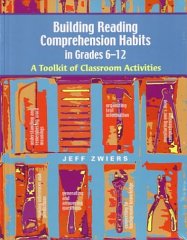 |
Building Reading Comprehension Habits in Grades 6-12: A Toolkit of
Classroom Activities
Author: Zwiers, Jeff
ISBN:
0-87207-539-7
LCCN: 2003026929
Dewey: 428.4/071/2
22
Number:
|
Category:
English language: reading skills
User Rating: 5.0
Stars
Pages: 224
Paperback International Reading Association
Book Description Building Reading Comprehension Habits in Grades 6-12 offers
middle school and high school teachers in all curricular areas research-based,
innovative activities to strengthen students' reading comprehension. The
activities in the book are organized around six automatic habits of reading
comprehension that help proficient readers actively construct meaning as they
read: 1) Organizing text information by sculpting the main idea and summarizing
2) Connecting to background knowledge 3) Making inferences and predictions 4)
Generating and answering questions 5) Understanding and remembering word
meanings 6) Monitoring one's own comprehension The chapters define and describe
the habits, then provide activities that you can use to strengthen students' use
of the habits. Each activity offers a brief description of the activity's
purpose and a step-by-step procedure for putting it into place. SPECIAL FEATURE:
Most activities offer reproducible graphic organizers reproducible graphic
organizers and variations on the activities to help English language learners,
struggling readers, and other students who need extra support. AUDIENCE: Middle
school and high school preservice and inservice teachers, teacher educators,
remedial teachers, reading specialists, supervisors and administrators.
Building Background Knowledge For Academic Achievement: Research On What
Works In Schools
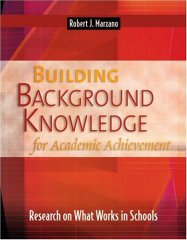 |
Building Background Knowledge For Academic Achievement: Research On
What Works In Schools
Author: Marzano, Robert J.
ISBN: 0-87120-972-1
LCCN: 2004009792
Dewey:
371.2/03/0973 22
Number:
|
Category: Administration - General
User Rating: 5.0
Stars
Pages: 219
Paperback Association for Supervision & Curriculum Deve
Book Description In Building Background Knowledge for Academic Achievement,
Robert J. Marzano shows how a carefully structured combination of two
approaches--sustained silent reading and instruction in subject-specific
vocabulary terms--can help overcome the deficiencies in background knowledge
that hamper the achievement of many children. Readers will learn * The
principles that underlie an effective sustained silent reading program * A
five-step process for using sustained silent reading to enhance background
knowledge * The defining characteristics of effective vocabulary instruction * A
six-step process for direct instruction in vocabulary in each discipline * The
vocabulary terms critical to students' success in every academic subject
Vignettes suggest how the recommended reading and vocabulary instruction
programs might be implemented in elementary schools, middle and junior high
schools, and high schools. The book also includes a list of 7,923 vocabulary
terms culled from the national standards documents and other publications,
organized into 11 subject areas and 4 grade-level categories. With its
research-based recommendations and step-by-step approach, Building Background
Knowledge equips educators with the tools they need to help close the
achievement gap and enable all students to succeed. Download Description In
Building Background Knowledge for Academic Achievement, Robert J. Marzano shows
how a carefully structured combination of two approaches-sustained silent
reading and instruction in subject-specific vocabulary terms-can help overcome
the deficiencies in background knowledge that hamper the achievement of many
children. Readers will learn * The principles that underlie an effective
sustained silent reading program * A five-step process for using sustained
silent reading to enhance background knowledge * The defining characteristics of
effective vocabulary instruction * A six-step process for direct instruction in
vocabulary in each discipline * The vocabulary terms critical to students'
success in every academic subject Vignettes suggest how the recommended reading
and vocabulary instruction programs might be implemented in elementary schools,
middle and junior high schools, and high schools. The book also includes a list
of 7,923 vocabulary terms culled from the national standards documents and other
publications, organized into 11 subject areas and 4 grade-level categories. With
its research-based recommendations and step-by-step approach, Building
Background Knowledge equips educators with the tools they need to help close the
achievement gap and enable all students to succeed.
Building a Knowledge Base in Reading
 |
Building a Knowledge Base in Reading
Author:
Braunger, Jane Lewis, Jan Patricia
ISBN:
0-87207-575-3
LCCN: 2005020170
Dewey: 428.4/071
22
Number:
|
Category:
English language: reading skills
User Rating: 5.0
Stars
Pages: 216
Paperback International Reading Association
Product Description Use this updated edition of Building a Knowledge Base in
Reading to make sound decisions about instructional programs and materials.
You'll find a broad and balanced perspective for building your practice around
the best possible evidence-based reading research. Updates include expanded core
understandings that give implications for students at all levels, teacher
resources that will help you translate these understandings into classroom
practice, and chapter summaries that will help you pull together key ideas.
Bringing Words to Life: Robust Vocabulary Instruction
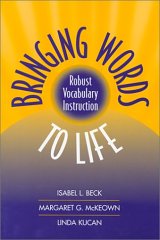 |
Bringing Words to Life: Robust Vocabulary
Instruction
Author: Beck, Isabel L. McKeown, Margaret G.
Kucan, Linda McKeown, Margaret G. Kucan, Linda
ISBN:
1-57230-753-6
LCCN: 2001055678
Dewey: 428.1/071
21
Number:
|
Category:
English grammar
User Rating: 4.5 Stars
Pages: 148
Paperback The Guilford Press
Review "Vocabulary is the bedrock supporting academic language proficiency.
Without any doubt, speech-language pathologists recognize the critical
importance of vocabulary learning for children and adolescents struggling with
language and literacy learning. The challenge is how we can better support
genuine vocabulary learning so that struggling students will be better
positioned to meet the new reading and writing standards. This book offers
speech-language pathologists a strong conceptual framework and evidence-based
strategies for achieving the goal of functional vocabulary learning. The rich
and detailed strategies are presented in a highly readable way. This
accessibility allows the creative speech-language clinician to find many ideas
that can easily be adapted into meaningful strategies for boosting the authentic
word knowledge that most students with language learning disabilities urgently
need for attaining academic language proficiency."--Elaine R. Silliman, PhD,
Department of Communication Sciences and Disorders, University of South Florida
"This little book is a gem. It shows how teachers can teach word meanings so
powerfully that students of all ages will be able to grasp an author's meaning
or communicate their own more effectively. The book offers a well-organized and
first-rate plan for teaching vocabulary, presented by a team of researchers with
a genuine grasp of the practical."--Timothy Shanahan, PhD, Center for Literacy,
University of Illinois at Chicago "This book succinctly addresses the challenges
of teaching and developing vocabulary, providing research-based, clearly
spelled-out strategies and many, many rich examples. It gives teachers the tools
they need to effectively increase students' vocabularies. Reflecting the
authors' own expertise with words, the book is written clearly enough for
undergraduates, yet has a level of depth that will lend new insights to even the
most advanced student of language and literacy. This book should be required
reading in teacher and reading specialist preparation programs and should be
used in in-service programs with reading, language arts, and English teachers as
well as with content area teachers. If the strategies and suggestions offered in
this book were widely and intensely implemented, we would see significant
increases in students' verbal abilities and reading comprehension scores."--John
J. Pikulski, PhD, School of Education, University of Delaware "Bringing Words to
Life lives up to its title. It made me want to gather a group of kids
immediately, so I could start putting these sensible, practical, novel, and
intriguing ideas about building vocabulary into practice. Beck, McKeown, and
Kucan show how much fun learning words and teaching words can be. Every early
childhood and elementary teacher should have this book on their bedside table
for inspirational reading."--Catherine E. Snow, PhD, Graduate School of
Education, Harvard University "All educators who are lovers of the English
language will thoroughly enjoy and reap the benefits of this articulate book.
The authors present a brilliant rationale for delivering lively and direct
vocabulary instruction. They offer excellent advice on how to select rich words,
present them to students, and help them revel in their usefulness!"--MaryAnne
Rossbach, MEd, sixth-grade teacher, Sunrise Valley Elementary School, Reston, VA
Book Club: A Literature-Based Curriculum
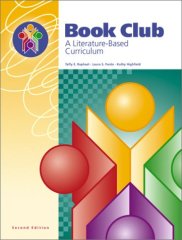 |
Book Club: A Literature-Based Curriculum
Author:
Raphael, Taffy E. Pardo, Laura S. Highfield, Kathy Pardo, Laura S.
Highfield, Kathy
ISBN: 1-931376-07-7
LCCN:
Dewey:
Number:
|
Category: Teaching Methods & Materials - Reading
User
Rating: 4.0 Stars
Pages: 304
Paperback Small Planet Communications, Inc. - Lawrence, MA 01840
Book Description Completely revised and updated, this new edition brings
fresh insights to the popular Book Club program. Based on the latest classroom
research, it helps teachers engage all students with age-appropriate literature,
and its unique approach to student-led book discussions is supported by a full
range of literacy activities. A clear overview of the Book Club program is
supplemented by new chapters on comprehension, writing, assessment, and
classroom management. Complete thematic teaching units for four novels include
related readings, unit projects, and correlations to language arts and social
studies standards. An additional multi-book unit demonstrates how to teach with
several novels at once for more lively and engaging classroom discussions.
Innovative blackline masters support writing, comprehension, and assessment.
Book Club Plus! a Literacy Framework for the Primary
Grades
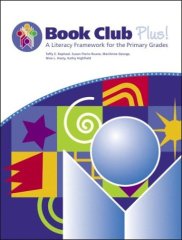 |
Book Club Plus! a Literacy Framework for the Primary
Grades
Author: Raphael, Taffy E. Florio-Ruane, Susan George,
Marianne Hasty, Nina Highfield, Kathy
ISBN:
1-931376-35-2
LCCN:
Dewey:
Number:
|
Category: Administration
- General
User Rating: 5.0 Stars
Pages: 352
Paperback Small Planet Communications
From the Publisher This highly-anticipated addition to the Book Club series
builds on solid methodology and 10 years of classroom research. Book Club Plus!
presents a framework for instruction that allows primary-grade teachers to
achieve important goals: meeting the dual obligations of literacy
instruction-letting children work in meaningful ways with texts that are both
age- and reading-level appropriate including substantive content in a literacy
curriculum to make learning to read not just a process, but an exploration of
ideas and content organizing all literacy activities and routines in the
classroom to make reading, writing, and talking support one another as children
learn building a classroom environment that meets the needs of all learners
within a coherent organizational framework meeting state and district standards
while promoting a love of reading and learning Book Club Plus! A Literacy
Framework for Primary Grades addresses each of these goals and presents the
research and practices behind them. It also offers practical advice on adapting
Book Club Plus! to any primary-grade classroom in any school district.
Introductory chapters cover such topics as content and curriculum, writing, talk
in the classroom, assessment and classroom management. Other resources include
sample lesson plans and schedules, theme-based unit guides, detailed book lists
and book synopses, assessment resources, and reproducibles. Author Biography:
Taffy E. Raphael, Ph.D., is a member of the Curriculum & Instruction faculty
in Literacy Education at the University of Illinois at Chicago, teaching courses
related to methods of instruction, teacher research, and related topics. Prior
to joining the UIC faculty, Dr. Raphael has taught and conducted research at the
University of Utah, Michigan State University, and Oakland University. Dr.
Raphael's work in teacher education was recognized by her receipt of the
Outstanding Teacher Educator in Reading Award from the International Reading
Association, May, 1997. Dr. Raphael's research has focused on Question Answer
Relationships and strategy instruction in writing, and, for the past decade,
Book Club, a literature-based reading program. Throughout these research
projects, she has studied teacher learning and professional development through
teacher study groups. She has published in journals such as Reading Research
Quarterly, Research in the Teaching of English, The Reading Teacher, and
Language Arts. She has co-authored and edited several books on literacy
instruction, including The Book Club Connection: Literacy Learning and Classroom
Talk (Teachers College Press, 1997), Book Club: A literature-based Curriculum
(Small Planet Communications 1997, 2002) and Book Club for Middle School (Small
Planet Communications, 2001); and Literature-Based Instruction: Reshaping the
Curriculum (Christopher-Gordon Publishers, Inc., 1998). She is co-author of
Super QAR for Testwise Students published by Wright Group (2002). She has served
as National Reading Conference Board member, treasurer and president, as well as
on the editorial board of Journal of Literacy Research, Reading Research
Quarterly, Language Arts, and the review board for The Reading Teacher. She was
selected for the International Reading Association Reading Hall of Fame in 2002.
Synopsis This highly-anticipated addition to the Book Club series builds on
solid methodology and 10 years of classroom research. Book Club Plus! presents a
framework for instruction that allows primary-grade teachers to achieve
important goals: meeting the dual obligations of literacy instruction-letting
children work in meaningful ways with texts that are both age- and reading-level
appropriate including substantive content in a literacy curriculum to make
learning to read not just a process, but an exploration of ideas and content
organizing all literacy activities and routines in the classroom to make
reading, writing, and talking support one another as children learn building a
classroom environment that meets the needs of all
Book Buddies: Guidelines for Volunteer Tutors of Emergent and Early
Readers
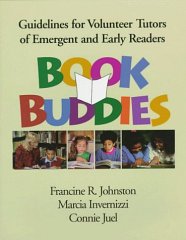 |
Book Buddies: Guidelines for Volunteer Tutors of Emergent and Early
Readers
Author: Johnston, Francine R. Invernizzi, Marcia A.
Juel, Connie Juel, Connie Juel, Connie
ISBN:
1-57230-347-6
LCCN: 98002639
Dewey: 371.14/124
21
Number:
|
Category:
English language: specific skills
User Rating: 5.0
Stars
Pages: 176
Paperback The Guilford Press
From School Library Journal Developed in response to the literacy research
that led to the federal initiative known as the America Reads Challenge, this
volume presents just about everything anyone needs to begin a reading tutorial
program. Originated in Charlottesville, VA, Book Buddies was "the first
large-scale model" to mobilize volunteers as part of a collaborative effort
using public school, university, and community expertise, and is intended to be
replicated by other school-based programs. A strong rationale for the use of
volunteers, detailed duties for a volunteer coordinator, and specific training
to be used with volunteers are included. Assessment tools and organizational
tips for tutors together with reproducible materials to use with students are
also provided. The approach is reasonable, suggesting that, in addition to
phonics practice, tutors use both series (those designed with limited vocabulary
for beginning readers) and other trade books. The fairly broad list of titles
includes reading levels (according to "reading recovery" teachers). This very
practical guide will find its audience among those who are working with emergent
readers in any situation.-Maria B. Salvadore, District of Columbia Public
Library Copyright 1998 Cahners Business Information, Inc. Review
"Based on sound principles of reading instruction and learning, Book
Buddies helps even non-experts tutor children well. The manual is easy to read
and systematically laid out. Especially valuable is the lesson plan component,
which ensures individualized instruction that is tailored to each student's
particular needs. This book will be a great asset to volunteer tutoring
programs." --Barbara A. Wasik, PhD, Johns Hopkins University "This guide gives
tutors and their supervisors the tools and blueprints for a successful tutoring
program. The authors provide a high level of detail on a host of topics related
to activities, assessments, and lesson plans, enabling tutors to successfully
guide children's growth from emergent to early reading. More than simply a set
of good ideas, this book is derived from a program with proven results."
--Elfrieda H. Hiebert, PhD, University of Michigan
Big Interactive Literacy Builders
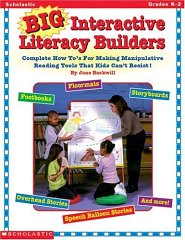 |
Big Interactive Literacy Builders
Author: Baskwill,
Jane
ISBN: 0-590-12877-9
LCCN:
Dewey:
Number:
|
Category:
Literacy
User Rating: 4.5 Stars
Pages: 32
Paperback Scholastic Professional Books
Book Description Complete How To's for Making Manipulative Reading Tools That
Kids Can't Resist Boost children's understanding of story structures with these
adorable, moveable footbooks, jumbo storyboards, wallmats, puppets, and other
tools that allow kids to play with print. Includes activities, favorite books,
chants and rhymes, and step-by-step instructions. About the Author Jane
Baskwill, principal at Kingston and District school, in Nova Scotia, Canada, is
the author of many professional books including Every Child Can Read, by
Scholastic Teaching Resources. She is the former President of the Nova Scotia
Reading Association and has served as Nova Scotia's Provincial Coordinator for
the International Reading Association. Jane is a six-time recopient of the
Educator's Quality Award from the Nova Scotia Teachers Union.
Big Brother and the National Reading Curriculum: How Ideology Trumped
Evidence
 |
Big Brother and the National Reading Curriculum: How Ideology
Trumped Evidence
Author: Allington, Richard L.
ISBN: 0-325-00513-3
LCCN: 2002009620
Dewey:
372.4/0973 21
Number:
|
Category: Central government policies
User Rating:
4.0 Stars
Pages: 312
Paperback Heinemann
Product Description New legislation will transform American public education.
Basic to the No Child Left Behind Act and the Put Reading First program is a new
and substantial federal intrusion into local curriculum control and teacher
autonomy. This intrusion is masked in the legislative mandate for
"evidence-based", or "scientific", reading instruction. Beyond the distortions
of the findings of the National Reading Panel Report that undergird the new
federal initiatives, there are other federal mandates, past and current, that
have also impeded improving reading instruction - and worse, the public
education system - through privatization, teacher disempowerment, and a systemic
business model. In this timely and important book, nationally-recognized reading
researcher Richard Allington tracks and questions the 30-year campaign that has
focused on testing, accountability, and federalization of education. He and
other educators, including Jim Cunningham, Michael Pressley, Elaine Garan, and
Patrick Shannon, have contributed articles that provide an overview of past and
recent federal education policies, including the NRP Report and associated
legislation and policy making, with analyses of the premises of the new national
reading plan. By showing how these premises are manufactured - that is, not
reliably supported by the research - they explain why this plan is an
unwarranted federal encroachment into local educational decision making. About
the Author Richard Allington is the Irving and Rose Fien Professor of Education
at the University of Florida. He is a past president of the National Reading
Conference, a member of the Reading Hall of Fame, and recipient of numerous
awards for his contributions to understanding reading difficulties. He is the
author/coauthor of several books, including most recently What Really Matters
for Struggling Readers: Designing Research-based Programs (Allyn &
Bacon/Longman).
Beyond Leveled Books: Supporting Transitional Readers in Grades
2-5
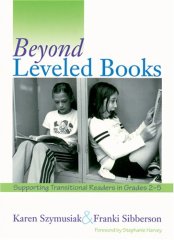 |
Beyond Leveled Books: Supporting Transitional Readers in Grades
2-5
Author: Szymusiak, Karen Sibberson, Franki
ISBN: 1-57110-330-9
LCCN: 00066136
Dewey:
372.4 21
Number:
|
Category: English language: reading skills
User Rating:
5.0 Stars
Pages: 128
Paperback Stenhouse Publishers
From the Publisher Leveled books are now recognized as an essential tool in
helping beginning readers learn to read. But once students have mastered many
basic decoding and comprehension strategies, they move into a period of
transition as readers. Transitional readers, with their diverse needs, have
always challenged and delighted teachers in the upper-elementary grades. These
readers have mastered many skills but are not yet able to choose books and
sustain reading independently in a wide variety of genres. This book takes a
close look at the way classroom routines, small-group instruction, mini-lessons,
and conversations can help students move toward independence. Text levels are an
effective tool for helping teachers match books with readers, but transitional
readers can also benefit from the additional perspective that enables teachers
to recognize the supports that texts have to offer. Beyond Leveled Books asks
teachers to explore beyond levels and to look closely at the "supports" in the
books they are reading with their students. These text supports include the way
chapters are organized, text layout, dialogue, and more. Series books, chapter
books, and picture books will take on new roles in upper-elementary reading
instruction. Organized in charts and bibliographies, Beyond Leveled Books
includes many examples of text supports from books commonly used by grades 2.
This book provides teachers with: examples of classroom instruction for
transitional readers; sample mini-lessons; strategies for grouping students for
small-group instruction; assessment techniques; samples of student work;
resources for working withparents; lists of suggested books for instruction.
Beyond Leveled Books invites teachers to examine the characteristics and needs
of transitional readers and provides instructional tools that will help students
become strategic, independent readers. Synopsis Leveled books are now recognized
as an essential tool in helping beginning readers learn to read. But once
students have mastered many basic decoding and comprehension strategies, they
move into a period of transition as readers. Transitional readers, with their
diverse needs, have always challenged and delighted teachers in the
upper-elementary grades. These readers have mastered many skills but are not yet
able to choose books and sustain reading independently in a wide variety of
genres. This book takes a close look at the way classroom routines, small-group
instruction, mini-lessons, and conversations can help students move toward
independence. Text levels are an effective tool for helping teachers match books
with readers, but transitional readers can also benefit from the additional
perspective that enables teachers to recognize the supports that texts have to
offer. Beyond Leveled Books asks teachers to explore beyond levels and to look
closely at the "supports" in the books they are reading with their students.
These text supports include the way chapters are organized, text layout,
dialogue, and more. Series books, chapter books, and picture books will take on
new roles in upper-elementary reading instruction. Organized in charts and
bibliographies, Beyond Leveled Books includes many examples of text supports
from books commonly used by grades 2. This book provides teachers with: examples
of classroom instruction for transitional readers; sample mini-lessons;
strategies for grouping students for small-group instruction; assessment
techniques; samples of student work; resources for working withparents; lists of
suggested books for instruction. Beyond Leveled Books invites teachers to
examine the characteristics and needs of transitional readers and provides
instructional tools that will help students become strategic, independent
readers.
Best-Ever Vocabulary & Word Study Games
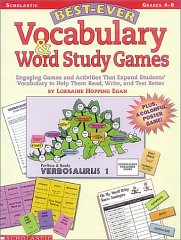 |
Best-Ever Vocabulary & Word Study Games
Author:
Egan, Lorraine Hopping Hopping, Lorraine Jean
ISBN:
0-439-13844-2
LCCN:
Dewey:
Number:
|
Category: Teaching
Methods & Materials - Language Arts
User Rating: 5.0
Stars
Pages: 64
Paperback Scholastic Professional Books
Book Description Engaging Games and Activities That Expand Students¹
Vocabulary to Help Them Read, Write, and Test Better Boost word power and test
scores! Analyze word parts in the Verbosaurus game, review vocabulary words in
Oh My Word Relay Races, explore synonyms in Synonym Tag, and more! About the
Author Lorraine Hopping Egan is a Michigan-based writer who writes for teachers
and for children.
Basic Reading Inventory: Pre-Primer Through Grade
Twelve
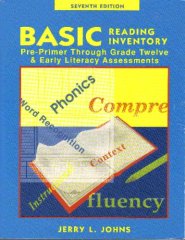 |
Basic Reading Inventory: Pre-Primer Through Grade
Twelve
Author: Johns, Jerry L.
ISBN:
0-7872-1908-8
LCCN:
Dewey:
Number:
|
Category:
General
User Rating: 5.0 Stars
Pages: 448
Paperback Kendall/Hunt Publishing Company
Balanced Literacy Instruction: A Teachers Resource Book
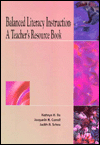 |
Balanced Literacy Instruction: A Teachers Resource
Book
Author: Au, Kathryn H. Scheu, Judith A. Carroll,
Jacquelin H.
ISBN: 0-926842-66-8
LCCN:
Dewey:
Number:
|
Category: General
User Rating: 5.0 Stars
Pages:
367
Paperback Christopher-Gordon Publishers
Awesome Hands-On Activites for Teaching Literary
Elements
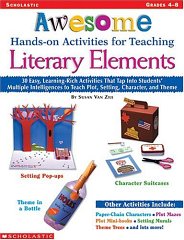 |
Awesome Hands-On Activites for Teaching Literary
Elements
Author: Zile, Susan Van
ISBN:
0-439-16355-2
LCCN:
Dewey:
Number:
|
Category:
Education
User Rating: 4.5 Stars
Pages: 80
Paperback Scholastic
Book Description 30 Easy, Learning-Rich Activities That Tap Into Students¹
Multiple Intelligences to Teach Plot, Setting, Character, and Theme Learn By
Doing! Setting Pop-ups, Paper-Chain Characters, Plot Mini-Books, and more to
help students "learn by doing." Includes reproducible student direction sheets
and rubrics. About the Author Susan Van Zile was Pennsylvania¹s Teacher of the
Year in 1999. She has more than 15 years of teaching experience.
Assessing Reading: Multiple Measures for Kindergarten Through Eighth
Grade
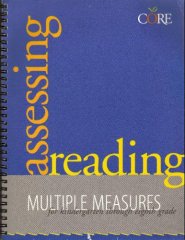 |
Assessing Reading: Multiple Measures for Kindergarten Through
Eighth Grade
Author: No Author Nathan, Ruth Diamond, Linda
Diamond, Linda Nathan, Ruth
ISBN: 1-57128-120-7
LCCN:
99187839
Dewey:
Number:
|
Category: Reading
Skills
User Rating: 4.5 Stars
Pages: 150
Spiral-bound Academic Therapy Pubns
Includes bibliographical references.
Assessing Readers: Qualitative Diagnosis and
Instruction
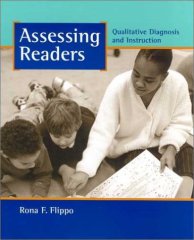 |
Assessing Readers: Qualitative Diagnosis and
Instruction
Author: Flippo, Rona F.
ISBN:
0-325-00373-4
LCCN: 2002032875
Dewey: 372.41
21
Number:
|
Category:
Primary / junior schools
User Rating: 5.0 Stars
Pages:
432
Paperback Heinemann
Product Description Rona Flippo's Reading Assessment and Instruction received
glowing reviews for its unabashed belief in the capabilities of knowledgeable
teachers to make the correct literacy decisions for the students they teach.
This revision continues to be unique among reading diagnosis books, bridging the
gap between narrative/observation-driven assessment and the more traditional
quantitative analysis that typically governs the work of reading specialists.
And once again it supports individual classroom teachers' knowledge, beliefs,
decisions, and roles, while incorporating the various philosophies in the field
of reading and literacy education. Assessing Readers contains specific
assessment, instruction, and organizational ideas and strategies, plus these
distinctive features: an emphasis on assessment of students' strategies,
strengths, interests, motivations, fluency, schemata, and metacognitive
awareness lots of sample assessments found throughout the book attention to the
individualization of instruction so that special learners and students from all
cultural and sociocultural backgrounds have opportunities to learn chapters
devoted to such topics as understanding standardized tests and scores; assessing
affective influences, linguistic strategies, comprehension and cognitive
strategies; practical applications from miscue analysis; use of portfolios and
rubrics; organizing the classroom; grouping to facilitate ongoing assessment and
instruction; and explicit instruction with sample lessons pedagogical aids that
make the book easy to understand and practical to use contextual definitions and
a glossary of terms chapter-opening focus and goal statements "consider and
react" opportunities throughout each chapter end-of-chapter questions for
reflection and response an appendix of portfolio and rubric assessment forms and
ideas. A handy reference and resource, Assessing Readers above all empowers
teachers, encouraging them to think about the value of their assessment and
instruction choices and supporting them with tools to help them achieve their
goals. About the Author Rona Flippo has taught early childhood and elementary
classrooms, as well as upper levels, and is currently a full professor at the
University of Massachusetts Boston, Graduate College of Education. Her
publications include over ninety articles in leading reading and education
journals and numerous books, including the Heinemann titles What Do the Experts
Say? (1999), Assessing Readers (2003), Texts and Tests (2004), and Personal
Reading (2005). Rona is well known for her "Expert Study," and has been featured
on educational television programs dealing with assessment, instruction,
testing, studying, and literacy issues. She is active in professional literacy
organizations and currently chairs IRA's Committee on Intellectual Freedom.
Alternative Assessment Techniques for Reading and
Writing
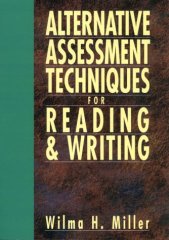 |
Alternative Assessment Techniques for Reading and
Writing
Author: Miller, Wilma H. Education, Center for
Applied Research In
ISBN: 0-87628-141-2
LCCN:
95000826
Dewey: 372.6/044 20
Number:
|
Category: Language &
Literature
User Rating: 5.0 Stars
Pages: 476
Spiral-bound Center for Applied Research in Education
Book Description This practical resource helps elementary classroom, remedial
reading, and LD teachers make the best possible informal assessment of a child's
specific reading, writing, and spelling strengths and weaknesses and attitudes
toward reading. Written in easy-to-follow nontechnical language, it provides a
multitude of tested informal assessment strategies and devices, such as "kid
watching," retellings, journals, IRIs, writing surveys, portfolios, think alouds
and more - including over 200 reproducible assessment devices ready for
immediate use! You'll find a detailed description of each informal assessment
techniques along with step-by-step procedures for its use and, wherever
possible, one or more reproducible sample devices. Complete answer keys for each
device are included with the directions. Among the unique topics covered are the
innovative Individual Reading Inventory, San Diego Quick Assessment List, El
Paso Phonics Survey, QAD Chart, Holistic scoring of writing and Reproducible
devices for portfolio assessment. In short, Alternative Assessment Techniques
for Reading and Writing offers a wealth of tested, ready-to-use informal
assessment information and devices that should save the teacher a great deal of
time and energy in making a useful assessment of any student's literacy ability!
About the Author Wilma H. Miller, Ed.D., is currently Professor of Education at
Illinois State University in Normal, where she has taught undergraduate and
graduate students in reading for 25 years. Prior to that she was an elementary
school teacher in Illinois and Arizona. Dr. Miller has published nearly 200
journal articles dealing with various aspects of reading such as The Reading
Teacher, Elementary English and Reading Horizons. She has also authored 17 books
in the field, including, Complete Reading Disabilities Handbook (1997) and
Ready-to-Use Activities for Improving Content Reading Skills (2000), published
by The Center for Applied Research in Education.
All Sorts of Sorts 2
|
All Sorts of Sorts 2
Author: No Author
ISBN: 1-56785-053-7
LCCN:
Dewey:
Number:
|
Category:
User Rating: 5.0 Stars
Pages: 209
Paperback Teaching Resource Center
Product Description Using the sorts in this book, your students will acquire
word pattern knowledge, learn spelling rules, and formulate generalizations
through compare-and-contrast activities. They'll learn to sort groups of words
according to spelling rules, meanings, endings, sound patterns, prefixes,
suffixes, spelling generalizations, syllables, and other shared properties.
All Sorts of Sorts 1
|
All Sorts of Sorts 1
Author: Sheron Brown
ISBN: 1-56785-049-9
LCCN:
Dewey:
Number:
|
Category:
User Rating: Pages: 0
Paperback Teaching Resourch Center
After Early Intervention, Then What?: Teaching Struggling Readers in Grades
3 and Beyond
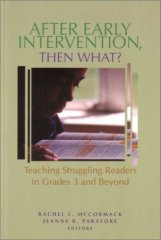 |
After Early Intervention, Then What?: Teaching Struggling Readers
in Grades 3 and Beyond
Author: McCormack, Rachel L. (Editor)
Paratore, Jeanne R. (Editor) Paratore, Jeanne R. Johnston, Peter H.
ISBN: 0-87207-009-3
LCCN: 2003004887
Dewey:
372.43 21
Number:
|
Category: English language: reading skills
User Rating:
3.0 Stars
Pages: 264
Paperback International Reading Association
Book Description Even with effective early intervention, many students
continue to need expert, intensive, and focused reading instruction well beyond
the primary-grade years. Now, intermediate and middle school educators have a
resource to help them develop instructional strategies for these struggling
students. The contributors to this volume draw from research and classroom
practice as they share strategies that work for children who struggle to read in
grades 3-8. The chapters address the needs of children in a range of
instructional settings such as general, special, and bilingual classrooms and
learning contexts such as classroom, small group, individual, and tutorial.
You'll come away with a solid understanding of the current state of knowledge on
struggling readers and the multiple pathways you can take to help them succeed.
©2003 | 264 pp | ISBN: 0-87207-009-3 | 009-553 | Elementary, Intermediate,
Middle About the Author Rachel L. McCormack is Assistant Professor of Education
at Roger Williams University, Bristol, Rhode Island, USA. Jeanne R. Paratore is
Associate Professor of Education at Boston University, Boston, Massachusetts,
USA.
Action Strategies for Deepening Comprehension: Role Plays, Text Structure
Tableaux, Talking Statues, and Other Enrichment Techniques That Engage Students
with Text
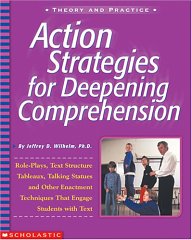 |
Action Strategies for Deepening Comprehension: Role Plays, Text
Structure Tableaux, Talking Statues, and Other Enrichment Techniques That
Engage Students with Text
Author: Wilhelm, Jeffrey D.
ISBN: 0-439-21857-8
LCCN:
Dewey:
Number:
|
Category:
Education
User Rating: 5.0 Stars
Pages: 192
Paperback Teaching Resources
Book Description Role Plays, Text Structure Tableaux, Talking Statues, and
Other Enactment Techniques That Engage Students with Text Enliven Reading!
Before reading, hand out lines of a poem and have students try to build an idea
of what the poem will be about?invite two students to play good angel/bad angel
for a book character?have students perform a vocabulary statue depicting the
meaning of terms such as global warming or deforestation. This book has many
motivating ideas like this that energize students before, during, and after
reading. These strategies can be done Individually, or through pair work or
groups. Great for deepening reading strategies such as activating prior
knowledge, inferring, visualizing, making connections, and more. About the
Author Jeff Wilhelm is the author of Improving Comprehension with Think Aloud
Strategies (Scholastic) You Gotta BE the Book (Teachers College Press) and
several other books. He has taught middle school and high school and currently
teaches in the Professional Development Network at the University of Maine
Writing Project. He regularly presents at national and international
conferences. This is the second book in his Action Strategies for Readers series
for Scholastic.
7 Keys to Comprehension: How to Help Your Kids Read It and Get
It!
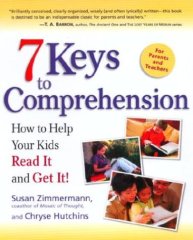 |
7 Keys to Comprehension: How to Help Your Kids Read It and Get
It!
Author: Zimmermann, Susan Hutchins, Chryse Hutchins,
Chryse
ISBN: 0-7615-1549-6
LCCN:
2003006082
Dewey: 372.47 21
Number:
|
Category: Family &
Relationships
User Rating: 4.5 Stars
Pages: 224
Paperback Three Rivers Press
Product Description It's simple: If children don't understand what they read,
they will never embrace reading. And that limits what they can learn while in
school. This fact frightens parents, worries teachers, and ultimately hurts
children. 7 Keys to Comprehension is the result of cutting-edge research. It
gives parents and teachers-those who aren't already using this valuable
program-practical, thoughtful advice about the seven simple thinking strategies
that proficient readers use: • Connecting reading to their background knowledge
• Creating sensory images • Asking questions • Drawing inferences • Determining
what's important • Synthesizing ideas • Solving problems Easily understood,
easily applied, and proven successful, this essential educational tool helps
parents and teachers to turn reading into a fun and rewarding adventure. Inside
Flap Copy It's simple: If children don't understand what they read, they will
never embrace reading. And that limits what they can learn while in school. This
fact frightens parents, worries teachers, and ultimately hurts children. 7 Keys
to Comprehension is the result of cutting-edge research. It gives parents and
teachers?those who aren't already using this valuable program?practical,
thoughtful advice about the seven simple thinking strategies that proficient
readers use: ? Connecting reading to their background knowledge ? Creating
sensory images ? Asking questions ? Drawing inferences ? Determining what's
important ? Synthesizing ideas ? Solving problems Easily understood, easily
applied, and proven successful, this essential educational tool helps parents
and teachers to turn reading into a fun and rewarding adventure.
50 Reproducible Strategy Sheets That Build Comprehension During Independent
Reading
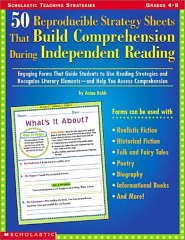 |
50 Reproducible Strategy Sheets That Build Comprehension During
Independent Reading
Author: Robb, Anina
ISBN:
0-439-38784-1
LCCN:
Dewey:
Number:
|
Category:
Education
User Rating: 4.5 Stars
Pages: 96
Paperback Scholastic, Inc.
Book Description Engaging Forms That Guide Students to Use Reading Strategies
and Recognize Literary Elements--and Help You Assess Comprehension Manage
Independent Reading! The 50 interactive strategy sheets in this book help
students use key reading strategies, including setting purposes for reading,
making predictions, inferring information, identifying main ideas, and so much
more. Includes sheets for fiction and nonfiction. About the Author Trained by
Teach For America, Anina Robb has taught middle school students in Houston, New
York City, and Virginia. She currently teaches sixth grade reading and writing
workshop at Powhatan School in Boyce, Virginia.
50 Graphic Organizers for Reading, Writing & More
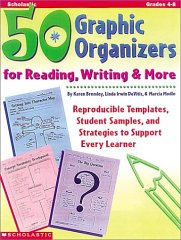 |
50 Graphic Organizers for Reading, Writing &
More
Author: Irwin-DeVitis, Linda Bromley, Karen Modlo,
Marcia
ISBN: 0-590-00484-0
LCCN:
Dewey:
Number:
|
Category:
Education
User Rating: 5.0 Stars
Pages: 112
Paperback Teaching Resources
Book Description Reproducible Templates, Student Samples, and Strategies to
Support Every Learner This valuable resource includes 50 ready-to-go templates,
student samples, and step-by-step directions. The organizers are perfect for
notetaking, planning, presentation, and review. You'll find organizers for
reading, writing, math, social studies, and science. About the Author This is
the second book on graphic organizers by these three authors for Scholastic
Teaching Resources. All three authors have worked as reading specialists in
elementary schools, and now teach at the School of Education at Binghamton
University.
40 Sensational Sight Word Games: Grades K-2
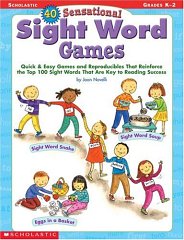 |
40 Sensational Sight Word Games: Grades K-2
Author:
Novelli, Joan Hale, James Graham
ISBN:
0-439-30357-5
LCCN:
Dewey:
Number:
|
Category:
Education
User Rating: 4.5 Stars
Pages: 64
Paperback Scholastic Professional Books
Book Description Quick & Easy Games and Reproducibles That Reinforce the
Top 100 Sight Words That Are Key to Reading Success Teaches the Top 100 Sight
Words! Help kids learn sight words and become better readers with easy games
like Sight Word Soup, Magic Wand Words, Simon Says Sight Words!, Word
Construction Site, Sing a Song of Sight Words, and 35 more! From board games to
floor games, this collection makes learning to read fun for every child in your
class. Includes reproducible sight-word cards, games, wheels, and other
easy-to-make manipulatives. About the Author Joan Novelli is a former classroom
teacher and reading specialist. She writes frequently for parents, teachers, and
children. Her work appears regularly in Sesame Street Parents, Parent and Child,
Instructor, and other magazines. Joan also edits many titles for Scholastic
Professional Books and is the author of Using Caldecotts Across the Curriculum,
Fresh & Fun: Valentine's Day, Phonics Make-and-Take Manipulatives, and
co-author of the three-book series Interactive Bullentin Boards: Math, Language
Arts, and September to June all published by Scholastic Professional Books. Joan
lives in South Burlington, Vermont.
40 Graphic Organizers That Build Comprehension During Independent
Reading
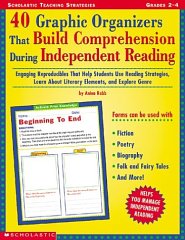 |
40 Graphic Organizers That Build Comprehension During Independent
Reading
Author: Robb, Anina
ISBN:
0-439-38782-5
LCCN:
Dewey:
Number:
|
Category:
Education
User Rating: 2.0 Stars
Pages: 80
Paperback Teaching Resources
Description: These 40 graphic organizers provide a wonderful way for teachers
to ensure students get the most out of each book during independent reading. The
graphic organizers help students use key reading strategies, including making
predictions, summarizing, inferring information, identifying main ideas, and so
much more. With organizers for fiction and nonfiction genres, this is just the
resource teachers need to help students become strategic, independent readers.
12 Take-Home Thematic Backpacks: Easy-To-Make, Cross-Curricular,
Reproducible
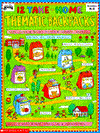 |
12 Take-Home Thematic Backpacks: Easy-To-Make, Cross-Curricular,
Reproducible
Author: Quinn, Mary C. Fisher, Rachel Garriel,
Barbara S. Novelli, Joan (Editor)
ISBN:
0-590-49649-2
LCCN:
Dewey:
Number:
|
Category: Teaching
Methods & Materials - Workbooks
User Rating: 4.0
Stars
Pages: 144
Paperback Scholastic Trade
"You Gotta Be the Book": Teaching Engaged and Reflective Reading With
Adolescents (Language and Literacy Series
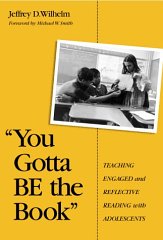 |
"You Gotta Be the Book": Teaching Engaged and Reflective Reading
With Adolescents (Language and Literacy Series
Author:
Wilhelm, Jeffrey D. Smith, Michael W. Smith, Michael W.
ISBN: 0-8077-3566-3
LCCN: 96028696
Dewey:
428.4/071/2 20
Number:
|
Category: Educational psychology
User Rating: 5.0
Stars
Pages: 208
Paperback Teachers College Press
From the Publisher Over a decade ago, Jeffrey Wilhelm's groundbreaking book
showed educators how to think of reading as a personally meaningful,
pleasurable, and productive pursuit. In the 13 years since its publication, the
author has experimented with and further developed all of the techniques he
first explored in "You Gotta BE the Book," including visual techniques, drama
and action strategies, think-aloud protocols, and symbolic story
representation/reading manipulatives. In this expanded edition, Wilhelm adds a
new commentary to each chapter in which he reflects on the research and insights
he introduced in his now-classic text. Through textured case studies of engaged
and reluctant readers, the Second Edition of "You Gotta BE the Book" once again
addresses enduring issues, such as: What do highly engaged adolescent readers DO
as they read? What is it about traditional schooling and reading instruction
that deters engaged reading and serves to disenfranchise young readers? What
types of interventions can be used in the classroom to help all students,
especially reluctant ones, become successful readers? Synopsis Over a decade
ago, Jeffrey Wilhelm's groundbreaking book showed educators how to think of
reading as a personally meaningful, pleasurable, and productive pursuit. In the
13 years since its publication, the author has experimented with and further
developed all of the techniques he first explored in "You Gotta BE the Book,"
including visual techniques, drama and action strategies, think-aloud protocols,
and symbolic story representation/reading manipulatives. In this expanded
edition, Wilhelm adds a new commentary to each chapter in which he reflects on
the research and insights he introduced in his now-classic text. Through
textured case studies of engaged and reluctant readers, the Second Edition of
"You Gotta BE the Book" once again addresses enduring issues, such as: What do
highly engaged adolescent readers DO as they read? What is it about traditional
schooling and reading instruction that deters engaged reading and serves to
disenfranchise young readers? What types of interventions can be used in the
classroom to help all students, especially reluctant ones, become successful
readers?